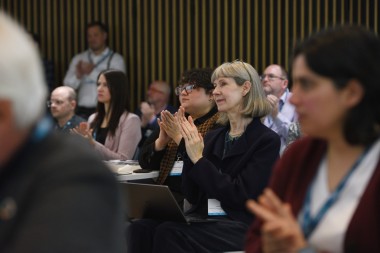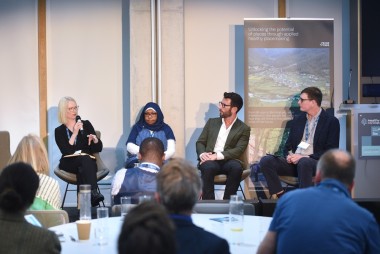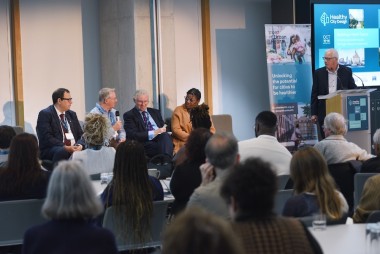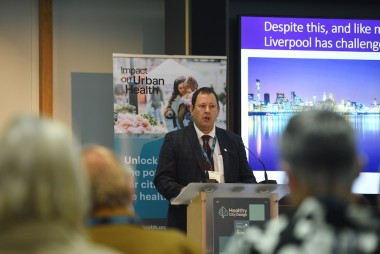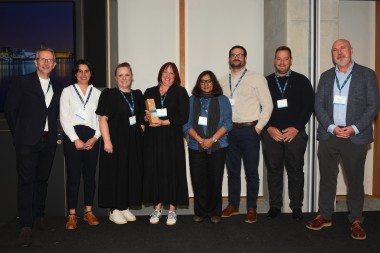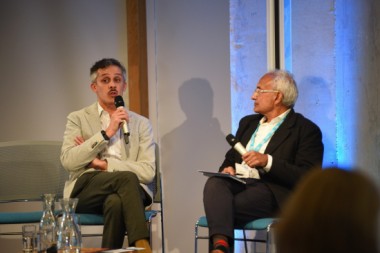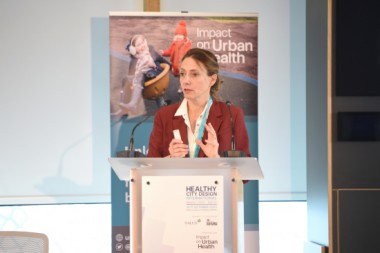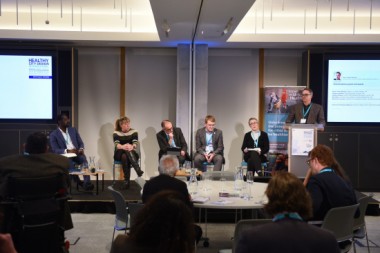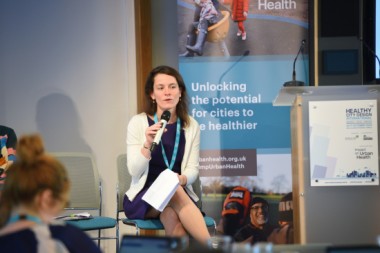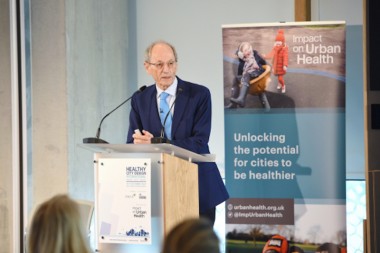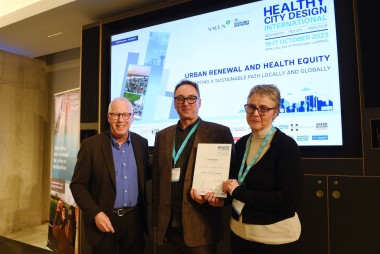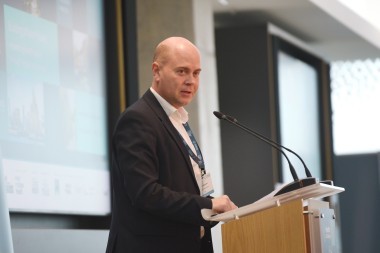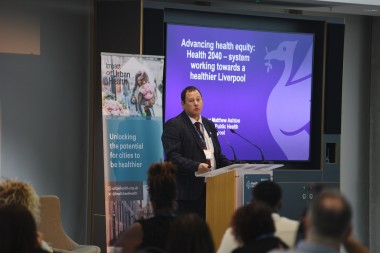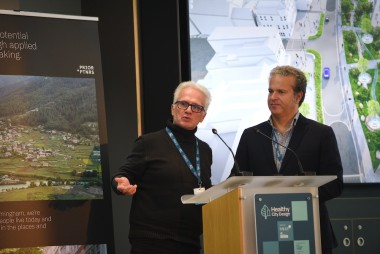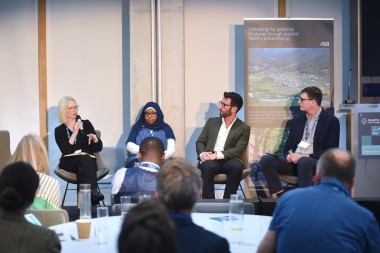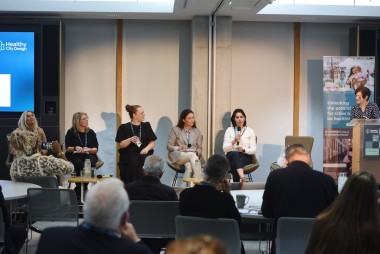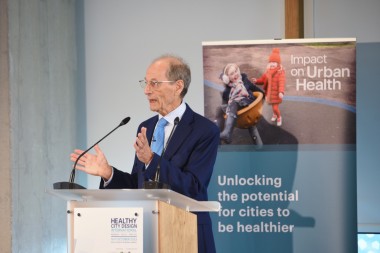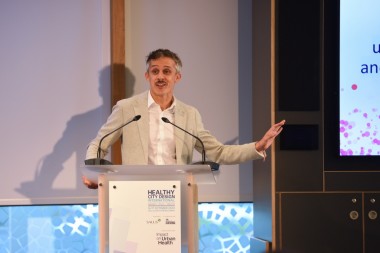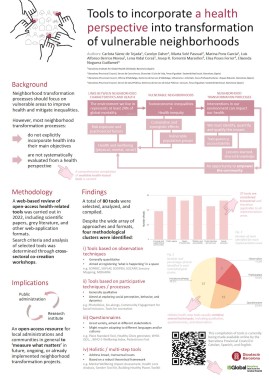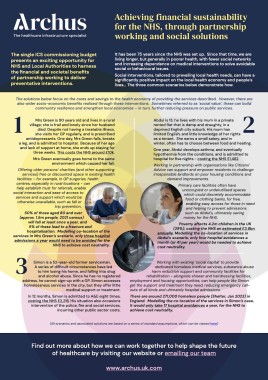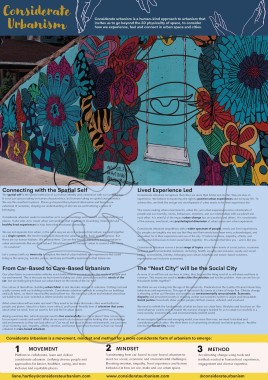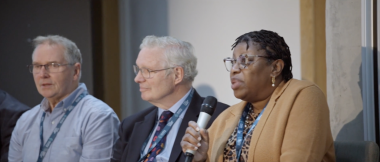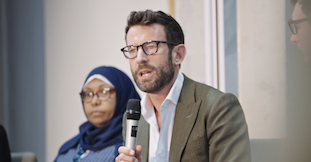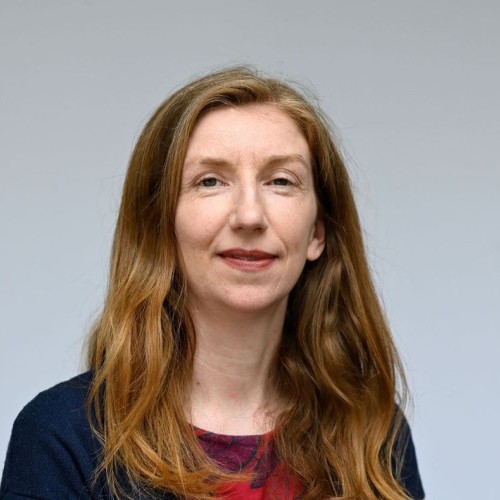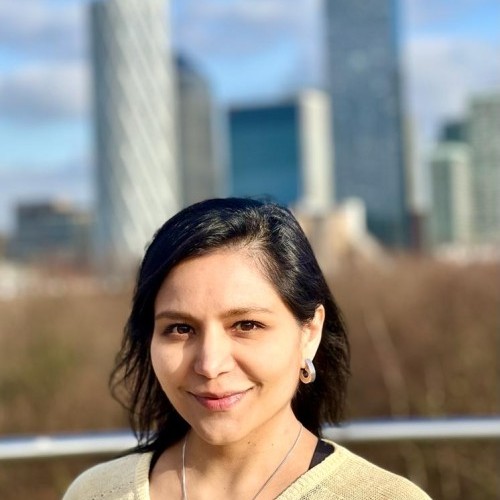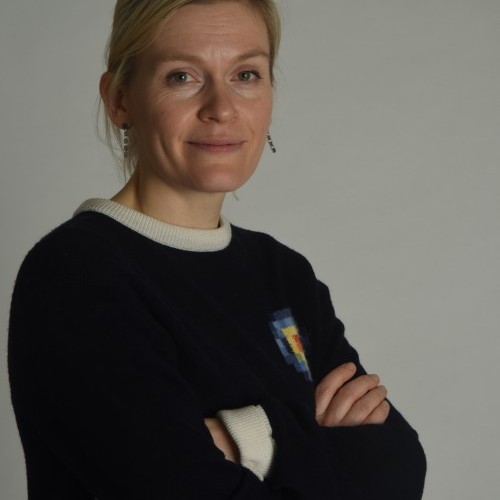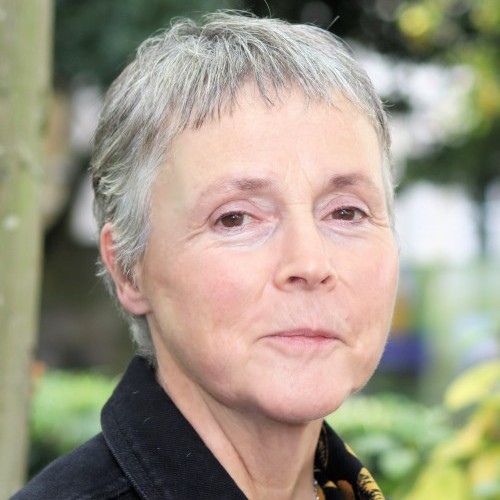HCD Content
News and articles
Video talks
Video+Posters
Healthy City Design Congress Voices
- Day 1Tuesday 15 October
- Day 2Wednesday 16 October
-
08.00 - Registration Opens08.45 - 10.15Session 1- Opening plenary: Advancing health equity through impact investment

Prof Jeremy Myerson
Co-founder, Healthy City Design; director, WORKTECH Academy; professor emeritus, Royal College of Art, UKJeremy Myerson has been academic, author and activist in design for more than 40 years. He co-founded the Helen Hamlyn Centre for Design in 1999, and was its director until 2015. Last year, he received emeritus professor status at the RCA, and he continues to direct his own venture, the WORKTECH Academy, which provides a forum for academics and practitioners to share new ideas on the future of work and workplace. He is the author of more than 20 books on a wide range of subjects in art, design and architecture, and he has curated many national design exhibitions. He has been at the helm of the Healthy City Design Programme Committee since the Congress’ inception in 2017.08.45Opening remarks09.00Welcome address
Councillor Liam Robinson
Leader of the Council, Liverpool City Council, UKCLLR LIAM ROBINSON is Leader of Liverpool City Council and has been a Councillor since 2008, representing the Kensington & Fairfield ward. He became Leader in May 2023, having previously held the position of Cabinet Member for Finance, responsible for setting the Council’s budget. Prior to that, Cllr Robinson was Chair of Merseytravel, and subsequently Portfolio Holder for Transport for the Liverpool City Region. During his time at Merseytravel and the Combined Authority, making public transport more affordable, particularly for young people, was a key focus. He championed the introduction of reduced-price bus fares for young people up to their 19th birthday, which led to a 168% growth in journeys by young people. He also led the procurement of a new fleet of publicly owned trains for the Merseyrail network, including pioneering disability access features. He previously worked in public transport, holding management positions in the rail, bus and coach industries, including responsibility for three of Britain’s largest railway stations: Liverpool Lime Street, London Liverpool Street and Sheffield. His priority is to lead an administration that puts Liverpool first, and is committed to making the city greener, using sustainable growth to create jobs, supporting citizens through the cost-of-living crisis and embracing innovation to improve Council services. Cllr Robinson is married with two young children and enjoys cycling and football in his free time.09.05Keynote plenary: Advancing health equity: Health 2040 – system working towards a healthier Liverpool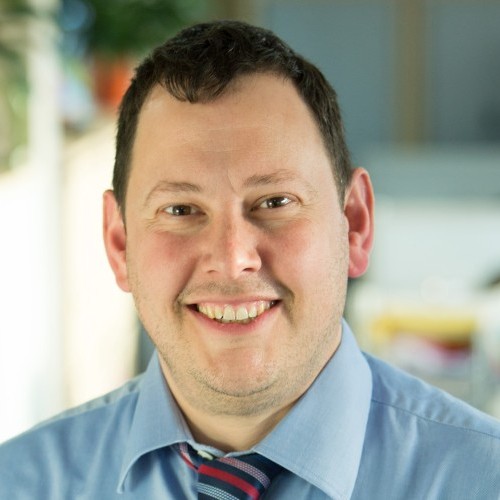
Matthew Ashton MPH, MBA
Director of public health, Liverpool City Council, UKProf Ashton was appointed director of public health for Liverpool City Council in April 2020 in a joint appointment with the University of Liverpool, where he is an honorary professor in the Department of Public Health and Policy. He leads a team of 30 people in the local authority, covering a range of public health activities, including the commissioning of public health services, health protection, health improvement, healthcare public health, embedding health in all policies approaches, and addressing the wider determinants of health. Matt led on the response to the Covid-19 pandemic for Liverpool, and his efforts have been recognised nationally through the award of the Faculty of Public Health’s presidential medal in 2021, and also the Chief Medical Officers' National Impact Award in 2022. Matt is passionate about bringing together the best people and partnerships in the region to improve health and wellbeing and reduce inequalities in local communities.Keynote plenary: Advancing health equity: Health 2040 – system working towards a healthier Liverpool
Abstract Copy
Following the publication of his 'State of Health in the City: Liverpool 2040' report in January 2024, Professor Matthew Ashton will highlight the health challenges faced by Liverpool and many cities across the UK, as well as the collective actions required to overcome them to ensure Liverpool is a healthy city of the future. This will include a focus on Liverpool’s approach to ‘Health in all Policies’, ‘WHO Healthy Cities’, inclusive economic growth, and large-scale regeneration, and how Liverpool as a city is committed to make a difference for all residents in the city.09.30Panel discussion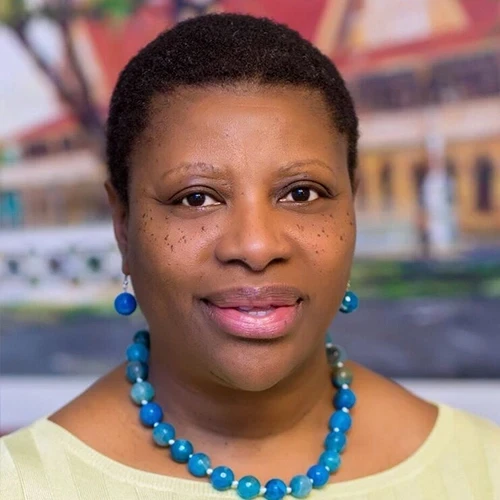
Yonette F. Thomas PhD
Founder and president, UrbanHealth360, USADr. Yonette Felicity Thomas is the founder and president of UrbanHealth360, an organization of multidisciplinary thinkers centered on a people-oriented, community-focused approach to urban health. Dr. Thomas is a globally acknowledged thought leader, urban health champion, and an advocate for valuing the health of women and girls as an economic imperative. A social epidemiologist/medical sociologist by training, she has served as the chief of Epidemiology at the National Institute on Drug Abuse in the National Institutes of Health, held academic positions at University of Miami Miller School of Medicine and Howard University, and as a vice president for research. She founded Borjoner International and Strategic Transitions to influence the progress, health, and wellbeing of individuals and communities across the world. As a founding board member of Women’s Economic Imperative (WEI), she leads the organization’s focus on the health of women and girls as an economic value. Her work as global advisor for Evidence for Sustainable Human Development Systems in Africa (EVIHDAF) and the Centre for Urban Health and Development within the Asian Institute of Poverty Alleviation (CUHD-AIPA) extends her focus on the global south and the realization of the Sustainable Development Goals in this last decade. She is the Associate Editor for Women and Girls for Cities & Health. She is a founding board member of the International Society for Urban Health (ISUH) and recently led the organization into sustainability by serving as the inaugural executive director (as a board member) and has served as a science advisor for urban health to the New York Academy of Medicine. She is a founding board member and former vice president of the Interdisciplinary Association for Population Health Science (IAPHS) and served on the Steering Committee of the National Hispanic Science Network on Drug Abuse for more than a decade. She served on the National Academy of Sciences Committee on Revisions to the Common Rule for the Protection of Human Subjects in Research in the Behavioral and Social Sciences. Her primary research and publications have focused on the social determinants of health, health disparities, the health of women and girls as an economic value, the social epidemiology of drug abuse and HIV/AIDS and the link with geography, including edited volumes: Geography and Drug Addiction, Crime, HIV, and Health: intersections of Criminal Justice and Public Health Concerns.
Lord Nigel Crisp
Independent crossbench member, House of Lords, UKLord Nigel Crisp is an independent crossbench member of the House of Lords where he co-chairs the All-Party Parliamentary Group on Global Health. He also co-chairs Nursing Now, the global campaign on nursing. He was previously Chief Executive of the English NHS and Permanent Secretary of the UK Department of Health – the largest health organisation in the world with 1.3 million employees – where he led major reforms between 2000 and 2006. Lord Crisp is a Senior Fellow at the Institute for Healthcare Improvement, an Honorary Professor at the London School of Hygiene and Tropical Medicine and a Foreign Associate of the US National Academy of Medicine. He was formerly a Distinguished Visiting Fellow at the Harvard School of Public Health and Regent’s Lecturer at Berkeley. His publications on global health include Turning the world upside down – the search for global health in the 21st Century; Global Health Partnerships; One World Health – an overview of global health after Global Health Partnerships; and, edited with Francis Omaswa, African Health Leaders – making change and claiming the future. He described his time as Chief Executive of the NHS in 24 Hours to Save the NHS – the Chief Executive’s account of reform 2000 – 2006. A Cambridge philosophy graduate, he worked in community development and industry before joining the NHS in 1986. He has worked in mental health as well as acute services and from 1993 to 1997 was Chief Executive of the Oxford Radcliffe Hospital NHS Trust, one of the UK’s leading academic medical centres.
Matthew Ashton MPH, MBA
Director of public health, Liverpool City Council, UKProf Ashton was appointed director of public health for Liverpool City Council in April 2020 in a joint appointment with the University of Liverpool, where he is an honorary professor in the Department of Public Health and Policy. He leads a team of 30 people in the local authority, covering a range of public health activities, including the commissioning of public health services, health protection, health improvement, healthcare public health, embedding health in all policies approaches, and addressing the wider determinants of health. Matt led on the response to the Covid-19 pandemic for Liverpool, and his efforts have been recognised nationally through the award of the Faculty of Public Health’s presidential medal in 2021, and also the Chief Medical Officers' National Impact Award in 2022. Matt is passionate about bringing together the best people and partnerships in the region to improve health and wellbeing and reduce inequalities in local communities.
Gerry Proctor MBE
Chair, Engage Liverpool, UKGerry Proctor MBE was born and brought up in Liverpool went to Durham University and then worked in St Helens, Merseyside from 1977, predominantly with young people. That was followed by a period in South America for 6 years working with poor communities in Ecuador and Bolivia. Returning to Liverpool in 1991 to work in the mixed neighbourhoods of Dovecot and Knotty Ash for 12 years. Since then I have lived and worked in Liverpool's waterfront and city centre connecting with the resident communities whilst also leading a hospitality project in Croxteth, La Salle Hotel School, offering young people a pathway to careers in the visitor economy.10.15 - 10.45Video+Poster Gallery, coffee and networkingSelect a Stream
- Stream 1Advancing health equity
- Stream 2Urban planning, placemaking and public realm
- Stream 3Green, clean and equitable cities
- Stream 4Urban mobility, ageing and accessibility
- Stream 5Workshops
-
10.45 - 12.30Session 2- Policy, practice and investment

Sunand Prasad OBE
Programme director, European Healthcare Design; Principal, Perkins&Will, UKSunand Prasad is a principal at Perkins&Will. While designing across several sectors, he has been consistently engaged in healthcare and sustainability for four decades. At the core of his architectural practice, alongside interdisciplinary collaboration, Sunand holds a passionate belief that expertise and aesthetic judgement are most effective in creating truly successful environments when they are catalysed by the everyday experience of people. Sunand has been active in the wider built environment industry, particularly championing low-carbon, regenerative design, and until recently, as chair of the UK Green Building Council. He was President of the Royal Institute of British Architects (RIBA) from 2007 to 2009, campaigning for action on climate change. He was founding member of the UK Government’s Commission for Architecture and the Built Environment; a London Mayor’s design advocate; a trustee of the Centre for Cities; and Chair of the trustees of Article 25, the humanitarian architecture charity. He currently chairs the Editorial Board of the Journal of Architecture and the External Advisory Board of TRUUD, a major research project on the fundamental links between health and urban development. He has written widely on architecture, sustainability and healthcare design, such as the book 'Changing Hospital Architecture'.10.45Implementing a strategic approach to urban health
Dr Nathalie Roebbel
Unit head – urban health, World Health Organization, SwitzerlandNathalie Röbbel is the Lead for WHO’s work on Urban Health at the WHO, in the Department on Social Determinants of Health. Prior to this she was leading WHOs work on air pollution and housing in the Department for Environment, Climate Change and Health. One of her main areas of work was the development of WHO Housing and Health Guidelines and WHO’s efforts to address slum upgrading through housing policies and other social policies and interventions. Before joining WHO HQ, she worked as a technical officer at the WHO Regional Office for Europe, in Bonn and Copenhagen, where she was responsible for environmental health performance reviews and involved in several urban health related projects. Ms Röbbel holds a Ph.D. from the Rheinische-Friedrich-Wilhelms University in Bonn, Germany.
Jose Siri PhD, MPH
Epidemiologist, global, urban and planetary health specialist, USAOver a career in research and policy, José Siri has developed and applied systems approaches to urban and planetary health, focusing on leveraging science for healthy development, devising simple systems tools to catalyse better decision-making, and improving understanding of complex challenges. His experience, which spans five continents, includes time at the International Institute for Applied Systems Analysis, the United Nations University International Institute for Global Health, and the Wellcome Trust, and extensive engagement with researchers, practitioners, and policymakers. He has published more than 30 peer-reviewed articles and book chapters, along with policy briefs and commentaries in publications ranging from the Wall Street Journal to the Global Sustainable Development Report. He currently consults for the World Bank and the World Health Organization and holds advisory roles with the Inter-American Institute for Global Change Research, Future Earth, CDP, and a variety of urban and planetary health research projects. His work has touched on urban studies, climate and health, sustainable development, systems thinking, transdisciplinarity, epidemiology, ecology, infectious disease, public health, and malaria control.Implementing a strategic approach to urban health
Abstract Copy
To continue improving the health of urban dwellers in the face of growing complexity, deepening resource limitations, and disruptive global trends, decision-makers at all scales will need to adopt a more strategic approach to urban health, taking advantage of the synergies and efficiencies offered by integration and a holistic perspective. Because urban health is a nexus issue, closely interlinked with virtually all elements of sustainable development, such an approach promises to reap a host of co-benefits for other societal goals.
Through its Strategic Guide for Urban Health, the World Health Organization has been developing guidance to support national and city governments in adopting and implementing a strategic approach. A series of policy briefs launched this year reviews four broad thematic areas (generating and working with data; governance and financing; innovation; partnerships and participation) related to the enabling framework or means of implementation for a strategic approach.
Building on this work, this session will present a preliminary implementation protocol, designed to support the translation of guidance on strategic action to a local context. Key elements of the protocol would include: a process of coalition-building and the adoption of a statement of commitment by governing authorities and critical stakeholders; a situational analysis that summarises the local state of play with respect to urban health, including epidemiological, institutional, policy, and fiscal components; a local action plan that specifies preliminary steps to lay the foundation for a local strategic approach; and a needs assessment to identify and address any deficits in local capacities or resources needed to implement the local action plan. An important consideration will be how to leverage and improve existing arrangements for urban health, healthy cities, and other relevant activities.
In this session, the WHO urban health team will solicit feedback on this preliminary protocol and the forthcoming Strategic Guide.11.05Building health equity: The role of development
Jessica Allen
Deputy director, University College London, United KingdomJessica Allen and Michael Marmot have worked together since 2011 to build the IHE and strengthen action on health equity and the social determinants across the UK and around the world. In her role as Deputy Director she has shaped the strategic direction of the Institute and overseen its work and development. She has worked closely with international organisations, national and local governments, businesses and the economic sector, third sector organisations and public health and health care systems. She has published widely on the social determinants of health and led much of the Institute’s work. She leads the IHE’s work with global organisations including the UN, leading the current WHO Special Initiative, UNAIDS, and led the production of WHO regional health equity reports including the Eastern Mediterranean Region Commission on the Social Determinants of Health, Pan American Health Organization (PAHO) Commission on Equity and Health Inequalities in the Americas and the Review of Social Determinants of Health and the Health Divide in the WHO European Region. She was co-author of the 2010 Marmot Review Fair Society, Healthy Lives, the 2020 Marmot Review 10 Years On report and Build Back Fairer: The COVID-19 Marmot review. Jessica has also been involved in national reviews including most recently for Norway, Hong Kong and Taiwan and is also involved with Marmot Places in the UK. She has led many of the Institute’s evidence reviews on a wide range of social determinants of health and health inequality assessments. She is a member of several advisory groups in England and internationally. Prior to her work at IHE she was head of Health and Social Care at IPPR, Research Fellow in Public Health at the Kings Fund, and worked at UNICEF and the London School of Economics. She has published and broadcast widely and holds a doctorate from the University of London.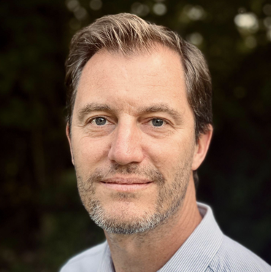
Matthew Morgan
Co-founder, director, Quality of Life Foundation, United KingdomMatthew Morgan is the Director and co-Founder of the Quality of Life Foundation. He is responsible for setting strategy with the Board of Trustees, overseeing the Foundation’s commercial services and delivering lasting impact with the Quality of Life team, itself focused on highlighting the impact of the built environment on people’s lived experience. With over 20 years’ experience in writing and communications, Matthew has previously worked with architects, engineers and developers; in book and magazine publishing; and with charities and start-ups. He is a participant on a number of advisory boards and chairs a multi-stakeholder group that advises on community engagement as part of the UKRI-funded CCQOL (Community Consultation for Quality of Life) project. A published author and mental health advocate, Matthew is particularly interested in how communities are formed and their effects on people’s physical, social and psychological wellbeing, an interest he developed while growing up in an intentional community in Kent.
Clare Delmar
Independent health and planning consultant, United KingdomI trained and practiced as an urban planner in the USA (MIT) before coming to the UK and working in public/private finance for many years, moving into the healthcare space as a funder of PFI hospitals in the NHS. I currently help lead a healthcare business that provides innovative diagnostics and treatments to men with prostate disease. London is a centre of world-class innovation in imaging-led diagnostics and treatments for prostate cancer, and the Focal Therapy Clinic provides access to these innovations so that all men can achieve improved healthcare outcomes. I discuss this in regular blogs & podcasts. My passions for healthcare and planning are at the heart of the “Listen to Locals” campaign, launched in response to the unprecedented scale of new building and development in London and the lack of meaningful engagement with local communities on the impact of this development on their health and wellbeing. I devote each day to using my knowledge & experience in health, planning, digital & comms to improve healthcare and peoples' access to it.Building health equity: The role of development
Abstract Copy
The Marmot Review, 'Fair Society, Healthy Lives', introduced compelling evidence on wide inequalities in health across the UK, and demonstrated how social determinants of health underpinned these inequalities. Ten years later, the Review’s author, Sir Michael Marmot, updated the evidence to show that health inequality had increased over the decade, due to widening inequalities in the social determinants of health. Earlier this year, he reported on the wide and increasing regional differences in life expectancy across England.
There is widespread recognition of rising health inequality and growing support and action among local and regional governments, public services, business and economic sectors and the NHS to address it. A growing number of local and regional governments have worked with the IHE to establish themselves as Marmot Places and developed a programme of action to reduce health inequalities. The IHE works with Marmot places to: assess the extent of inequalities in health and the social determinants of health locally; identify where places can go further to reduce inequalities and where there are gaps in existing actions; evaluate how partners within a place can work together more effectively to achieve greater impact and make the needed changes; strengthen the health equity system in a place; and implement new approaches and interventions to tackle health inequalities and inequalities in the social determinants of health.
Building Health Equity is a programme established by Legal & General, UCL’s IHE and the Quality of Life Foundation to understand how homes and places shape health and bring together built environment industry leaders to develop opportunities to co-operate in ways that improve health equity.
Building on a comprehensive evidence review, stakeholder engagement and convening of industry leaders in a roundtable discussion, the programme is preparing guidance for the industry to better understand how it could be a force for good in reducing health inequalities. The intention is to launch a programme of action to support and encourage the private sector – developers, investors and operators – to expand and develop their role in shaping the built environment around heath equity. The Building Health Equity Compact will commit businesses to addressing health equity through existing tools and frameworks and innovating new approaches.
By October, we will have a meaningful Compact and plans for action to share with attendees.Learning Objectives
- Consolidate and communicate the evidence base on the impact of homes and places on health equity.
- To develop practical approaches to create homes and places that improve health equity.
- To build a platform for leadership on homes, place and health.
11.25Social infrastructure for health and wellbeing
Sophia Schuff
Director of philanthropic partnerships and urban health, Gehl Urban Design Studio, DenmarkSophia Schuff is a passionate advocate for designing cities that prioritize the well-being of both people and the planet. As a Director at Gehl, an urban design practice on a mission to create more equitable, healthy, and sustainable cities, she leads Gehl’s portfolio serving the Philanthropy sector. In this role, she advocates for improving communities’ social, health and wellbeing outcomes through urban transformation. Sophia’s commitment to enhancing the urban experience stems from her background as an anthropologist and deep understanding of the human experience within the built environment. She speaks across various topics including urban design for early childhood development, food systems, regenerative placemaking, and equity in public space. She participated in the UN Global Compact Young SDG Innovators program, and is serving as an expert advisor to the World Early Childhood Development Movement.Social infrastructure for health and wellbeing
Abstract Copy
Traditional urban development models focus on physical infrastructure, design, and amenity placement, which do not always take into consideration the social infrastructures that are needed to build and sustain healthy, and sustainable neighbourhoods.
Gehl has worked with the Robert Wood Johnson Foundation to assemble a group of US and global partners (both academics, community organisations and public-sector officials) to better understand and communicate models for shaping and sustaining social infrastructure. The research has involved both desktop research and three learning exchanges to Belfast, Rio de Janeiro, São Paulo, and Cape Town, looking at more than 30 projects which varied widely in their focus, scale and operating models.
The research focuses on the outcomes that social infrastructure leads to and the places and people that facilitate it and has identified three types of social infrastructure at work:
Havens: Spaces for people to gather and bond around shared identity;
Hangouts: Spaces for people of all backgrounds to linger, to rest, to chill – to just be; and
Hubs: Spaces for people to connect and bridge across different backgrounds.
This paper will consider how networks of social infrastructure can be leveraged as effective platforms for supporting healthy and thriving communities. This involves questions such as:
How can we better understand and analyse the types of social infrastructures needed in cities and specific communities?
Who is needed to effectively operate and sustain the networks of social infrastructure?
How can we continue to build belief in the value and the need for investment in social infrastructure towards greater community health outcomes?
Learning Objectives
- Understand social infrastructure as a network of many nodes with different purposes.
- Demonstrate the need for coordinated efforts across across all areas of leadership, governance, and expertise
- Provide insights on how to effectively design and operate social infrastructure towards desired outcomes
11.45Applying Doughnut Economics thinking into urban regeneration
Chris Brown
Founder, Climatise; Founding director, London Doughnut Economy Coalition CIC, UKChris Brown is a founder director of the London Doughnut Economy Coalition CIC, helping London to play its part in an economy that ‘delivers society’s needs within the planet’s limits. He is also the founder of Climatise, using blended finance to deliver rewilding, retrofit and renewables. Through Climatise he is a director of fuel poverty and renewables community benefit society SE1 Solar and of retrofit business Future Fit Homes. He was the founder of urban regeneration BCorps igloo Regeneration which co-founded ‘the world’s first responsible real estate fund’ (United Nations). He also co-founded the Chrysalis Fund which lends to job creating workspace and green development projects in Liverpool City Region. Until 2023 he chaired Creative Space and Dataloft (now Pricehubble) and helped management and shareholders execute successful exits.Applying Doughnut Economics thinking into urban regeneration
Abstract Copy
Doughnut Economics is a school of modern economic thinking described in Kate Raworth's 2017 book, Doughnut Economics, based on her earlier work from 2012 with Oxfam.
It describes the purpose of economics as 'providing for society's needs within the planet's limits'. It also explains the damage caused by now outdated neo-classical economics, which created multiple existential threats to the planet and to civilisation.
Doughnut Economics is based on the twin concepts of social foundation and planetary boundaries.
The social foundation comprises human needs for: education; income and work; peace and justice; political voice; social equity; gender equality; housing; networks; energy; water; food; and health. These are based on the UN Sustainable Development Goals.
The planetary boundaries are: ocean acidification; chemical pollution; nitrogen and phosphorus loading; freshwater withdrawals; land conversion; biodiversity loss; air pollution; ozone layer depletion; and climate change. These are based on the earth system science work of Rockstrom and Steffen.
Doughnut Economics goes on to describe seven ways to change the neo-classical paradigm:
1. Change the goal from GDP to providing society's needs within the planet's limits;
2. See markets as operating within social and planetary systems;
3. Recognise people as social beings, not greed-driven economic maximisers;
4. Understand economies as complex evolving systems;
5. Make economies that are distributive not wealth-concentrating;
6. Make economies that are regenerative, not wasteful and extractive; and
7. Make economies that are agnostic about growth.
The twin pillars of social need and planetary limits have developed in the practice of urban regeneration in the UK for nearly half a century.
Liverpool was an early urban regeneration test bed. More recently, the University of Liverpool Heseltine Institute for Public Policy, Practice and Place proposed modelling a post-Covid recovery plan for Liverpool on Doughnut Economics.
City governments and citizens' groups around the world are exploring and advocating these concepts.
The leading edge of the urban regeneration industry in the UK is also pursuing these approaches.
Global agreements are gradually nudging political and business leaders towards reshaping markets for the good of society and the planet.
Increasingly, this is influencing investment. Since the igloo Regeneration Fund was created, dubbed the 'world's first responsible real estate fund' (United Nations), place-based investment strategies that encompass planetary and social objectives have become increasingly mainstream. Healthy City Design is central to many of these approaches.
Learning Objectives
- Understanding the basics of Doughnut Economics
- Consider its application to city governance and urban regeneration
- Think about the future of this approach for place-based health policy and investment
12.05Panel discussion12.30 - 14.00Video+Poster Gallery, lunch and networkingLunchtime workshop14.00 - 15.30Session 3- Neighbourhoods as the foundation for a just, green and healthy city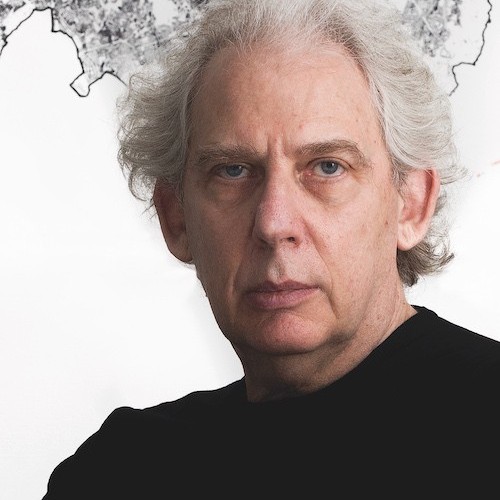
Ricky Burdett
Co-chair, Council on Urban Initiatives, UKRicky Burdett (co-chair) is a professor of urban studies at the London School of Economics and Political Science, and director of LSE Cities. Burdett was formerly the director of the Venice International Architecture Biennale and chief advisor on Architecture and Urbanism for the 2012 London Olympics. He is the author and coeditor of several publications, including ‘Shaping Cities in an Urban Age’ (2018) and ‘The Endless City’ (2007).
Isadora Schappell
Programme manager, Cities, Institute for Innovation and Public Purpose, University College London, UKIsadora leads the Secretariat for the Council on Urban Initiatives, a partnership between UN-Habitat, LSE Cities and IIPP, advocating for the power of cities to promote systemic change to achieve the goal of the green, just, and healthy city focusing on their public value and spatial potential. She has led the research team for several publications including “The Right to Housing: A Mission-Oriented and Human Rights Based Approach”. Through her role, she also collaborates with the London Borough of Camden, exploring how public procurement can support mission-oriented innovation. Previously, at the New York City Mayor’s Office of Criminal Justice, she was the project manager for the land use initiative to close the jails on Rikers Island.14.00Neighbourhoods as the foundation of a just, green and healthy city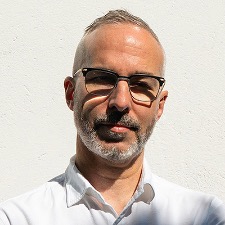
Dan Hill
Director, Melbourne School of Design, AustraliaDan Hill is the Director of Melbourne School of Design at the University of Melbourne and Visiting Professor at the UCL Institute for Innovation and Public Purpose. Dan has led strategic urban planning and design projects worldwide, occupying leadership roles in Arup, SITRA, BBC and Future Cities Catapult. He is the author of numerous publications including ‘Dark Matter & Trojan Horses’ (2012) and ‘Designing Missions’ (2022). He was formerly Director of Strategic Design at Vinnova, the Swedish government’s innovation agency.
Yonette F. Thomas PhD
Founder and president, UrbanHealth360, USADr. Yonette Felicity Thomas is the founder and president of UrbanHealth360, an organization of multidisciplinary thinkers centered on a people-oriented, community-focused approach to urban health. Dr. Thomas is a globally acknowledged thought leader, urban health champion, and an advocate for valuing the health of women and girls as an economic imperative. A social epidemiologist/medical sociologist by training, she has served as the chief of Epidemiology at the National Institute on Drug Abuse in the National Institutes of Health, held academic positions at University of Miami Miller School of Medicine and Howard University, and as a vice president for research. She founded Borjoner International and Strategic Transitions to influence the progress, health, and wellbeing of individuals and communities across the world. As a founding board member of Women’s Economic Imperative (WEI), she leads the organization’s focus on the health of women and girls as an economic value. Her work as global advisor for Evidence for Sustainable Human Development Systems in Africa (EVIHDAF) and the Centre for Urban Health and Development within the Asian Institute of Poverty Alleviation (CUHD-AIPA) extends her focus on the global south and the realization of the Sustainable Development Goals in this last decade. She is the Associate Editor for Women and Girls for Cities & Health. She is a founding board member of the International Society for Urban Health (ISUH) and recently led the organization into sustainability by serving as the inaugural executive director (as a board member) and has served as a science advisor for urban health to the New York Academy of Medicine. She is a founding board member and former vice president of the Interdisciplinary Association for Population Health Science (IAPHS) and served on the Steering Committee of the National Hispanic Science Network on Drug Abuse for more than a decade. She served on the National Academy of Sciences Committee on Revisions to the Common Rule for the Protection of Human Subjects in Research in the Behavioral and Social Sciences. Her primary research and publications have focused on the social determinants of health, health disparities, the health of women and girls as an economic value, the social epidemiology of drug abuse and HIV/AIDS and the link with geography, including edited volumes: Geography and Drug Addiction, Crime, HIV, and Health: intersections of Criminal Justice and Public Health Concerns.
Sunand Prasad OBE
Programme director, European Healthcare Design; Principal, Perkins&Will, UKSunand Prasad is a principal at Perkins&Will. While designing across several sectors, he has been consistently engaged in healthcare and sustainability for four decades. At the core of his architectural practice, alongside interdisciplinary collaboration, Sunand holds a passionate belief that expertise and aesthetic judgement are most effective in creating truly successful environments when they are catalysed by the everyday experience of people. Sunand has been active in the wider built environment industry, particularly championing low-carbon, regenerative design, and until recently, as chair of the UK Green Building Council. He was President of the Royal Institute of British Architects (RIBA) from 2007 to 2009, campaigning for action on climate change. He was founding member of the UK Government’s Commission for Architecture and the Built Environment; a London Mayor’s design advocate; a trustee of the Centre for Cities; and Chair of the trustees of Article 25, the humanitarian architecture charity. He currently chairs the Editorial Board of the Journal of Architecture and the External Advisory Board of TRUUD, a major research project on the fundamental links between health and urban development. He has written widely on architecture, sustainability and healthcare design, such as the book 'Changing Hospital Architecture'.Neighbourhoods as the foundation of a just, green and healthy city
Abstract Copy
The neighbourhood as a foundation for healthy communities is often overlooked in addressing the challenge of delivering adequate housing within planetary boundaries. It’s not only the backbone of a well-functioning and equitable city but also a fundamental human and environmental right. However, governments are not only failing to provide housing for all – with over a billion people worldwide living without a home – they are also failing to consider how neighbourhoods grant access to essential services, resources, and community.
This session will elevate initiatives that recognise that shared amenities are necessary for a more inclusive response to the global housing crisis, drawing on global examples from Bogota to Barcelona.The Council on Urban Initiatives (CUI) has argued that mission-oriented approaches are needed to galvanise government action, alongside cross-sectoral investment and collaboration to realise the right to housing and prioritise the common good. Moreover, it argues that it’s entirely possible for housing to be dignified, durable, beautiful, sustainable, and made available for all.
This session will comprise three main sections:
1. Co-chairs will open the session and discuss the importance of moving beyond outdated housing systems to address the fundamental challenges facing cities today.
2. A moderated roundtable discussion will follow with several Council members introducing the CUI’s frameworks and examples of alternative approaches that foreground the integration of housing into the city in a way that drives health, sustainability and justice.
3. The session will conclude with a Q&A session with delegates, and a summary of key messages from co-chairs.Learning Objectives
- Conference attendees gain new frameworks to understand the potential of homes and neighborhood design to drive inclusivity, sustainability and health outcomes.
- Conference attendees learn from city leaders that have addressed housing challenges in a way that maximizes public value and the delivery of the common good.
- Conference attendees are informed about the potential for both public and private actors to achieve positive social and environmental outcomes through innovative yet people and planet-focused policy and urban design.
15.30 - 16.00Video+Poster Gallery, coffee and networking16.00 - 17.00Session 4- Partnering for impact: Sustainable community engagement for planning, design and policymaking
Yonette F. Thomas PhD
Founder and president, UrbanHealth360, USADr. Yonette Felicity Thomas is the founder and president of UrbanHealth360, an organization of multidisciplinary thinkers centered on a people-oriented, community-focused approach to urban health. Dr. Thomas is a globally acknowledged thought leader, urban health champion, and an advocate for valuing the health of women and girls as an economic imperative. A social epidemiologist/medical sociologist by training, she has served as the chief of Epidemiology at the National Institute on Drug Abuse in the National Institutes of Health, held academic positions at University of Miami Miller School of Medicine and Howard University, and as a vice president for research. She founded Borjoner International and Strategic Transitions to influence the progress, health, and wellbeing of individuals and communities across the world. As a founding board member of Women’s Economic Imperative (WEI), she leads the organization’s focus on the health of women and girls as an economic value. Her work as global advisor for Evidence for Sustainable Human Development Systems in Africa (EVIHDAF) and the Centre for Urban Health and Development within the Asian Institute of Poverty Alleviation (CUHD-AIPA) extends her focus on the global south and the realization of the Sustainable Development Goals in this last decade. She is the Associate Editor for Women and Girls for Cities & Health. She is a founding board member of the International Society for Urban Health (ISUH) and recently led the organization into sustainability by serving as the inaugural executive director (as a board member) and has served as a science advisor for urban health to the New York Academy of Medicine. She is a founding board member and former vice president of the Interdisciplinary Association for Population Health Science (IAPHS) and served on the Steering Committee of the National Hispanic Science Network on Drug Abuse for more than a decade. She served on the National Academy of Sciences Committee on Revisions to the Common Rule for the Protection of Human Subjects in Research in the Behavioral and Social Sciences. Her primary research and publications have focused on the social determinants of health, health disparities, the health of women and girls as an economic value, the social epidemiology of drug abuse and HIV/AIDS and the link with geography, including edited volumes: Geography and Drug Addiction, Crime, HIV, and Health: intersections of Criminal Justice and Public Health Concerns.16.00Partnering for impact: Sustainable community engagement for planning, design and policymaking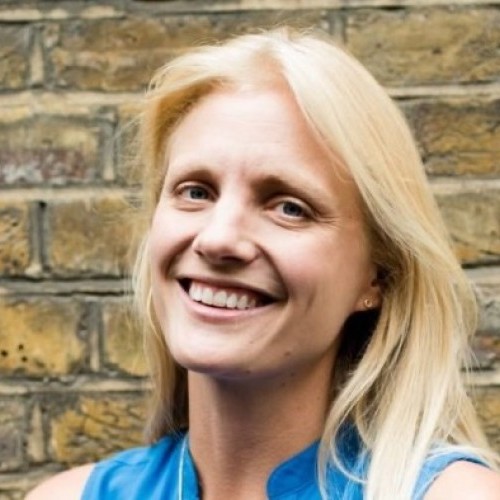
Antonia Orr
Partnerships manager, Impact on Urban Health, UKAntonia joined in November 2021 and is part of the Research and Development team in Impact on Urban Health, working closely with other programmes as well as communications and policy colleagues. In June 2023, she joined the Policy and Influencing team, where she continues to develop on our national and international partnership work. Prior to joining Impact on Urban Health, Antonia was chief executive of Coalition for Efficiency, a small, collaborative charity that supports charity and community leaders to reflect on, measure and manage the impact of their organisation and initiatives. Antonia has close ties with Mexico, where she worked for Semillas, a women’s fund supporting gender justice initiatives.
Kieran Ferdinand
Assistant director strategy and impact, Lambeth Council, UK
Charles Kwaku-Odoi
Chief executive, Caribbean & African Health Network, UKCharles Kwaku-Odoi DL MFPH is Chief Executive of the Caribbean & African Health Network (CAHN), a leading national Black health organisation at the forefront of reducing health Inequalities and wider disparities. He is a Deputy Lieutenant of the County of Greater Manchester, an honorary member of the esteemed Faculty of Public Health (FPH), and the honorary Ecumenical Canon at Manchester Cathedral. He has trustees and board roles including the NHS Race and Health Observatory; Manchester Foundation Trust Council of Governors; and Government SAGE Ethnicity Subgroup. Charles was named in the Health Service Journal 50 most influential Black Asian and Minority Ethnic people in health in the UK for two years running (2022 & 2023). Charles is a Patient Public Voice Partner for NHS HIV Clinical Reference Group and NHS Quality Governance Group. He is a great advocate for equity and fairness across a range of important health and wellbeing issues for people of the Caribbean and African Diaspora. He is involved in work that influences the research, policy, and practice at regional and national level. His special interest includes civic and democratic participation, blood & organ donation HIV, domestic violence, modern slavery and hate crime. Reading, walking, and football are his hobbies. X (former Twitter): @charleskod LinkedIn: Charles Kwaku-Odoi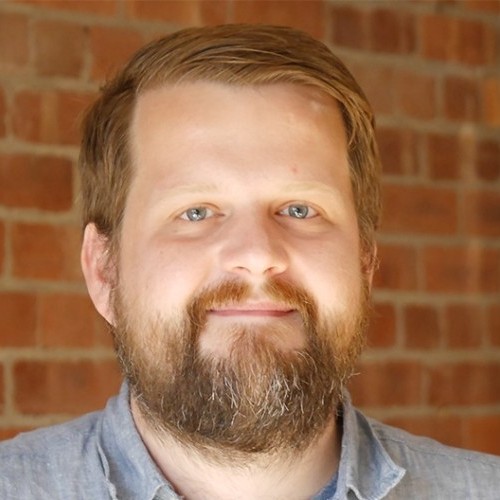
Andrew Beattie
Engagement and impact lead, Kindred, UKAndrew has 20 years’ experience working with businesses across the social economy to tell their stories and increase their impact. He has worked nationally and internationally, helping connect people with ideas and build networks. He is a founding team member of the Kindred team, working as communications and membership lead from 2020-2024. He’s also co-dean of micro-granting organisation Awesome Liverpool, which has given monthly £500 grants to support grassroots projects in Liverpool since 2013. Andrew leads on our engagement with members, local and national stakeholders. He is responsible for our peer-to-peer support, shared learning and resources amongst members and with partner organisations, our directory of STOs, member events, and ensuring that we remain STO-led. He is also responsible for coordinating our impact data collection and analysis.
Joshua Artus
Director, Centric Lab, United KingdomAn urban geographer focusing on the relationship between urbanisation and health outcomes at the community level. Josh helps run Centric Lab, a non-profit organisation prototyping ways to use health-based scientific evidence to support justice movements, surface and socialise non-western epistemologies and create language to articulate the injustices felt by many communities about our shared health. Using neuroscience and environmental data to identify how biological inequity contributes to poor health outcomes in neighbourhoods and peoples that have been racialised and marginalised, Centric Lab use this research to build open-access community tools, create new narratives and framings of health, and provide organisations with expertise and insights on health and place.Partnering for impact: Sustainable community engagement for planning, design and policymaking
Abstract Copy
Effective community engagement is fundamental to designing and building healthy cities. When funders, policymakers and urban planners engage meaningfully with communities, then even the starkest health inequalities can be addressed.
When done well, community engagement can help rebuild trust, engage communities in design and policy development, and ensure that crafted design and policies meet communities’ needs by drawing on the assets and expertise that already exist in communities.
This session will explore the benefits and actions of effective and sustainable community engagement. Doers within and supporters to community organisations in London, Liverpool, and Manchester will share and discuss:
• The process for creating meaningful and sustainable engagement between communities, local government and philanthropic funders;
• The benefits of and action steps needed for effective and sustainable partnerships between communities and local government; and
• What makes partnerships successful, including the crucial role of catalyst organisations.
This important discussion is intended to result in a white paper that will be presented at HCD in Manchester next year. The ultimate goal is that this becomes a living report to inspire and inform leaders to develop sustainable and impactful partnerships with and for communities.End of Advancing health equity stream -
10.45 - 12.30Session 6- Healthy places: Tools, frameworks and pathways

Helen Pineo
Research Associate Professor, University of Washington, United StatesHelen Pineo, PhD MRTPI is an urban planner and Research Associate Professor in the Department of Urban Design and Planning at the University of Washington. Her research focuses on how urban policy and development can support health and sustainability. She contributes to the evidence base about why and how to do healthy urbanism by using transdisciplinary approaches and amplifying the needs of under-represented communities and the planet. Her current and past research involves participatory, systems thinking and other methods to study: urban transformative change, housing and health, urban health metrics and evidence use in government. Her book, Healthy Urbanism (Palgrave Macmillan, 2022) provides a multi-scalar conceptualization of healthy urban environments, integrating equity, inclusion and sustainability. Helen lived and worked in London for 16 years, most recently as an Associate Professor at University College London, and previously as an urban planner working on projects in the UK and internationally.10.45Evaluating the Place Standard Tool pilots in northwest England: Preliminary findings, ongoing work
Caglar Koksal PhD
Lecturer in Urban Planning, University of Manchester, United KingdomCaglar Koksal is a Lecturer in Urban Planning at the University of Manchester, with expertise in spatial planning, planning practice, housing and infrastructure planning, urban governance and policy, and health creation and inequalities. He has led and collaborated on numerous funded research projects at national and international levels, and he co-leads the Environment theme within the Healthier Futures Research Platform at the University. His research is grounded in a commitment to evidence-informed, practically engaged scholarship, using both quantitative methods (such as GIS and spatial analysis) and qualitative methods (including policy analysis and elite interviews). Dr Koksal’s broader research and consultancy work includes leadership on projects examining policy design and implementation, as well as collaborative work with local authorities, national government, think tanks, and private sector consultancies
Steve Morton
Health improvement programme manager, Office for Health Improvement and Disparities, United KingdomSteve has worked in the public health field for 23 years following an early career in Biomedical Science. His work has spanned the NHS, Universities, Private Sector, Local Government, Regional and National Government, and through volunteering gained extensive international experience. He is currently the Office for Health Improvement and Disparities (OHID) North West Lead for Health Inequalities, Healthy Place and Levelling Up. His work has included the Children of the Nineties Project, Drug and alcohol harm reduction, Children and young people’s health, Healthy weight, tobacco control, health inequalities, Incident response, and Housing, planning, environment and health. Steve often develops pioneering initiatives developing new operating approaches such as a Whole Systems Approach, adopting Healthy high streets, and maximising licensing and planning laws to address health concerns. He has been a member of many government and third sector steering groups covering commissioning, treatment, planning, licensing, organisational and cultural and best practice.
Emma Dixon
Organisational lead - Place Population Health & Wellbeing Directorate, Public Health Scotland, UKEmma has recently started a new role with Public Health Scotland as an Organisational Lead for Place (including the Place Standard Tool). Prior to this she worked as Strategic Partnership Manager for the multiagency Carlisle Partnership, working closely with a range of key stakeholders across the Carlisle area and the newly formed Cumberland Council. Emma worked across a variety of strands, to enable, encourage and facilitate joined up working and tackle complex ‘wicked issues’ within the area; whilst leading and developing local place-based change, working and relationships. In this role Emma has: - Participated in and informed “Transformative Partnerships-exploring the potential for place-based collaboration linked to Sustainable Development Goals (SDGs)” research with two international universities, Lancaster City Council and the Lake District National Park Partnership; - Enabled Carlisle’s journey to become one of the founding member cities of the Sustainable Food Cities movement across the United Kingdom and achieving a national bronze award in 2018; - Developed a 4 year “Your Place” project to help communities to identify priorities in a bottom-up approach, pulling in partners from a range of sectors to facilitate (and piloting Scotland’s Place Standard tool). This has led to a North West wide pilot and evaluation project - Held the role of joint World Health Organisation (WHO) Healthy City Coordinator, through which she has presented at many WHO events, and is also a member of the European WHO Healthy Cities Place, Health, Inequalities Well-being Group. During 2021/22 Emma spent a secondment with Public Health England, and the newly formed Office of Health Improvement and Disparities, where she led the Wider Determinants work regionally and supported the development of national projects and policy. Due to her experience, Emma has been recruited to The Health Foundations National Healthy Places External Reference Group.Evaluating the Place Standard Tool pilots in northwest England: Preliminary findings, ongoing work
Abstract Copy
This paper presents the preliminary results of an ongoing evaluation of the Place Standard Tool (PST) integration within health improvement programmes by local authorities in northwest England. Initiated by the Office for Health Improvement and Disparities (OHID) in collaboration with the University of Manchester, the project aims to assess the adoption and efficacy of PST in enhancing public health outcomes in England. Cumberland Council has previously embraced and adapted the PST, and this forms the bedrock of our work.
The PST, developed by the Scottish Government, provides a framework to evaluate and improve the physical and social environment of places. The tool addresses various themes such as green spaces, housing quality, essential services, and community cohesion, which are critical wider determinants of health. By facilitating a comprehensive assessment involving local communities, practitioners, and policymakers, PST aims to identify strengths and areas for improvement, thereby informing planning and development decisions to create healthier, more sustainable communities.
Our evaluation focuses on a pilot project involving three local authorities. The primary objectives are to test and refine PST's application, understand its integration across different local government functions, and evaluate its impact on health and wellbeing.
The evaluation is structured in three phases: scoping and planning, process evaluation, and impact evaluation. This presentation will report results from the first two phases. The scoping phase involved a document review and an online survey to understand the context and objectives of PST implementation. The process evaluation employs a mixed-methods approach, combining surveys and in-depth interviews with LA officers to capture data on PST deployment. This phase aims to assess the efficiency of execution, fidelity to planned procedures, and identify operational challenges and successes. Initial findings indicate that PST facilitates inter-departmental collaboration and stakeholder engagement, crucial for holistic health improvement strategies. Early feedback from LAs highlights the tool's adaptability to diverse community contexts and its potential in identifying and addressing health inequalities. However, challenges such as data availability, resource constraints, and varying levels of local authority engagement need continuous management. The impact evaluation, still in the planning stages, will use a mixed-methods approach to assess the efficacy of PST in achieving intended health outcomes.
The PST pilot project in northwest England demonstrates potential in improving public health through place-based strategies. By fostering a collaborative approach and addressing identified challenges, this initiative strives to contribute significantly to the development of healthier, more resilient communities.
Learning Objectives
- public health
- placemaking
- evaluation
11.05A systems mapping method to study how cities manage infrastructure systems and climate health risks
Maria Ikonomova
PhD candidate, University of Cambridge, United KingdomMaria is a PhD student in the Centre for Sustainable Development at the University of Cambridge. Prior to starting her PhD Maria completed a MRes degree at the EPSRC Centre for Doctoral Training in Future Infrastructure and Built Environment at the University of Cambridge and conducted research exploring how to retrofit NHS facilities to cope with extreme weather events. Maria completed her undergraduate studies at the Bartlett School of Sustainable Construction, and also has previous experience working in project management roles for a construction and property consultancy and an environmental charity.A systems mapping method to study how cities manage infrastructure systems and climate health risks
Abstract Copy
Cities are complex systems in which a diverse set of stakeholders, such as city climate change, urban planning departments, transport organisations, and utility providers, can develop infrastructure risk management measures to reduce climate-health risks.
This paper introduces a Climate-Infrastructure-Health-Risk Management Mapping Tool that can be used to holistically map how cities manage physical infrastructure systems and climate-health risks. The tool can help identify the key stakeholders involved in the management of infrastructure systems and climate-health risks, and how they share information and financial resources that enable the development of infrastructure risk reduction interventions. Furthermore, the tool can be applied to map the diverse on-the-ground infrastructure interventions, including urban planning policies, infrastructure projects, and infrastructure maintenance measures implemented by stakeholders to reduce climate-health risks.
The Climate-Infrastructure-Health-Risk Management Mapping Tool was applied to study the management of physical infrastructure systems and climate-health risks in two cities: Ottawa (Canada) and London (UK). Multiple sources of data, including semi-structured interview, climate risk, and policy data, were used to populate the tool and map the infrastructure mechanisms developed in these cities to manage heat-health risks.
The research findings illustrate the complex infrastructure risk management mechanisms, including the multi-stakeholder partnerships, diverse information sources, and funding mechanisms, that have enabled the development of physical infrastructure interventions to reduce heat-health risks in the case study cities. Moreover, the findings reveal that these mechanisms have facilitated the implementation of a broad scope of interventions across a diverse range of physical infrastructure systems, including social, transport, and green infrastructure systems, to reduce heat-health risks.
The research shows that systems mapping methods, such as the Climate-Infrastructure-Health-Risk Management Mapping Tool, can help to analyse the complex infrastructure management mechanisms developed in cities to reduce climate-health risks. The use of such methods can provide a more in-depth understanding of the partnerships, information sources, and diverse infrastructure interventions developed by cities to protect public health from climate-related hazards.Learning Objectives
- Show how the Climate-Infrastructure-Health-Risk Management Mapping Tool can be used to study the management of physical infrastructure systems and climate-health risks in cities.
- Examine the diverse partnerships, information sources, and financial mechanisms developed in Ottawa and London that have enabled city stakeholders to implement multiple on-the-ground physical infrastructure interventions to reduce heat-health risks.
- Explore the types of on-the-ground physical infrastructure interventions developed in Ottawa and London to reduce heat-health risks.
11.25Who can influence healthy urban development?Anna Le Gouais
Research fellow, University of Bristol, United KingdomAnna is a Research Fellow at University of Bristol - Population Health Sciences, Bristol Medical School. She is seconded part-time to Bristol City Council as part of the TRUUD project, where she works with Regeneration, Planning Policy and Public Health teams.
Marc Cooper
Regeneration project manager, Bristol City Council, United KingdomMarc Cooper is a Regeneration Project Manager at Bristol City Council with previous regeneration experience at Royal Borough of Kingston upon Thames.Who can influence healthy urban development?
Abstract Copy
Healthy urban development involves consideration of multiple wider determinants of health, including housing, transport, community infrastructure, employment and climate resilience. These can be influenced by a range of stakeholders with differing priorities and levels of power.
Purpose: We examine how key stakeholders (developers, local government and the public) can influence factors associated with health in large-scale property development.
Methods: We present learning from a local government regeneration project in an English city. The project developed a spatial regeneration framework, involving extensive early public engagement and iterative Health Impact Assessments (HIAs), for a 15 ha area with multiple landowners that was changing from predominantly industrial to residential, alongside employment, commercial and green spaces. We present how developers, local government, and the public influenced decision-making in relation to 11 wider determinants of health categories used in the project’s HIA framework..
Results: In our experience, developers are most influential in urban development designs, particularly for building design. Financial viability will likely influence these designs which can influence health and wellbeing. They have less influence on access to health and social infrastructure, and access to healthy food, which involve third parties.
Local government has some influence on developer proposals, particularly through policies, guidance and determining planning permissions. However, compromise occurs due to housing delivery and financial viability pressures, therefore health, environmental and community related policy requirements and ambitions are unlikely to all be achieved. Limited resources in local government reduces influence.
Local communities have limited direct influence in most urban development decisions, although they can be invited to contribute, such as to inform changes to greenspaces. Legislative processes include public consultation; however, other issues, including financial viability, are likely more influential. Better public understanding of community and local government scope of influence can help build trust and direct community efforts to support healthier placemaking.
Conclusions: Understanding which stakeholders influence urban development decisions can support interventions for healthier environments.Learning Objectives
- Understand influence of key stakeholders in urban development decision-making (developers, local government and the public).
- Identify how to target interventions for healthier place-making, build transparency and understand trade-offs.
- Understand health and wellbeing challenges in urban development due to financial viability and considerations of practical delivery.
11.45A preventative pathway for health and wellbeing – guidance for designers
Rob Delius
Head of sustainability, Stride Treglown, United KingdomRob is an architect and Head of Sustainability for Stride Treglown. Rob is passionate about placemaking, regenerative design, biodiversity and healthy cities. He is coordinating the practice's focus on zero carbon, nature abundant, people-centric, zero waste design. He was one of the founders and organisers of the Therapeutic City festival in Bath. The 7 day event explored how to make places good for the mind, body and soul and hosted a wider range of speakers as well as collaborating on closing main thoroughfares in the city to traffic during the festival. Rob was one of the architects behind the practice’s shortlisted ‘Re-imagining the Garden City’ entry, and been the winner of two RIBA competitions: ‘Tomorrow’s Garden City: A sustainable approach to living’ and ‘Imagine Bath’. He was architect for Great Bow Yard which was named ‘most energy efficient street in the UK’ when it was completed. He is behind several initiatives including 52 Big Ideas for Bristol, Waters of Bath, Bristol Colour Capital and more recently Sinking House, a climate art installation that received global media coverage, and a Funeral for Nature, a large-scale street procession highlighting biodiversity loss.
Lydia Ramsden
Urban designer, Stride Treglown, United KingdomLydia Ramsden is an Urban Designer at Stride Treglown, specialising in design for health. She has a background in architecture and planning with an MA in urban design. Her professional experience focuses primarily on residential, higher education and urban regeneration. Lydia has a strong passion for public health and well-being within the built environment, notably that of restorative urbanism. Through in-depth research, as part of her master’s thesis, Lydia explored how the impact of the sensory landscape across the various urban morphological layers can have a positive effect on the restorative nature of place-making. She demonstrated how having a holistic approach to urban design and health can create a greater understanding for how designers can create people centric, restorative places. Following this research, Lydia is continuing to contribute towards better health and wellbeing opportunities within current design projects and is working towards gaining further knowledge on how this area of expertise can influence the built environment sector going forward. She co-authored Stride Treglown publication 'Health and Wellbeing designed-in'.A preventative pathway for health and wellbeing – guidance for designers
Abstract Copy
Levels of anxiety, suicide, obesity, diabetes, depression, loneliness, dementia, cancer, cardiovascular disease, asthma are all at record highs, placing huge burden on the NHS and social care. Public Health England also says that the cost of sickness absence and lost productivity to UK businesses is estimated to be over £100bn annually. To reduce this enormous strain on our health service and cost to business, we need put greater emphasis on not only treating ill health but how to prevent ill health.
Our physical environment is widely agreed to be one of the main influences in how healthy and happy we are. We should be designing buildings and urban environments that help prevent us getting ill in the first place, with the right conditions to nurture our mind, body, and soul. Rather than focusing purely on a restorative approach, we are looking to embrace a preventative pathway to health.
According to The Wildlife Trusts the NHS could save more than £635 million a year by signing some patients up to nature-based health and wellbeing programmes. The case for contact with nature having a positive impact on our health has been well documented. But what are the other ingredients that could improve our health that we should be designing into buildings and urban environments?
We have identified six key ingredients for a preventative design pathway:
Nature. Strategies to promote everyday interactions with the natural world.
Exercise. Encouraging physical activity for mind and body.
Calm. Providing opportunities for rest, tranquillity and restoration.
Play. Encouraging play and spontaneous connection, not just for children but adults too.
Community. Bringing people together for shared experience to foster togetherness and combat loneliness.
Sensation. Engaging our physical senses and connecting us with the here and now.
A lot has been published about the importance of occupant health and wellbeing when designing buildings and places. But with so much to digest, from so many sources, the amount of information can be overwhelming. We have worked in partnership with Avon and Wiltshire Mental Health Partnership NHS Trust to produce a bite-size, plain-English preventative pathway guide for project commissioners and designers. The guide aims to simplify the subject into step-by-step, practical guidance for the early stages of projects, when designing-in the ingredients for health can make the biggest difference.
Learning Objectives
- Raising industry awareness of health and wellbeing in design
- Merging professional built environment experience with publicly accessible research
- Practical application of knowledge in the context of the built environment
12.05Panel discussion12.30 - 14.00Video+Poster Gallery, lunch and networking14.00 - 15.30Session 7- Strategies for healthy street design
Magali Thomson
Project lead for placemaking, Great Ormond Street Hospital, UKMagali Thomson is an architect working at Great Ormond Street Hospital, one of the world’s leading children’s hospitals. Here, she is setting out vision for a climate-resilient, healthy and child-friendly street, a healthy hospital street. She is particularly interested in preventive approaches to health and the impact our environment has on children’s health outcomes. She recently completed an Executive MSc in Cities at the London School of Economics, graduating with a Distinction. Her thesis focused on how children and their carers are impacted by air quality in Lewisham. She is also a built environment expert at the Design Council, a healthcare expert at the NLA and has positions on Design Review panels in Design South East, Southwark and Brighton. She previously led a successful education team to deliver award-winning schools at Marks Barfield Architects, where she was a director.14.00Healthy streetlife: Residents’ street design priorities to support everyday health practices
Mark Drane PhD
Director, Urban Habitats, United KingdomMark is a researcher and practitioner with 20 years’ experience. He works across the fields of public health, urbanism, and architecture. His work addresses wider determinants of health, focused on promoting holistic wellbeing, and reducing health inequalities. Mark has recently completed his doctoral research, Healthy Streetlife, undertaken during the Covid-19 pandemic observing the impact of the street environment on health. This research has been based at the WHO Collaborating Centre for Healthy Urban Environments, UWE Bristol. As the founder and director of Urban Habitats Mark’s practice work encompasses population health across a spectrum of topics and methods. This includes working at a whole country scale with the WHO Collaborating Centre on Investment for Health and Wellbeing at Public Health Wales. He works at all urban scales including community co-design and addressing community agency as a determinant of health. With a background in practice and industry Mark has been involved in the delivery of over £2 billion of capital investment in social infrastructure. Mark has experience with a broad range of stakeholders across the urban health ecosystem from many different systems and sectors. Happiest whilst on a bicycle Mark is an optimistic gardener and lives in Cardiff, Wales with his family.Healthy streetlife: Residents’ street design priorities to support everyday health practices
Abstract Copy
The Future Generations Commissioner for Wales has called for public bodies to support their citizens to co-design streets for health and wellbeing. More understanding is needed of the street environment as both a social and physical environment, including what matters to citizen’s whose knowledge is often excluded by practitioners and policymakers. Streets have been places of conflict and this now extends to street design guidance: e.g. a revised Manual for Streets being deprioritised by UK government.
Methodology: This paper synthesises results from two studies: first, a systematic review conducted to PRIMSA guidelines aiming to assess the strength of evidence for non-communicable disease outcomes/risk factors at the street scale. Second, a modified reflexive thematic analysis of online semi-structured interviews with adult participants (n=20) across streets (n=18) in Cardiff, Wales during a pandemic. This second study aimed to centre residents’ experiences, exploring how street environments impact health practices. A preliminary (ongoing) comparative analysis and narrative synthesis of the physical environment components of these two studies is presented. Fieldwork visual artefacts illustrate the findings.
Findings: Systematic review: a small, scientifically weak but growing literature addresses physical health risk factors with street environment characteristics synthesised into categories; e.g. land use and mix, urban and housing design. Thematic analysis: identifies street environment characteristics in themes; e.g. street holistic layout, green space, sounds.
Differences between findings on street physical environment characteristics and health-related outcomes are identified. Systematic review provides a broad measurable understanding; qualitative findings support understanding of how processes work, including differences by gender. Included studies in a systematic review focus on physical health risk factors whereas residents identify health impacts more holistically.
Conclusion: Synthesis of outputs from two different studies informs broad understanding of quantifiable features alongside a qualitative understanding of how processes work. What residents prioritise is sometimes not reflected in the literature. This has implications for research, policy and practice, including the need to balance top-down approaches like healthy cities with grassroots effort from the streets. This paper is a call to address the street environment for all its health-promoting potential.Learning Objectives
- The interaction of the street social and physical environment.
- Understanding of the difference between what research prioritises and citizens think is important.
- Evidence informed design priorities for streets that support residents' health practices.
14.20Lambeth’s Kerbside Strategy: One year on
David Wilson
Transport strategy programme manager, London Borough of Lambeth, United KingdomI lead the transport strategy and programmes team, which are a key component of the councils climate change direcorateLambeth’s Kerbside Strategy: One year on
Abstract Copy
The kerbside is one of the largest yet most forgotten public spaces that local councils, and local communities, have at their disposal. The status quo sees the kerbside as very little but a place to park a motor vehicle. In Lambeth, where 60% of households do not have access to a car, 96% of kerbside space is used to manage motor vehicles. Lambeth’s kerbside sets out to address this disparity in access to our shared and public kerbside, and in turn support several public health outcomes and ensure that “the kerbside” is a crucial component in the boroughs journey towards healthy streets, and in delivering our Climate Action Plan. By 2030, we are aiming to have 25% of our kerbside used sustainably.
The strategy sets out minimum commitments for every street through in Lambeth through “Kerbside Basics”, which cover four priority functions of a sustainable kerbside: enable accessible and active travel; create places for people; increase climate resilience; and reduce emissions and traffic. Underpinning the strategy is an inclusive design principle, which means we use the kerbside to ensure that pavements are free of clutter, and that everyday walking and wheeling is an option for everyone using our streets.
One year into the delivery of the strategy, we have over 9km of new sustainable kerbside. We have developed an innovative “kerbside dashboard” – a live view of our kerbside mapped out against the four priorities. We can demo this in a presentation and explain how it’s informing delivery, and is replicable for every council in the country. Changes that require civils works, as they mix with underground utilities, could be required if we’re going to manage flood and heat risk as the climate warms. We are actively seeking partnerships with the public health sector.
Implications: The strategy has been extremely well received, and we continue to identify new opportunities for partnership delivery. We knew from the outset that we couldn’t deliver it on our own, and partnerships with the private and third sectors will need to play a part. We are developing a kerbside health score that can interact with development management and encourage sustainable kerbside through the planning process. We are implementing showcase streets, which encompass all the priorities of the strategy into a street.
Learning Objectives
- Innovation sharing
- Delivery experience knowledge share
- Public health integration with street design
14.40Streets for Diversity: Exploring how neurodivergent people experience streets
Katie Gaudion
Senior research associate, Helen Hamlyn Centre for Design, Royal College of Art, UKKatie is a designer whose work celebrates neuro-diversity and whose research explores how design can improve living environments for autistic adults. Katie is a Design Researcher and has spent over 14 years working with neurodivergent people, who may have a unique way of thinking and experiencing the world. Her research largely investigates how design can improve the physical environment for autistic people. Katie develops tools that connect, communicate and engage with autistic people and their support network, to enable them to be active participants in the design research. Katie is the first Research Associate to have completed a PhD by practice at the Helen Hamlyn Centre for Design. The PhD explored how autistic adults with additional learning difficulties experience their home environment. Katie has since put her ideas into practice in a wide variety of contexts, such as supported living accommodation, workplaces, sensory environments, educational institutions, health clinics, and hospitals. Her work has been published and presented internationally. Katie’s research has broadened the Helen Hamlyn Centre for Design’s methods and practices to consider hidden disabilities and neurodiversity (such as autism and mental health) for the first time. Katie encourages designers to collaborate with neurodivergent people, whose unique ideas for innovation can be easily overlooked.
Dan Phillips
Senior research fellow, Intelligent Mobility Design Centre, Royal College of Art, UKDan Phillips is a designer and engineer with 30 years’ experience in the development of innovative environments, products and services. Dan studied at Imperial College and the University of Cambridge and is a senior research fellow and studio leader at the Intelligent Mobility Design Centre (IMDC) at the Royal College of Art and a design strategist at Design Science Ltd. He is a Fellow of the Royal Society of Arts and has been a member of a number of institutional advisory groups on cities, sustainability and the built environment.Streets for Diversity: Exploring how neurodivergent people experience streets
Abstract Copy
Streets for Diversity is a collaborative design research project run by the Royal College of Art’s Helen Hamlyn Centre for Design and Intelligent Mobility Design Centre, and funded by the Rees Jeffreys Road Fund. It aimed to bridge a gap in research about how neurodivergent people experience streets and hypothesised that our current streets and public realm may, by design, exclude those of us who are neurodivergent.
The project invited neurodivergent citizens, researchers, champions and transport experts to participate in a range of co-design activities. These included ‘walk and talks,’ which allowed participants to travel around in urban areas and share their reflections on their experiences in real time. The ‘walk and talks’ were supplemented by online surveys, interviews, and a co-creation workshop, which together explored the challenges and opportunities found in our urban streets.
Collecting and analysing the street experiences helped identify 14 key insights into how neurodivergent people experience and think of streets. These insights included, for example, the complexity involved with preparing to go out on the street; dealing with unpredictable situations when out; and the tools that neurodivergent people have developed to manage the sensory landscape of the street.
From the insights, the researchers were able to draw out 12 design opportunities that could help make our streets more accessible, comfortable and joyful for neurodivergent people, including improvements to the physical environment, improvements using information and communication systems, designing to support independence on the street, and opportunities to connect and celebrate our different minds and bodies.
The methods, insights and design opportunities were compiled into a report, and an animation was created to illustrate some of the challenges experienced by neurodivergent participants discovered in the project.
15.30Panel discussion15.30 - 16.00Video+Poster Gallery, coffee and networking16.00 - 17.00Session 8- Planning child-friendly cities
Becky Mumford
Senior urban planner, Prior + Partners, UKBecky is an award-winning planner, researcher and tutor at Prior + Partners. Projects include research into urban planning and health and preparation of a structure plan for Thimphu, the capital of Bhutan. She previously worked at the London Borough of Tower Hamlets on the High Density Living Design Guide.16.00Aligning perceptions and reality: The impact of urban environments on children’s subjective wellbeingAdriana Ortegon-Sanchez
Research fellow, University College London, United KingdomAdriana is a researcher at the Centre for Transport Studies at UCL with over 10 years of experience investigating sustainable mobility and wellbeing and health in cities. Upon joining UCL, she participated in a large-scale interdisciplinary program defining visions for future liveable cities. Adriana has professional expertise in the planning and assessment of policies for active mobility, low-carbon transport and healthy places in Latin America and the Caribbean. She has collaborated closely with planning authorities and communities in the UK and internationally to build capacity and empower citizens with tools for transformative action. Her current research employs quantitative and qualitative methods to understand how the built environment of streets and neighbourhoods impacts children's health, subjective wellbeing, and travel behaviour. Her research also focuses on assessing policies such as the health impact assessment of new developments and understanding the broader benefits of healthy places interventions, such as fostering inclusive, sustainable cities and communities and achieving decarbonization goals.
Kimon Krenz
Senior research associate, University College London, United KingdomDr Kimon Krenz is a Senior Research Associate at the Bartlett School of Architecture and a member of the Space Syntax Laboratory at University College London (UCL), United Kingdom. He earned his PhD in Urban Space and Computation from UCL. His research utilises computational methods to quantify and analyse the built environment, focusing on how space influences human behaviour. He is particularly interested in using spatial data science to uncover social, economic, health, and spatial inequalities, applying this knowledge to inform evidence-based urban planning and policy-making. In addition to his academic work, Dr Krenz has experience as an architect, urban planner, and consultant for medium to large-scale urban development projects in Germany, which have received several architecture awards. @KimonKrenz
Lisa Dowling
Senior research fellow, Bradford Institute of Health Research, United KingdomLisa is a Senior Research Fellow / Embedded Researcher working at the Bradford Institute of Health Research (BIHR) and the City of Bradford Metropolitan District Council (CBMDC). Her work aims to support the use of research and evaluation in local government decision-making. Lisa particularly focuses on supporting ‘real-time’ research and evaluation of place-based interventions to understand the impact on health and wellbeing.Rosie McEachan
Born in Bradford director, Bradford Institute of Health Research, United KingdomRosie McEachan is the Director of Born in Bradford and a proud (Scottish) Bradfordian. She is an experienced applied health researcher with particular interests in cohort studies, development and evaluation of complex interventions, environmental determinants of health, green space, air quality, and co-production. Rosie holds a visiting professor position at University College London and an honorary chair position at the University of Bradford.Aligning perceptions and reality: The impact of urban environments on children’s subjective wellbeing
Abstract Copy
This research recognises the profound influence of the streets built environment on children's daily lives. It focuses on the trip to school as a child’s most frequent journey and their most prevalent street activity. The research defines a methodology for characterising street environments for school journeys on foot, using both objective environmental attributes, and children’s standardised perceptions of those attributes. It further examines the alignment between the objective and the perceived measurements, and how both influence the quality of children’s commuting experiences and their subjective well-being (happiness and enjoyment) while travelling.
To characterise the streets' objective attributes, the study uses seven built environment domains that have been reliably associated with child health. These are: safety, noise, greenery, security, land use, air quality, and pedestrian infrastructure. The objective measures were calculated using Geographic Information Systems and the standardised subjective measures were gathered via a bespoke questionnaire for children, the C-HaPIE tool. The questionnaire asked children for their perceptions of the street environment around the home, along their route to school and around the school, as well as their self-reported health and happiness. A total of 1256 children were surveyed on their perceptions. Participants included children aged 8-11 from a sample of primary schools in neighbourhoods with high levels of deprivation in London and Bradford, UK.
Our primary research question explores the correlations between aspects of the built environment and children’s subjective perceptions and mood states during their school journey. The findings highlight the differences in how children perceive the built environment and how these perceptions do not always align with its objective characteristics. Furthermore, we demonstrate that considering both perspectives explains variations in children's wellbeing. These findings aim to inform urban design interventions that enhance physical and psychological wellbeing, thereby contributing to reduced health inequalities in urban settings. Our methodological approach can contribute to strategies for creating urban environments that support children's health in three ways. First, it addresses gaps in how the built environment is defined and measured, ensuring a more precise characterisation of children's exposure to street environments. Second, it uses an approach that prioritises children’s views and responds to the need for research methodologies that reflect children's own experiences. Finally, it studies subjective wellbeing during the journey to school, which is a significant yet under-explored aspect of children's daily lives.Learning Objectives
- Understanding child-centric research and design approaches.
- Insights into differences between subjective perception and objective measurements of the built environment
- Knowledge on what influences children's wellbeing on their way to school
16.20Practical application of the Child Friendly Urban Environments (CFUE) framework
Ffion Carney
Senior data scientist, AtkinsRéalis, United KingdomDr Ffion Carney is a Senior Data Scientist within the AtkinsRéalis Building Design Research & Innovation team. She specialises in urban analytics, geospatial analysis, and social science research. She holds a PhD in Geographic Information Science from the Consumer Data Research Centre, UCL, where she explored the use of big data to understand urban mobility patterns and transport disadvantage in vulnerable populations. Her current research focus is on the use of open data and geospatial analysis to address challenges and inequalities in urban environments. She leads a number of research initiatives and has extensive experience of applying GIS and geospatial analysis across large masterplanning projects to inform social and green infrastructure planning.Practical application of the Child Friendly Urban Environments (CFUE) framework
Abstract Copy
By 2050, nearly 70% of the world’s children are expected to live in urban areas (World Bank 2017), underscoring the vital role urban spaces play in children’s development. In response to this, UNICEF developed The Child Friendly Cities Initiative (CFCI) to support cities in their efforts to become child-friendly over the course of three to five years. However, there remains a lack of guidance and tools for designers to support the creation of spaces that positively contribute to child development.
The Child Friendly Urban Environments (CFUE) framework was developed to address this gap. This framework is designed to analyse, assess, and enhance the built environment to better accommodate the needs of children. It focuses on interventions within the urban design and planning sectors, offering a scalable and practical approach to creating child-friendly urban environments at various scales, from city-wide interventions to neighbourhood-level improvements. The CFUE framework comprises six pillars that guide practitioners in creating child-friendly designs. These cover Health & Wellbeing; Play; Independent Mobility; Social Amenities & Education; Community & Connectivity; and Safety & Protection.
This research focuses on the application of the CFUE framework as an engagement tool for designers and stakeholders. Through a case study of the Grangetown area of Cardiff, we demonstrate how CFUE can be adapted by practitioners to assess the ‘child friendliness’ of a site area. Firstly, we outline the quantitative data collection methods used to conduct an initial assessment across each of the six pillars, helping to assess gaps or opportunities for child friendly landscapes. We then demonstrate how designers and stakeholders can use the CFUE framework to undertake qualitative assessments of the same area to both supplement and challenge these quantitative analyses. Qualitative questions and prompts are also used to gain additional insights from designers and stakeholders. The results allow urban designers and stakeholders to understand how well their project area performs against the needs of children, highlighting priorities and areas of improvement and opportunity.
Using the CFUE framework as an engagement tool allows designers and stakeholders to view their sites critically through the lens of ‘child friendliness’ from the beginning of a project. The combination of context specific qualitative and quantitative data provides a rich landscape of information to consider. Demonstrating this practical application of CFUE underlines the importance of having guidance focused on the needs of children to design child-friendly towns, cities, and communities.Learning Objectives
- Understand the role of urban environments in shaping children’s development
- Understand how our Child Friendly Urban Environments framework can be applied as an engagement tool for designers and stakeholders
- Demonstrate the quantitative and qualitative assessments needed to assess a project area in terms of its ‘child friendliness’
16.40Panel discussionEnd of Urban planning, placemaking and public realm stream -
10.45 - 12.30Session 9- Greening the city: Parks, nature and wellbeing
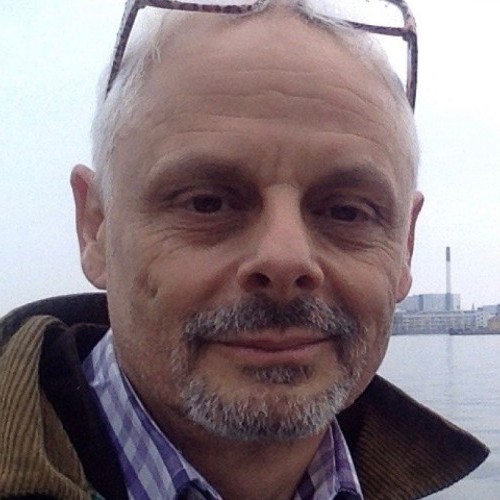
Marcus Grant
Editor-in-chief. Cities & Health, UKMarcus is editor-in-chief of the Cities & Health journal. Marcus is former associate professor and deputy director of the WHO Collaborating Centre for Healthy Urban Environments at the University of the West of England, where he worked for some 20 years. His mission is to integrate the disparate scales of healthy urban places, linking work, neighbourhoods and communities with city policy to regional planning, and national and international initiatives. See LinkedIn for his full CV details.10.45Designing for healthy choices first: Changing behaviour in cities from California to Bhutan
Elise Baudon
Masterplanning director , Prior + Partners, United KingdomElise is a masterplanner and Managing Director at Prior + Partners. Attuned to the many competing interests at play in the development process, she has worked with a mix of public and private sector sector clients, established technology firms, and sustainability-focused property developers in the UK, USA, and France. A broad cultural perspective, and a conviction that well-designed built environments have the ability to transform our lives, underpin Elise’s work. Her portfolio spans large-scale regeneration schemes, neighbourhood planning studies, and open space and public realm design strategies, with current projects in London, Bristol and for Google in California. A licensed member of the American Institute of Certified Planners, she studied Urban Planning at the Harvard Graduate School of Design.Designing for healthy choices first: Changing behaviour in cities from California to Bhutan
Abstract Copy
This presentation will compare and contrast two major urban design and placemaking projects in the different contexts of California and Bhutan. Both aim to transform how people live in the city, by designing for healthy choices first.
In Silicon Valley, Prior + Partners' masterplan for Google at Moffett Park aims to create a mixed-use development at urban scale. Currently, the city is structured around private vehicle movement leading to multi-hour commutes. In parallel, we're working with the Royal Government of Bhutan to transform its capital city, Thimphu. Bhutan is experiencing rapid urbanisation, leading similarly to overwhelming dependence on the car. By directing ‘good growth in the right places’ measured within the holistic framework of Gross National Happiness, we advocate for gentle intensification and reorganisation towards more distributive practices and a more harmonious relationship between people, development and nature.
With Google, we aim to transform Moffett Park into a lively, walkable and dense urban centre, introducing a critical mass of new jobs, affordable homes, and mixed-use retail and cultural facilities. The creation of a Green Link network, with over 10 miles of interconnected bicycle and pedestrian infrastructure, will enhance connectivity to public transit, parks and greenspaces, ensuring that the healthiest choice is always the easiest choice for people of all ages and abilities. Major infrastructure barriers will be removed, including transforming a concrete drainage channel into an ecological trail that bridges over the highway, improving equity and access for underserved communities.
Our work in Thimphu looks to create a spine of interconnected parks and gardens along the Wang Chhu river at the heart of the city. The project will support community cohesion, active connectivity, economic development and a cleaner river with flood resilience. East-west valley parks extend outwards, and green streams enhance ecological health, providing uninterrupted walking routes that improve access and equity.
Through early, high-impact investment, both projects have delivered tactical interventions that demonstrate the benefits of change quickly. These demonstrate powerful solutions for transforming the physical environment, fostering community vitality and enriching physical and mental wellbeing and, ultimately, the happiness of people living in the city.
Learning Objectives
- Urban design and placemaking
- Health and wellbeing
- Sustainable growth
11.05Access and equity of linear parks in Liverpool: The Green Lanes Proposal
Ellen Schwaller
Research associate, University of Liverpool, United KingdomEllen is a Research Associate based in the Institute of Population Health at the University of Liverpool. She is interested in systems thinking, co-production, and urban health policy. Her role within the GroundsWell Consortium leverages local partnerships to identify opportunities to support development of and evaluate green and blue space interventions. Ellen is finishing her PhD which focuses on how local levers can impact access to food in Liverpool. She also has a rich background working at the intersection of urban planning and public health via Health Impact Assessments and other HiAP tools.
Roberto Villegas-Diaz
Data manager, University of Liverpool, United KingdomRoberto is the Data Manager of the GroundsWell Consortium, bringing a robust background in computer and data science to the role. With extensive expertise in crafting reproducible software pipelines, Roberto supports a wide range of analyses, ensuring accuracy and reliability in data handling. His keen interest in high-performance computing drives innovative solutions, enhancing the efficiency and scalability of data operations within the consortium.Access and equity of linear parks in Liverpool: The Green Lanes Proposal
Abstract Copy
A major challenge in many cities is making neighbourhoods more liveable, resilient, and healthy. A key mechanism used to deliver urban change are large regeneration projects focused on connecting urban neighbourhoods. These can bring multiple agencies, investment, and communities together to deliver transformation at scale. One aspect of such regeneration is the creation, expansion or improvement of greenspace.
In 2023, Ryder Architecture pitched the creation of a green corridor through Liverpool City Region, called ‘Green Lanes’. The goal of Green Lanes is to catalyse the large-scale greening, healthier living, active mobility, place activation, community engagement, and other ‘future place’ interventions delivering liveable city principles at scale.
The GroundsWell Consortium focuses on the role of urban green and blue spaces and their impact on non-communicable diseases and health inequalities. GroundsWell is supporting Green Lanes by answering the following research questions:
- How can Green Lanes be leveraged to reduce inequalities in access to green and blue spaces?
- What types of infrastructure would best support this?
- Where should investment focus?
- What are the potential health impacts of the Green Lanes proposal?
In this presentation, we describe the population most impacted by Green Lanes in relation to access to greenspace and how it compares to the rest of Liverpool.
Methods: We used exploratory spatial data analysis to examine environmental, health, deprivation, and sociodemographic indicators for small areas (UK census geographies with population of 1,000-3,000).
Findings: We present a map of the proposed Green Lane route, as well as possible route extensions, to understand the different areas along the route in terms of existing access to greenspace, health status, and deprivation level. These visualisations also allowed identification of priority areas where targeted extensions and pilot projects could support a Green Lanes project to improve access and health equity in Liverpool.
Discussion: Presentation of the maps will prompt further discussion with delegates on the Green Lanes proposal: Will this project work to increase access to greenspace and improve health of the local population? Is Green Lanes being targeted at the right area of Liverpool [to improve health and reduce inequalities]? The discussions will be captured during the presentation using Mentimeter.
This abstract will also form part of Ryder Architecture’s Green Lanes workshop.Learning Objectives
- Green space
- Healthy cities
- Spatial data analysis
11.25Biodiversity net gain: Increasing value of buildings and cities by valuing nature-based solutions
Blake Jackson AIA, LEED Fellow, WELL Faculty, CPHC
Director, sustainability, NORR, USABlake Jackson is an architect working at the nexus of sustainability, wellness, resiliency, and equity, who serves as the global Director, Sustainability for NORR. NORR is an 800-person integrated architecture, interiors, planning and engineering company, headquartered in Toronto, with 14 locations in the US, UK, UAE, and Canada. Blake has 23 years’ experience in the AEC industry, holding a Bachelor of Architecture from Kennesaw State University in Marietta, Georgia and a Master of Architecture in Sustainable Environmental Design from the Architectural Association Graduate School in London. Blake is a prolific author, speaker, and educator on topics affecting the built environment. He currently serves on the Advisory Board for the University of Massachusetts Dartmouth’s Interior Design Program, is on the AIA National 2030 Working Group, and he is a former Vice President, Advocacy for the Boston Society of Architects. Blake was recognized in 2015 by BD+C Magazine as a top “40 Under 40” AEC professional, he was named a LEED Fellow by the USGBC in 2021, and he is a 2024 recipient of the AIA Young Architect Award.Biodiversity net gain: Increasing value of buildings and cities by valuing nature-based solutions
Abstract Copy
This presentation explores the potential of utilising Biodiversity net gain (BNG) as a metric for buildings and cities to promote health, sustainability, resiliency, and beauty through increasing biodiversity via the act of developing buildings and cities. BNG is a metric, which has been under development since the 1990s, which has recently been legislated in England through the passing of The Environment Bill 2021. The goal of this key piece of legislation is to utilise building projects as a mechanism for measuring and improving existing biodiversity on, and around, project sites through their development.
Although BNG includes traditional strategies for increasing onsite biodiversity - including the use of vegetated walls, roofs, landscaping, habitat preservation, and/or even investment into certified land trusts - it goes beyond traditional strategies popularised by the LEED and BREEAM rating systems to add more holistic practices into the design and operations of these systems to ensure they are continuing to increase the “biological value” – and associated positive outcomes – of sites through the implementation of site-specific nature-based solutions. These include the need for inclusion of a certified biologist onto the design team, early on, to explore existing challenges and opportunities presented by a specific developable parcel, or existing building, as well as the inclusion of an ongoing, multi-year commissioning plan to ensure the success of the newly created/enhanced bio habitats created through monitoring and operational engagement.
This presentation will explore specific aspects of BNG, including the drivers for its use (legislation); various implementable strategies and their overlap with popular sustainability programmes; how BNG can be incorporated into the project delivery process; and who needs to be involved (and when). The presenter will share case studies from practice showing how BNG was leveraged to increase biodiversity on projects under design and construction in conjunction with promoting measurable improved health, sustainability, resiliency, and beauty.Learning Objectives
- Participants will become knowledgeable of key legislation in England, applicable elsewhere, driving the use of Biodiversity Net Gain (BNG) on buildings projects.
- Participants will become of aware of how to apply Biodiversity Net Gain (BNG) to their qualifying projects through various strategies, which have other benefits for cities: increased resiliency, biophilia, and alignment with sustainability programmes.
- Participants will see case studies where Biodiversity Net Gain (BNG) impacted developments, qualifying per the legislative requirements, and will explore the positive outcomes associated with its implementation.
11.45Residential relocation and mental health: Are changes in greenness and air pollution contributing to the onset and recovery from common mental disorders?
Kimon Krenz
Senior research associate, University College London, United KingdomDr Kimon Krenz is a Senior Research Associate at the Bartlett School of Architecture and a member of the Space Syntax Laboratory at University College London (UCL), United Kingdom. He earned his PhD in Urban Space and Computation from UCL. His research utilises computational methods to quantify and analyse the built environment, focusing on how space influences human behaviour. He is particularly interested in using spatial data science to uncover social, economic, health, and spatial inequalities, applying this knowledge to inform evidence-based urban planning and policy-making. In addition to his academic work, Dr Krenz has experience as an architect, urban planner, and consultant for medium to large-scale urban development projects in Germany, which have received several architecture awards. @KimonKrenzRosie McEachan
Born in Bradford director, Bradford Institute of Health Research, United KingdomRosie McEachan is the Director of Born in Bradford and a proud (Scottish) Bradfordian. She is an experienced applied health researcher with particular interests in cohort studies, development and evaluation of complex interventions, environmental determinants of health, green space, air quality, and co-production. Rosie holds a visiting professor position at University College London and an honorary chair position at the University of Bradford.
Mikel Subiza-Perez
Research fellow, University of the Basque Country UPV/EHU, SpainDr Mikel Subiza-Perez obtained a PhD in Environmental Psychology in the University of the Basque Country UPV/EHU (Spain) in 2019, where he works now as a postdoctoral researcher. He is also an honorary research fellow at the Bradford Institute for Health Research. He conducts research on environmental epidemiology and psychology, mostly aimed at understanding how urban environmental exposures shape behaviour and health. He is particularly intrigued about which factors, and through which processes, foster healthier and more sustainable lives and works with the vision of generating evidence to inspire public policies and interventions.Residential relocation and mental health: Are changes in greenness and air pollution contributing to the onset and recovery from common mental disorders?
Abstract Copy
This study examined the associations between changes in urban exposures such as green space and pollution as a result of residential moves and the onset and progression of common mental disorders (CMD), specifically anxiety and depression.
Materials and methods: Routinely collected CMD-related medication prescription NHS data was accessed via the Connected Bradford platform in October 2023. The analytical samples included 2,089 patients (66% women, average (SD) age 47.80 (19.88) years) with pre-existing CMD-related prescriptions and 12,699 patients (60% women, average (SD) age 42.47 (17.40) years) without those at baseline (January – April 2021) who relocated within the city during that period. The outcome was an active prescription for CMD medication (yes/no) one-year post-relocation (January – April 2022). Change scores were calculated for several exposures, including the Normalized Difference Vegetation Index (NDVI), distance decay to green spaces, coarse (PM10) and fine particulate matter (PM2.5), and nitrogen dioxide (NO2) at pre- and post-move addresses. Logistic regression models were used for each change score exposure, adjusting for co-variates selected using a direct acyclic graph validated against the data.
Results: Most participants moved to areas with similar urban exposures. Participants without prescriptions at baseline tended to relocate to less green and less polluted areas compared with those with pre-existing medication. 15% of participants without prescriptions at baseline had an active prescription at follow-up. For that sample, increases in NDVI were associated with lower odds of having active prescriptions at follow-up [OR = 0.93, p = 0.007, 95%CI = (0.88 – 0.98)], whereas increases in PM2.5 [OR = 1.1, p < 0.001, 95%CI = (1.04 – 1.16)] and PM10 [OR = 1.12, p < 0.001, 95%CI = (1.06 – 1.19)] concentrations were associated with higher odds. No effects of post-move changes were observed in participants with active prescriptions at baseline.
Conclusion: The epidemiology of relocation is a promising research area with the potential for impactful findings. However, studies with larger sample sizes and longer follow-up periods are needed. This study found that increases in residential greenness protect against the onset of CMD.
Learning Objectives
- Describe changes in environmental exposures due to residential moves in Braford
- Understand how those changes might affect the evolution of common mental disorders
- Study whether said changes affect the likelyhood of developping common mental disorders
12.05Panel discussion12.30 - 14.00Video+Poster Gallery, lunch and networking14.00 - 15.30Session 10- Housing, health and climate equity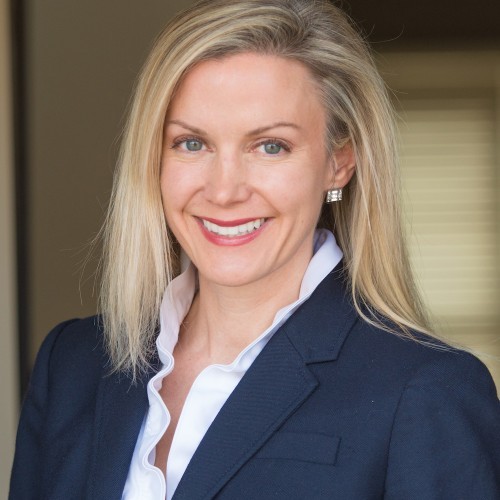
Rebecca Morley
Healthy homes and communities consultant, USA/UKRebecca Morley is an expert in improving the health of underserved places and populations. The substance of her work is on the factors outside of the healthcare system that affect health, such as the places people live, work, and play, and people’s ability to access the services and supports they need to thrive. Over five years, Rebecca helped the Robert Wood Johnson Foundation (RWJF) develop $55 million in grant programming for gender equity; community power; sustainable and equitable urban development; water; parks and urban greening; green infrastructure; and food justice. Before launching her consulting practice, Rebecca was director of the Health Impact Project, a collaboration of the RWJF and the Pew Charitable Trusts. She was director of the National Center for Healthy Housing (NCHH) between 2002 and 2014, where she led efforts to create safer and healthier environments for all people, with a special focus on children and communities who are disproportionately burdened by environmental public health risks. Ms. Morley also worked for the US Department of Housing and Urban Development and in the United States Senate.14.00Life-course socioeconomic disparities in access to public green and blue spaces for older adults
Ruoyu Wang
Research fellow, University of Essex, United KingdomDr Ruoyu Wang now is a Research Fellow in Institute of Public Health and Wellbeing, University of Essex. He used to be a Research Fellow in Centre for Public Health, Queen's University Belfast. He obtained a Ph.D in School of Geosciences from the University of Edinburgh in 2021. Ruoyu Wang mainly focuses on health geography research, pays special attention to the impact of urban built environment on various health indicators, and has in-depth research on the impact of urban green space on mental health.Life-course socioeconomic disparities in access to public green and blue spaces for older adults
Abstract Copy
In recent years, awareness has increased regarding socioeconomic disparities in access to natural environments. However, it’s still unclear how such disparities matter in different life stages. This study assessed the associations between life-course socioeconomic status (SES) and access to public green and blue spaces in older adults in Northern Ireland. The study analyses data from the Northern Ireland Cohort for the Longitudinal Study of Ageing. Distance between participants’ home addresses to the nearest access points of public green and blue spaces (park and garden, open space, nature reserve, woodland and blue space) was assessed using the GreenspaceNI Map. Life-course SES was assessed in childhood (self-reported childhood SES and childhood unemployment of parents), adulthood (education) and elderhood (Area-level Multiple Deprivation Measure and capital value of the housing), respectively. Multilevel linear regression models were used to assess the associations, and sensitivity analyses were conducted. We stratified the results by urban, intermediate and rural regions to test urban-rural differences. Participants with higher SES in childhood, adulthood and elderhood lived closer to different public green and blue spaces. Also, there are urban-rural differences in such associations.
Our findings have important implications for promoting environmental justice from a life-course perspective. First, policymakers should try to improve older adults’ access to different public green and blue spaces amenities. For example, more accessible points can be created for existing amenities and more new amenities can be planned in regions with fewer numbers of amenities. Second, our findings suggest that there are socioeconomic disparities in access to different public green and blue spaces for older adults. Therefore, more attention should be paid to socioeconomically disadvantaged groups. The government should try to monitor information on different life-course SES indicators for local older adults. Then, more investment in green and blue space amenities should be distributed to areas with more older adults with lower life-course SES. Also, since SES indicators matter across different life stages, it’s necessary to pay attention to socioeconomic disparities from people’s early childhood when the disparities haven’t yet accumulated greatly. Third, policymakers should implement different policies based on the level of urbanity of the region.Learning Objectives
- Participants will learn the older adults’ access to public green and blue spaces in Northern Ireland
- Participants will learn how older adults’ access to public green and blue spaces vary across different socioeconomic groups
- Participants will learn how older adults’ access to public green and blue spaces vary between urban and rural areas
14.20Delivering housing for health and climate change equity
Catherine Max
Associate, Future of London, United KingdomCatherine Max co-chairs the Future of London Health and Housing Impact Network. As an independent consultant, she helps organisations improve wellbeing and reduce health inequalities through strategy and action on social and environmental sustainability, place-making, urban design and related areas; and is a health and wellbeing expert member of the London Borough of Brent’s Quality Review Panel. With University College London Bartlett Faculty colleagues, Catherine conducts health and green space research and knowledge exchange. She led the development of Camden and Islington's Parks for Health Strategy; Camden and Islington NHS Foundation Trust's Green Plan; and planning and engagement strategies for Barking Riverside Healthy New Town. Catherine has been a trustee of a number of health, environmental and arts charities, most recently Sustrans. Previously, she was Lay Chair of NHS England’s Individual Funding Requests Panel (specialised commissioning) and a non-executive director of primary care trusts in East London.Delivering housing for health and climate change equity
Abstract Copy
This presentation draws on learning from the Health and Housing Impact Network, funded by Impact on Urban Health, which facilitates innovation and cross-sector collaboration for better health outcomes. Our focus this year is on the opportunities and challenges of providing housing which engenders health and climate change equity in tandem. We are exploring: what decisions can and should be made at each stage in planning, design, delivery and evaluation of housing; who needs to be involved and when, including residents and people with “lived experience”; the relative merits and return on investment of different options; what helps and what hinders good practice.
The presentation will share insight and experience from developing a decision-making map for policy-makers and practitioners, illustrated by case studies of award-winning schemes: King’s Crescent, Hackney (Karakusevic Carson Architects) and Waltham Forest’s Greenleaf Retrofit Home (Aston Group) as well as other sites in development with health and sustainability objectives, such as Selby Urban Village in Haringey.
Why is this needed?
Evidence is growing about what can and should be done in designing and building new housing as well as retrofitting existing stock to be climate resilient, reduce carbon emissions and promote wellbeing. However, our research shows that support is needed because there are knowledge gaps, misconceptions and barriers to delivery in practice. Upfront costs may seem prohibitive even when the case for ultimate return on investment is clear. There are multiple policies, standards and guidelines for sustainable building, with no overall consensus about what good looks like when climate change and health equity are considered together. We do not yet have the skills and capacity to deliver at pace. In addition, there are real and perceived tensions between some environmental and health objectives. For example, between the need for better insulation against cold (and by implication reduced heating bills), the importance of ventilation to reduce damp and mould, and the comparative environmental advantages of different technologies to make both these things possible. The reality is that trade-offs are likely inevitable but these should be transparent and underpinned by the best possible evidence. Our decision-making map will provide resources and guidance for use by all stakeholders throughout the process.
We welcome Congress participants’ contributions to further enrich the content of the map for stakeholders who wish to realise both health and sustainability benefits from retrofit and new-build schemes.Learning Objectives
- To deepen understanding of how to maximise both health and climate change equity through housing development and retrofit
- To share best practice and lessons learned from cross-sector experience of delivering housing which meets health, climate change mitigation and adaptation objectives in practice
- To inform the development of our tool for health and housing practitioners which will support evidence-based decision-making from planning to delivery
14.40A Scandinavian-designed neighbourhood in East London
Darren Wilson
Associate director, White Arkitekter, UK15.00Panel discussion15.30 - 16.00Video+Poster Gallery, coffee and networking16.00 - 17.00Session 11- The urban health impacts of construction
Amit Oberoi
Executive chairman, Considerate Constructors Scheme, UKAmit is a Global Risk Management Practitioner, with over 20 years hands-on cross industry experience in leadership roles in construction, technology, management consulting and national authorities. Amit currently works as Chief Executive at The Resilience Factor, a Mental Health Technology Company. He has previously worked for construction organisations including Lendlease and on large high profile infrastructure projects in locations in the UK, Middle East and Australia.16.00Better air for urban health: Innovation in the UK construction sector
Samuel Bradley
Senior environmental consultant, Arup, United KingdomSam is an air quality and odour technical expert. Sam uses his knowledge to deliver robust technical assessments of complex developments, whilst providing expert advice and guidance to the client on their design and mitigation strategies. Sam is experienced in monitoring, modelling and advising on mitigation and policy. He is a technical expert in air quality and odour impact assessments, dispersion modelling and emission calculations. Sam is experienced in undertaking technical work for local planning matters, Development Consent Orders, Environmental Permitting and research.Better air for urban health: Innovation in the UK construction sector
Abstract Copy
The construction sector has not kept pace with reducing emissions compared to other sectors. Therefore, the proportion of construction-related emissions has grown over recent years. Carbon emission reductions have been a recent industry focus, but it is also important to consider the air quality and health impacts. Consequently, the UK Government set recommendations in the Defra Clean Air Strategy to control onsite emissions via environmental procurement requirements. This project is the first to demonstrate how this could work and share lessons learned.
Arup began by developing an evidence base with industry stakeholders, to show what can be achieved in emissions reductions, based on current technology and the market availability of equipment. Arup identified the potential for 30-40% reductions in oxides of nitrogen (NOx) and fine particulate matter (PM10). Arup then turned this into a toolkit to provide the construction industry with a method to test equipment emissions (e.g. alternative fuel options), identify optimal scenarios, and demonstrate compliance with reduction targets and standards.
To test the toolkit, Arup worked with Southwark Council to develop environmental procurement requirements and contract clauses for its Tustin Estate development in south London. These clauses obligated the developers to commit to a 30% emissions reduction in NOx and PM10. The chosen developer, Bouygues, committed to this at no additional cost to the project. Arup worked with Bouygues to implement the requirements. Bouygues is currently performing better than the current 30% goal, providing confidence that the overall 30% reduction goal will be met at the end of their project.
Arup’s toolkit and approach have been recognised as innovative and industry-leading by the UK Government, and noted as a success story in the UK Chief Medical Officer 2022 report on air pollution. Arup has created both a scalable solution and a platform for industry consultation, to be shared widely to support and influence future policy and legislation. The toolkit has already presented the evidence needed to realise wider health benefits in terms of emissions reductions and will further demonstrate the need to unlock future innovation in the construction sector. With the toolkit now live, firms across the industry will have access to this free-to-market, innovative, sustainability product that allows site managers to plan, set and monitor emission targets to go beyond compliance, and drive emission reductions from construction, helping tackle the climate and air quality emergency.Learning Objectives
- 1. Understand how developers, construction firms and site managers can reduce on-site carbon and air pollutant emissions through design and planning and how to prioritise measures based on their impacts to emission reductions
- 2. Gain a better understanding of how environmental procurement requirements and contract clauses can be used to drive change
- 3. Gain a sense of some of the challenges and opportunities for driving changes in practices across an entire industry
16.20The health impacts of cumulative construction: Marsh Wall, London
Michele Young
Development coordination team leader , London Borough of Tower Hamlets, United KingdomMichèle Young has over 16 years’ private sector experience as a qualified Architect working on design and delivery of commercial office and education projects, in the UK and Europe. Between 2010-2020 she worked in the international humanitarian and development sector as Asia Regional Shelter and Construction Adviser for Save the Children International. Work focussed on the delivery of emergency shelter, housing (permanent) and social infrastructure (re)construction in a variety of contexts (Africa, the Middle East, Asia and the Pacific). Since December 2020, she has been employed as a Development Coordination Manager in the Infrastructure Planning team at Tower Hamlets council. The role was created to establish whether the council has a role in proactively facilitating innovative and practical solutions to tackling the combined negative impacts of construction on residents and businesses at an area wide scale.
Christopher Ali-Hempstead
Development coordination officer, London Borough of Tower Hamlets , United KingdomChristopher Ali-Hempstead has a BA in Town Planning and over 20 years’ experience of working for several local planning authorities within London, specialising in planning applications and planning enforcement. He joined Tower Hamlets 5 years ago as a Planning Enforcement officer. He has been with Development Coordination since March 2021 working on projects including: the Health Impact Assessment (HIA) for Marsh Wall, documenting a green hoarding pilot case study, identifying land for a range of vehicle parking or material storage uses, defining a communication strategy and developing the council’s first Construction Awards programme.The health impacts of cumulative construction: Marsh Wall, London
Abstract Copy
London has 32 local authority districts (boroughs) that make up Greater London. This abstract will focus on the London Borough of Tower Hamlets (LBTH) in east London.
Since 2021, a newly formed Development Coordination team have focused on developing strategic solutions for improving construction coordination through a variety of evidenced interventions.
Thesis statement: Identify the health and wellbeing impacts that long term cumulative construction activity has had on the amenity and people who live, work and visit Marsh Wall, and to outline how current measures that address health impacts of construction could be altered to improve health outcomes in the future.
Marsh Wall was selected because of the area’s continuous development over the past 20-30 years since the establishment of Canary Wharf in the late 80s and early 90s.
Methodology: The research does not follow the standard structure for a health impact assessment (HIA). Instead, this research focuses on the impacts of construction phase activities on human health rather than the impact on health of a completed development project. To the best of our knowledge, this has not been previously undertaken.
The research focused on:
A review of existing literature, policy and guidance;
Planning data gathered, available site information, scale and timeframe for development delivery over a period of 15 years;
A baseline assessment of publicly available data on health outcomes and determinants;
Identification of health impacts relative to developments; and
Stakeholder engagement focused on identifying recommendations for mitigation methods.
Results:
A summary of how construction impacts health;
A review of the evolving landscape of development in the study area and subsequent impacts identified on residents living and working within the study area; and
Identification of recommended mitigation practices relative to thematic areas of work (environment, transport, employment, crime, health and safety).
Conclusions:
Provide consistent and centralised access to construction information for residents;
Site monitoring of impacts is important to residents and results should be shared with residents;
Mitigation measures varies widely between different sites; best practice needs adoption across all sites;
Lack of oversight of contractors needs addressing to reassure residents policy and guidance are being enforced;
Not all negative impacts can be avoided or mitigated; further appraisal, monitoring and review are required.
The implications of these findings have been fed into local policy and guidance, as well as forming the platform from which regular council-led coordination meetings and additional support services have been established.
Learning Objectives
- Understand the health impacts of cumulative construction activity and related concerns of resident communities around the borough
- Understand the scale of impact of development around Marsh Wall
- Practical insight into where the Development Coordination team need to focus with respect to protecting residents in both policy and practical action
16.40Panel discussionEnd of Green, clean and equitable cities stream -
Urban mobility, ageing and accessibility
Space 9
10.45 - 12.30Session 12- Planning urban mobility and active travel
Clare Wildfire
Global practice lead of cities, Mott MacDonald, UKClare is global practice leader for cities at Mott MacDonald. She is passionate about using cross-disciplinary synergy and integrated systems thinking to enable more people to be accommodated in urban areas for less cost, consuming less energy, materials and water, emitting less CO2, and cutting waste, while achieving an enhanced quality of life. She brings a practical understanding of sustainable development drivers and processes at both macro and micro level, gained through nearly 30 years as a low-energy engineer in the built environment. Combining this with engagement at policy level, she is able to bring insight into the technical, political, financial and behavioural aspects of sustainable development, particularly in areas of energy efficiency and thermal masterplanning in the built environment. Her role is often to lead stakeholders through a process of objective setting and risk assessment, where her ability to apply clarity and sensitivity in the fast-moving cities area allows decisions to be taken in an informed manner despite a lack of precedent or future certainty. In particular, working for both private-sector developers and city municipalities has given her a valuable understanding of how to align objectives and optimise outcomes.10.45Active transport in regional Australian cities: Aspirations or action in council policies?
Melinda Covey-Hansen
PhD student; Research assistant, University of Southern Queensland, AustraliaMelinda Covey-Hansen is a seasoned Health Promotion Practitioner, bringing over 15 years of experience to the forefront of her work in shaping healthy and active communities. Specialising in impactful policies, plans, and programs within local government, Melinda has been both a leader of and contributor to numerous healthy and active living, transport and recreation initiatives. Melinda is currently completing a PhD with the University of Southern Queensland, focusing on active living, transport and recreation policy in local government. Melinda is also a research assistant with the University of Southern Queensland, contributing to various system-mapping, citizen science, health-supportive environments and community-led research projects aimed at creating healthy and active communities.Active transport in regional Australian cities: Aspirations or action in council policies?
Abstract Copy
Thesis statement:
This study reveals how closely council policies align with evidence-based recommendations for promoting active transport in regional Australian cities.
Methodology:
This study is part of a larger research project exploring Australian council's active living, transport, and recreation policies. A validated survey was distributed to Australian councils (n=250) with cities or towns exceeding 10,000 residents, resulting in 57 responses from 52 councils. Survey questions related to active transport covered governance, demand management, public transport, walking and cycling infrastructure, traffic safety, investment by mode and democratic policy domains.
Two regional Queensland councils were selected as case studies based on demographic similarities. Councils’ websites were searched to verify survey responses and to collect policy data. The analysis compared survey responses and policy data collected to evidence-based recommendations to determine policy alignment with the evidence-base.
Results:
Both councils support walk and cycle friendly environments through multiple policies. They prioritise walking and cycling and set infrastructure standards, but neither council’s investment in active transport infrastructure meets the recommended minimum of 20% of transport budgets. Both councils identify main cycling networks. One council identifies a main walking network, which together with their comprehensive active transport strategy, increases access to funding and grants. Neither council sets walking or cycling participation targets.
Walkable distances are required between residences and public transport stops, and access in new communities is prioritised. Although neither council have policies requiring access to high-frequency services, one council promotes an equitable public transport system in their planning scheme, and their transport policy advocates for mobility-as-a-service technology to address low-demand areas. Neither council sets public transport usage targets.
Minimal policies support slow or low-traffic neighbourhoods, streets, or areas (such as around schools and activity centres). However, progress is evident through policy recommendations for ‘movement and place’ frameworks, and one council recommends slower speeds and shared street designs in residential areas. One council adopts community participatory approaches to active transport planning, with more community members than Councillors on its advisory committee.
Conclusions and implications:
Regional Queensland councils are adopting or progressing evidence-based policies, but critical deficits remain. Despite prioritising walking and cycling, investment and participation targets fall short. Comprehensive active transport planning increases funding opportunities. Ongoing advocacy and innovative approaches enhance equitable public transport. Progress on community participatory approaches and movement and place frameworks is positive, but stronger policies for slower speeds and shared streets are needed to increase active transport.Learning Objectives
- Understand the alignment of regional Queensland councils’ policies with evidence-based recommendations for active transport.
- Recognise the necessity of implementing robust, evidence-based policies to genuinely support active transport.
- Explore strategies for improving active transport policies within local government.
11.05Prioritising health in mobility planning: Assessing sustainable urban mobility plans in Europe
Hannah E. Murdock
PhD candidate, Imperial College London, United KingdomHannah E. Murdock is a PhD candidate in the Centre for Environmental Policy at Imperial College London and the Grantham Institute on Climate Change and the Environment, focusing on policy measures and behaviour change for decarbonising transport while maximising co-benefits. She also serves as co-Lead Author for the SLOCAT Transport and Climate Change Global Status Report and is a Research Partner with REN21 - the Renewable Energy Policy Network for the 21st Century. In her more than 12 years working in the energy and transport sectors, she has held various research roles working within NGOs, international organisations, academia, and consulting. She has authored or co-authored over 30 publications, contributed as an advisor or reviewer to innumerable others, served on several international advisory boards, guest lectured in postgraduate programmes in Europe and the US, and has made frequent presentations and keynote addresses at conferences around the world.Prioritising health in mobility planning: Assessing sustainable urban mobility plans in Europe
Abstract Copy
Transport can have detrimental impacts on health and quality of life, but can also be an opportunity for health promotion, e.g., through walking and cycling. While health impacts of transport are well known, the extent to which health is considered in mobility plans is less obvious. Few studies to date have tried to empirically investigate the degree to which health has been incorporated into transport planning and specifically SUMPs, and none have done so across the entire European region.
Methods: We assess the extent to which health is reflected in SUMPs in 230 European cities, with regard to: i) key health and health equity terminology; ii) how explicit transport pathways to health are made; iii) whether health is operationalised into targets and key performance indicators (KPIs); and iv) how well the health-rationale of various actions and measures is elaborated. We analysed the latest SUMPs in the Eltis database of urban mobility plans with a quantitative text analysis, supported by the development of a health dictionary and a policy analysis checklist. We also carried out a qualitative analysis of a purposive sub-sample to verify the validity of the quantitative approach and provide further nuance to the assessment.
Results: 230 SUMPS (published 2006-2023) from 31 countries and 22 languages were usable for quantitative text analysis, from which 13 were included into qualitative analysis, reflecting a range of city sizes, countries, and focus on health. The findings show that while health is often touched upon, and its prominence seems to be increasing, SUMPs miss out on the opportunity to embrace mobility as a driver of health promotion. The link between transport and equity and social and mental wellbeing is not frequently discussed. Detailed targets and KPIs for several health pathways are scarce or missing, as are the health rationale and outcomes for proposed measures. Health aspirations are concerned with minimising detrimental impacts of transport on health, primarily from traffic injuries and to a lesser extent from air pollution. Concepts such as accessibility and active travel feature prominently but are not explicitly identified as an opportunity to enhance health.
Conclusions: Urban mobility plans across Europe miss an opportunity to embrace health as a means to engage across sectors and society to help promote transformative urban sustainability policies. At the same time, national government support for developing SUMPs is missing out on the opportunity to include requirements to promote health in cities.Learning Objectives
- The state of inclusion of health and equity content in SUMPs across Europe
- How different countries compare in their health and equity inclusion in SUMPs
- Top health- and equity-related concepts of interest to cities in mobility planning
11.25The Pathways Project: A better national system for walking, wheeling and cycling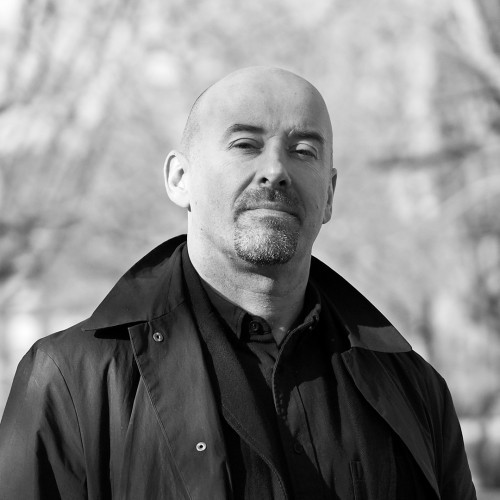
Tim Fendley
Founder, CEO and creative director, Applied Information Group, United KingdomFounder and Creative Director of Applied, Tim Fendley is a designer with over 30 years experience creating innovative wayfinding systems for some of the world’s most important cities, campuses and cultural institutions. Tim has extensive experience in innovation, communication, wayfinding and digital design alongside a passion to simplify people’s lives. Seeking to understand how design can change behaviour for the better, Tim is devoted to helping people discover more, be braver and feel less lost. Tim’s company Applied creates projects which push the boundaries of information design and make our cities and communities more understandable. For example, Legible London was created to make London the most walking-friendly city. The unified walking system has a higher proven impact than any other and has become the international standard for citywide wayfinding. Tim is a tireless speaker and campaigner for the development of accessible wayfinding systems for public places. He has spoken on the subject at the London School of Economics, Reading University, Sign Design Society and the International Institute for Information Design in Vienna. Tim is also an advisor to the Helen Hamlyn Centre for Design at the Royal College of Art, and an editorial board member of IIID.The Pathways Project: A better national system for walking, wheeling and cycling
Abstract Copy
We need to build a healthier, more active and inclusive society. According to Sport England, one in four people in this country do less than 30 minutes of physical activity a week. This high level of physical inactivity costs the UK Government around £7.4 billion annually, and is associated with one in six deaths.
The question is not if activity is good for society, individuals and the economy, but how do we help people be more active. The Government has set ambitious targets to tackle this, including getting more people walking and cycling. But, at present, this is underfunded and the £2bn that has been spent has had no proven impact. The UK Government spends around £11 billion a year on roads. In terms of active travel, the estimated total spend in the nine years from 2016 to 2025 is £6.6 billion. Walking and cycling is getting the crumbs from the table. We have a world-renowned best-in-class wayfinding system for our roads, why don’t we have one for walking and cycling?
The Pathways Project is an overarching initiative to create a new national standard; empowering everyone to walk, wheel and cycle with more confidence. To help dramatically increase activity. With research showing that 42% of people aged 55 and over are inactive, compared to 29% of the younger adult population, the initiative specifically addresses the needs of an ageing population. The premise is that if it works for older people, it’ll work for everybody.
The creation of a new national standard cannot be achieved in one go. The project team has adopted a visionary, experimental philosophy to achieve these goals. This talk will outline what a new national standard for walking, wheeling and cycling could be. It will explain how this standard can be rolled out through the country in the form of a toolkit. It will show how, with the use of neuroscience, agile methodologies and nudge theory, the UK can be the world leader in active travel innovation.Learning Objectives
- Raise the level of debate about the impact of these types of measures. How they can tackle significant problems in comparison with the fixation on investing in hard infrastructure.
- Uncover and explain how to work with the public’s choice architecture. How small ‘nudges’ can be more effective that financial or infrastructure incentives/controls to create true behaviour change.
- To outline how to scale a core concept across the whole of the country. One-off good examples are not enough. Quality standards need to be rolled-out to a high enough standard everywhere.
11.45Liverpool Baltic Station – designing major infrastructure for urban health
Tom Roberts
Technical principal for urban design, Mott MacDonald, UKTom is a Technical Principal for Urban Design at Mott MacDonald Cities Studio. He is an award-winning planner and designer with a wide field of experience across urban strategy, public realm, active travel and economic development. He is an experienced leader of high-profile projects, most recently including the urban integration strategy for Liverpool Baltic Station, and the long-term masterplan for Deansgate, Manchester. He is a guest lecturer at the University of Liverpool, and frequent contributor to trade press. He is a passionate urbanist and active travel advocate.Liverpool Baltic Station – designing major infrastructure for urban health
Abstract Copy
Liverpool Baltic Station is a new city centre railway station, planned to open on the Merseyrail Northern Line in 2027. The £96m investment will also deliver a wide range of supporting urban infrastructure, transforming the southern gateway to the city. The new destination station will better connect city and community, support the continued growth of the city economy, and support the city’s transition to net zero. Up to 4 million passengers are expected annually from opening year and significant growth is anticipated in future.
The Baltic Triangle – named the UK’s ‘coolest neighbourhood’ by Time Out magazine – is home to a wealth of creative and digital industries, a growing residential community, and a leisure, food and hotspot. In contrast, nearby neighbourhoods of Dingle, Toxteth and Princes Park still present high levels of deprivation, worklessness, disability and long-term health conditions.
This session will explore how the station, public realm and surrounding street network have been designed to the highest standards of accessibility, to promote social equity and foster long-term benefits for health and climate.
The station is designed to the highest standard of accessibility. Proposals include a mixture of lifts and escalators, and level-boarding trains, which wheelchair users can use independently. Fully accessible public and staff toilets, a ‘Changing Places’ toilet, an RNIB-approved tactile map, and 24/7 defibrillator. The station is designed to be BREEAM rating of ‘Excellent’. The roof features south facing solar photovoltaic panels to power the station, and rainwater harvesting for use of non-potable water.
Externally, the pedestrianisation of two existing road will allow the creation of a new station forecourt. This will be a green, convivial public space where people can meet and interact. Plans also include the introduction of extensive rain gardens and planting to support sustainable drainage and flood water attenuation. A range of tree species will maximise biodiversity, climate resilience and improve air quality. Complementary moves to reconnect the city, heal highway severance, and reduce road danger are fundamental to the success of the station. The delivery of wider walking and cycling will support and encourage more active lifestyles and incidental exercise.12.05Panel discussion12.30 - 14.00Video+Poster Gallery, lunch and networking1.400 - 15.30Session 13- Air quality, transport and health14.00Bikes for Business: Zero-emission cargo bikes transforming London Bridge
Jack Skillen
Director of sustainability and place, Team London Bridge, United KingdomJack Skillen has been integrating fields of place management, sustainability and active travel since completing his MSc in City, Space and Society in 2004. In his role as Director of Sustainability and Place at the London Bridge business improvement district, he set up the Bikes for Business programme in 2018, alongside other priorities of green infrastructure, the Low Line and working towards being a net zero business district. On Saturdays, he coaches under 15 football.Bikes for Business: Zero-emission cargo bikes transforming London Bridge
Abstract Copy
Cargo bikes can offer a fast, clean alternative to motorised deliveries in London. This is particularly critical when transport is the largest emitting sector of greenhouse gas in the UK. Working with businesses in London Bridge and around London’s Low Line corridor in Southwark, the Bikes for Business project has been making zero-emission cargo bike deliveries a mainstream solution for business freight since 2018. In that time over 200 businesses have been supported to make a switch to cargo bikes, making London Bridge one of the world’s leading centres for sustainable deliveries.
This was the first project of its kind in the UK. Initially, it received TfL seed funding, before being scaled up to a wider geographic area until 2023, supported by Impact on Urban Health (IOUH). The project included:
• A directory of cargo bike services available to businesses;
• One-to-one advice to more than 1000 businesses; and
• A subsidy to incentivise the switch to a cargo bike service or purchase of a bike.
During the IOUH funded phase, which was evaluated by Just Economics, we learned a lot about the impact of the project:
• 150 businesses either purchased a cargo bike or tried a service. Annual carbon savings attributable to 34 bike purchases was estimated at 16.9 tonnes. Satisfaction ratings were at 90%.
• Services on bikes included courier, stationary, waste, cleaning, electrical, catering, flowers and laundry.
• Businesses purchasing bikes included food production, dog walkers, architecture and a financial firm.
• Three particularly high-frequency switches included the movement of samples between hospital sites, waste and Amazon.
Reported benefits to businesses included environmental sustainability, efficiency and brand benefits. When bikes were purchased, there were staff satisfaction and wellbeing benefits – particularly linked to reduced time and stress parking or getting tickets.
Bikes for Business has transformed how businesses do deliveries in London Bridge. The publicity from the project, particularly the annual Cargo Bike Cruise involving up to 30 operators on a tour of London, has helped influence the Mayor and accelerate the pace of change in London (and inspired growth in BIDs across the UK). This has had positive impact on streets, air, emissions, and on business.
Learning Objectives
- Participants will be able to describe the range of health, social, economic and environmental benefits of switching from motorised vehicles to zero emission cargo bikes at a local neighbourhood scale
- 2. Participants will gain insight into some of the challenges associated with rolling-out and scaling up of a new technology
- 3. Participants will gain insight into some of the success factors associated with rolling-out and scale up of a new technology.
14.20Selling the sizzle: Lessons for future clean air zone implementation
Cathy Knamiller
Senior research fellow: Participatory Research, Healthy Urban Places, Bradford Teaching Hospitals NHS Foundation Trust, United KingdomCathy is a senior Research Fellow at Born in Bradford leading on participatory research in the Healthy Urban Places consortium. She has a very diverse work background which includes working as a community worker in Bradford for many years, being a volunteer coordinator and an English language teacher in various parts of the world. Her educational background includes a MSc in Sustainable Development and a PhD with the theoretical focus on environmental behaviour change.Rosie McEachan
Born in Bradford director, Bradford Institute of Health Research, United KingdomRosie McEachan is the Director of Born in Bradford and a proud (Scottish) Bradfordian. She is an experienced applied health researcher with particular interests in cohort studies, development and evaluation of complex interventions, environmental determinants of health, green space, air quality, and co-production. Rosie holds a visiting professor position at University College London and an honorary chair position at the University of Bradford.Selling the sizzle: Lessons for future clean air zone implementation
Abstract Copy
Clean air zones (CAZ) are increasingly seen as an answer to tackling air pollution in cities. Very little research has been carried out on stakeholder adaptation to and acceptance and attitudes towards the zones. Yet there are incidences where public challenges to CAZs pre-implementation have led to the postponing or cancellation of zones or similar traffic measures (Edinburgh congestion charge, Manchester CAZ) and a rise in resistance towards traffic demand management measures. For traffic demand management measures to work in the future, we need a deeper understanding of the experiences of stakeholders.
This research aims to explore: stakeholder adaptation to and acceptance and attitudes towards a clean air zone following implementation; barriers, enablers and unintended consequences to acceptance; and recommendations for future implementation of CAZs.
Methodology: We explored the impact on stakeholders following the launch of the Bradford CAZ. At least six months to a year after the launch we held ten qualitative focus groups with residents and 20 semi-structured interviews with people whose work or livelihood had the potential to be directly affected by the CAZ. All focus groups and interviews were audio recorded, transcribed and an inductive approach was used for thematic analysis, followed by an application of results to theory to provide a deeper understanding.
Results: There was universal acceptance that health needs to be improved but a general negativity towards the clean air zone. Larger companies can and will adapt to the changes. People from lower incomes are proportionately disadvantaged despite measures to prevent this. Issues other than air pollution are frequently more present, pressing and prioritised. There is a lack of understanding of CAZ aims, categories and locations, fuelling negativity. More extensive and improved communication about CAZs could improve understanding of and attitudes towards the intervention.
Conclusion: Communication needs to be improved, including positive health messaging, early messaging of information other than air quality statistics, and consideration of the sources of information. Further consideration needs to be given to measures to reduce financial impact on low-income groups. Further qualitative research and community co-production should be used to provide further understanding to improve CAZs and other traffic demand management measures.
Learning Objectives
- 1. Stakeholder adaptation to and acceptance and attitudes of a clean air zone following implementation
- 2. Barriers, enablers and unintended consequences
- 3. Recommendations for authorities implementing clean air zones in the future.
14.40Emerging practice in community-based innovation: Improving indoor air quality and wellbeing at home
Frances Lobel
Project manager, Home Monitoring for Wellbeing, Repowering London, United KingdomFran Lobel is a project manager at Repowering London, a not-for-profit community energy development organisation. She led on participant engagement for Home Monitoring for Wellbeing (HMW), a pilot study exploring practical, community-based approaches to facilitating low-income households to improve their indoor air quality and wellbeing at home. Fran lives and works in the community where HMW and other Repowering London schemes are embedded; she has provided energy support to residents, and training for health and social care professionals on consumer energy rights and the health-impacts of energy crisis. She has particular expertise in rights and protections for prepayment meter households.Tim Minshall
Data scientist, Home Monitoring for Wellbeing, Repowering London, UKTim Minshall is a software engineer at Repowering London, a not-for-profit community energy development organisation. He led on data analysis and visualisation, as well as smart meter data collection automation for the Home Monitoring for Wellbeing (HMW), a pilot study exploring practical, community-based approaches to facilitating low-income households to improve their indoor air quality and wellbeing at home. Tim builds digital tools to manage and leverage data for the efficient operation of energy and innovation projects. He has a background in renewable energy engineering and climate science, having worked as a wind resource analyst designing offshore wind farms. He now works as a data scientist and software engineer. With experience in both startups and corporate environments, Tim is passionate about using technology to support social innovation, rather than trusting market-driven technological solutions.Emerging practice in community-based innovation: Improving indoor air quality and wellbeing at home
Abstract Copy
This case study will present emerging practice around how to support low-income and vulnerable households to improve their indoor home environment. It will present pilot activities, outcomes, and learnings from the Home Monitoring for Wellbeing (HMW) project, led by Repowering London – a community energy organisation working with low-income communities in South London.
Poor indoor air quality (IAQ) and costly energy use disproportionately affect those from low-income and minoritised ethnic households (GLA, 2019). Moreover, some home environment advice for households with respiratory illness contradicts general energy efficiency and affordability advice, increasing energy costs and financial strain. HMW partners applied a community-based approach to supporting low-income households with IAQ and related wellbeing challenges, which involved a participatory design to ensure interventions were co-designed with residents and tailored to their circumstances.
The pilot explored practical approaches to monitor and address poor IAQ, support energy needs, inform and capacitate participants, and overcome specific challenges in the home that affect health, wellbeing, and comfort. Some 16 participants were recruited from two social housing estates in Brixton. Almost all participant households have one or more members with health conditions affected by IAQ or lack of affordable warmth.
Highlights of the community-based approach included:
• Remote monitoring equipment enabling residents to understand and control temperature, relative humidity, energy consumption, CO2, PM2.5, and TVOC.
• Tailored reports and advice for residents based on the data collected.
• A budget for residents to choose IAQ interventions.
• Emphasis on learning about residents’ attitudes to – and experiences of – IAQ, to complement the monitoring data.
Final evaluation is ongoing, and will include key learnings around:
1. How to work responsively with low-income households to improve IAQ, capturing the wider wellbeing benefits.
2. How to facilitate knowledge and agency with vulnerable households in making long-term decisions about their home environment.
3. Developing a manner of service delivery that builds trust with residents and can be incorporated into wider retrofit offerings.
4. The potential role of and scope for the work of community organisations within a broader ecosystem of stakeholders – including social housing providers and local authorities – and how the work of community-based organisations needs to sit alongside much-needed regulation and enforcement.
Findings from this pilot will have implications for emerging practice in collecting robust IAQ data and for processes and services that work collaboratively with low-income and vulnerable households to improve their home environment, including large-scale retrofit programmes and health trusts involved in social prescribing.Learning Objectives
- Identify opportunities to support better indoor air quality and temperatures in low-income households, improving health and reducing energy costs
- Understand the importance of building trust with residents as they make long-term decisions about their home environments
- Describe participatory co-design techniques that ensure interventions are tailored to the specific needs of residents
15.00Panel discussion15.30 - 16.00Video+Poster Gallery, coffee and networking16.00 - 17.00Session 14- Designing for accessibility
Rachel Cooper PhD
Professor of Design Management and Policy, Lancaster University, UKRachel Cooper OBE is distinguished professor of design management and policy at Lancaster University. She is a director of ImaginationLancaster, an open and exploratory design-led research centre conducting applied and theoretical research into people, products, places and their interactions, and also chair of Lancaster institute for the Contemporary Arts. Professor Cooper’s research interests cover: design thinking; design management; design policy; and across all sectors of industry, a specific interest in design for wellbeing and socially responsible design. She has published extensively on these topics, including books 'Designing Sustainable Cities'. She was founding editor of The Design Journal and also founding president of the European Academy of Design. She is currently president of the Design Research Society.16.00The strategic implementation of universal accessibility in government
Robin Dawson
Architect , NORR Architects & Engineers, CanadaRobin Dawson has been involved in a wide variety of projects in the government, residential, commercial, cultural and hospitality sectors. Robin is highly skilled in architectural design and experienced in all phases of project delivery. She specializes in the design construction documentation process for complex projects in cost-conscious environments. Robin is process oriented and seeks to resolve problems through collaboration and engagement to ensure overarching goals and objectives can be obtained. Robin also performs a Project Manager role, collaboratively managing large teams of peers, consultants, stakeholders, and agencies for on-time delivery. Robin provides guidance and advice to develop feasibility assessments and direct Clients in better understanding the direction of the project. Robin has been working on projects within the Parliamentary Precinct for the past few years, specifically providing guidance on accessibility within the Precinct.The strategic implementation of universal accessibility in government
Abstract Copy
The Government of Canada is seeking to modernise and rehabilitate the Parliamentary Precinct. While there have been many accessibility improvements, there is an opportunity to further advance towards a Universally Accessible Precinct. As the Parliamentary Precinct in Ottawa is home to Canada's Parliament, representatives gather to make laws that affect the lives of every Canadian. As such, it becomes much more than just a place for governance; it becomes a place to meet, celebrate, and visit, encompassing the essence of community and inclusivity.
Public Service and Procurement Canada (PSPC)’s mission is to pursue compliance with Universal Accessibility (UA) within the Precinct. NORR Dialog has been working with the UA Team of the Science and Parliamentary Infrastructure Branch (SPIB) of PSPC to develop a UA Strategy.
To achieve UA in the Precinct, the following process was undertaken:
1. Benchmark/background research, including international research on design practices/precedents, identification of access solutions, facilitating wayfinding and accessing information, as well as policies/practices.
2. Vision statement and goals through the process of stakeholder engagement.
3. Compilation of Universal Accessibility Best Practices (UABP) from around the world, incorporating design objectives, scope, and technical requirements.
4. Grounds/building assessments to determine current level of UA for all types of users.
Immediate impacts of this work have been the implementation of UA within the Precinct. NORR Dialog has developed programme of work (PoW) packages, which outline UA scope requirements for implementation. The scope is being undertaking through means of “quick fix” elements that have immediate impact on users, and others incorporated into larger rehabilitation projects.
The Government is continuously supporting UA initiatives through means of:
1. Community engagement through an accessibility advisory panel to provide updates on initiatives, obtain feedback from those who have lived experience with a disability.
2. Referencing updates to evolving standards to remain "current", including Accessible Standards Canada.
3. Incorporation of UABPs into design at the onset for new projects within the Precinct.
4. Rick Hansen Foundation Certification of buildings within Parliament.
Learning Objectives
- What is Universal Accessibility?
- User Diversity and Impacts of Equity and Inclusivity
- Provide Awareness and Education
16.20Accessible design for vulnerable populations in Thailand: An analysis of accessibility for cognition
Warawoot Chuangchai
Instructor, Chulalongkorn University, ThailandDr. Warawoot Chuangchai is currently a visiting fellow at the Centre for Research in the Arts, Social Sciences and Humanities, University of Cambridge. He holds a PhD in medical engineering and is a former visiting PhD student at the Oxford Institute of Population Ageing, University of Oxford. He received postdoctoral fellowships for research projects involving heart-brain connections, ergonomics, urban green spaces, and inclusive design. As an interior architect, he worked in a senior position in design firms where he specialised in hospitality and hotel design for more than seven years.Accessible design for vulnerable populations in Thailand: An analysis of accessibility for cognition
Abstract Copy
Background: For the first time in 16 years, Thailand has recently modified its accessible design to better accommodate vulnerable populations. Being able to safely utilise public services, buildings, and spaces is a prerequisite to participating in social activities for vulnerable people, particularly individuals with cognitive challenges whose needs have often been neglected.
Purpose: This qualitative study aims to examine accessibility for cognition by focusing on public uses based on Thailand’s ministerial regulation on accessible facilities for the elderly and people with disabilities.
Methods: The recent version of the ministerial regulation, covering the first (2005) and second (2021) issues, was summarised. The accessibility was compared between cognitive (60 years and older with mild cognitive impairment or dementia) and normal ageing groups, as well as cognitive (i.e., intellectual and learning impairments) and non-cognitive (i.e., visual, hearing, physical/mobility, autism, and emotional/behavioural impairments) disability groups.
Results: Cognitive ageing and disability groups had the least accessibility in public facilities and places when compared to their non-cognitive counterparts. The disability group was considered to have more limits in terms of accessibility due to their dysfunctions and severities than the ageing group. Only four locations contained related concepts of accessibility for cognition: Clause 6 in Chapter 1 (Accessible Facility Sign), Clauses 8.8 and 10.8 in Chapter 2 (Ramp and Lift), and Clause 11.5 in Chapter 3 (Stairs). The scopes were restricted to signage and emergency alarm system contents, which were linked to language and visuospatial cognitive functions, but none were directly relevant to specific cognitive domains. Unsurprisingly, normal ageing and wheelchair users were more likely to achieve a better degree of accessibility, followed by people with visual and hearing disabilities.
Conclusions: Although accessible design for vulnerable populations took over a decade to develop, Thailand has yet to effectively address accessibility for people experiencing cognitive ageing and disabilities. These challenges will be more pronounced when dealing with people who are advanced in age or suffer from severe cognitive conditions, and even worse when both occur together. This study suggests that Thailand needs to pay greater attention and incorporate a more significant cognitive approach into each chapter in order to expand its accessibility. Public amenities and areas where difficult decisions must be made, multiple perceptions must be balanced, and motor skills must be performed under time constraints should all be provided with safe and sustainable solutions.Learning Objectives
- Accessibility for cognition is necessary for public design guidelines as a national accessible standard, particularly in undeveloped nations, including Thailand.
- Cognitive performances, functions, and domains should all be taken into account when considering accessible design and requirements.
- A cognitive approach for vulnerable populations should not only provide an accessible design for first- or one-time use, but also address their recurring and long-term use, as well as potential consequences.
16.40Panel discussionEnd of Urban mobility, ageing and accessibility stream -
Workshops
Space 4 & 5
14.00 - 15.30Session 15- Testing a strategic framework for enhancing resilience and reducing health and climate vulnerability14.00Testing a strategic framework for enhancing resilience and reducing health and climate vulnerability
James Shearman
Head of innovation, Impact on Urban Health, UKJames is Head of innovation at Impact on Urban Health, an independent urban health foundation committed to building health equity and making cities healthier places for everyone to live. An On Purpose Associate, he previously spent ten years in the private sector building a sports agency and has spent time living in the Caribbean, London and Melbourne. He led on the development and implementation of Impact on Urban Health’s climate strategy and has mobilised funding and resource at the intersection of health, racial equity and climate justice. He currently sits in the Innovation Team where his work focuses on the future of urban health, with a specific focus on community-led asset ownership as a mechanism for building wealth in underserved communities.
Shira de Bourbon Parme
Urban wellbeing and innovation lead, Ramboll, UKShira de Bourbon Parme, DPhil, MSc, is an urban development planner and social anthropologist dedicated to advancing place-based spatial and social sustainability. In her role within Ramboll's Regenerative Cities Team, she partners with public and private sector stakeholders to develop and deliver integrated urban strategies that foster liveable and resilient environments, nurturing human and planetary health. Her work is grounded in vulnerability-sensitive approaches to drive health, social and spatial equity. Shira holds a doctorate from the Future of Cities programme at the University of Oxford. She serves on the Advisory Board for the University of Birmingham’s Centre for Urban Wellbeing. She has delivered annual lectures for University College London’s MSc Health in Urban Development and the University of Cambridge’s Future of Roads Programme. Notably, Shira led the development of Neighbourhood Futures, a framework for climate resilience and health equity, in collaboration with Impact on Urban Health, and conducts ongoing research on urban planning and social infrastructure for ageing populations.Testing a strategic framework for enhancing resilience and reducing health and climate vulnerability
Abstract Copy
From air pollution to excessive heat, climate change is already harming the health of urban residents around the world – and those who have done least to contribute to the problem are exposed to the greatest risks. There is an urgent need for effective, compelling research methods and practical, strategic tools to support local authorities, city government, community-based organisations, and funders in adapting to climate change and addressing health-related vulnerabilities at the neighbourhood level.
This workshop will give participants the opportunity to:
a) Learn about a research project combining citizen monitoring and journalism to capture and share the experiences of how a diverse range of London residents are experiencing heat in their homes.
b) Explore a visual representation of the health and heat climate vulnerabilities of a specific neighbourhood in Southwark, London, developed through a built environment assessment and digital modelling.
c) Discuss and test a five-stage strategic framework for identifying a series of actionable, incremental steps to reduce climate-related health vulnerabilities at the neighbourhood level.
The framework addresses five “capacities of resilience”: threshold, coping, recovery, adaptive, and transformative. It emphasises the importance of connecting local community needs and assets to the larger-scale capabilities of city governments and other system actors, to shape more inclusive and health-driven decision-making. Participants will be invited to apply the framework to their own specific issues of interest. These might include blue, green or social infrastructure, transport and mobility, energy systems, built form, or governance.
Together, these projects comprise the Neighbourhood Climate & Health Research co-ordinated by Impact on Urban Health with key partners, including the Bureau of Investigative Journalism (TBIJ), the University of Glasgow’s Urban Big Data Centre (UBDC), London residents, and Ramboll, a sustainability-focused multinational architecture and engineering company.Learning Objectives
- Participants will gain a deeper understanding of how excessive temperature variations in urban neighbourhoods affect health and well-being, drawing on stories of community lived experiences
- Participants will explore a 5-stage framework that urban practitioners can use to work with communities to identify, prioritise and shape interventions and strategies to build community resilience to heat
- Participants will be able to apply the 5-stage framework to other systemic urban health challenges to generate actionable, incremental recommendations that enhance neighbourhood resilience
15.30 - 16.00Video+Poster Gallery, coffee and networking16.00 - 17.00Session 16- The true cost of unhealthy urban environments: How healthy cities can save money16.00The true cost of unhealthy urban environments: How healthy cities can save money
Celia García Albertos
Architect – expert in urban planning and housing, Healthy Cities, SpainArchitect and Urban Planner (Polytechnic University of Madrid, UPM). Expert in International Cooperation (UPM) with studies in urban resilience, green infrastructure, and human rights. Consultant for Innovation for Healthy Cities at Bax. Previously worked on architecture and urbanism projects in offices in Portugal, Spain, and England, and internationally with organisations such as UN-Habitat and Spanish Red Cross on sustainable urban development projects. Among them, she led housing and WASH projects in Haiti and collaborated with ICLEI in the European Urban LEDS program. As part of the Healthy Cities team, she contributes to various projects developing strategies for urban health and Health Impact Assessment.
Ruth Gow
Urban planner, Healthy Cities / Bax, SpainTeam: The multidisciplinary team behind the HCG includes co-founder and award-winning urban health architect Marta Rofin Serrà, co-founder Sebastiaan van Herk, architects Ruth Gow and Celia García, researcher Amber De La Haye, and urban greening expert Sofia Aivalioti.The true cost of unhealthy urban environments: How healthy cities can save money
Abstract Copy
This workshop will shed light on the economic implications of implementing healthy urban planning improvements. We will outline the research and development of a new methodology for calculating the economic savings associated with addressing the urban determinants of health in urban plans, and demonstrate a practical, digital tool for forecasting the cost-effectiveness of healthy urban planning changes.
The Healthy Cities Generator (HCG) €VALUE tool has been developed over the past year through an EIT Urban Mobility Innovation project.The tool is built on prior research and tool development that delivered the Healthy Cities Generator, a digital tool for health impact analysis of urban plans.The new HCG €VALUE tool is a digital economic impact analysis module tailored to evaluate the financial benefits of urban interventions supporting health. We will present the methodology behind the tool, outlining the research and development and describing the process and main conclusions of the literature review carried out by the University of Lisbon.
Attendees will participate in a hands-on session using the HCG tool to propose and assess healthy urban planning actions for the area surrounding the conference in Liverpool. Our workshop will address a critical gap in research by showcasing a method for outlining the economic savings of healthy urban planning. Highlighting the comparatively low cost of health-promoting urban infrastructure, and empowering users to advocate for its impact on public health, HCG €VALUE is a compelling resource for decision-makers, practitioners, and advocates for healthy urbanism.Learning Objectives
- Understand a new methodology for calculating a cost/benefit analysis for healthy urban planning changes.
- Gain insight into the use of a tool to analyse and visualise the impact of healthy urban planning changes on the urban environment, health outcomes, and associated costs.
- Highlight the potential to advocate for the comparatively low cost of health-promoting urban planning changes as preventative healthcare.
End of Workshops stream
17.00 - 18.00Session 5- Keynote Plenary
Mark Hall
Senior programme manager, Place-based impact investing, Impact Investing Institute, UKMark joined the Institute as Programme Manager for place-based impact investing in January 2023. He is focussed on making it easier for investors to do effective place-based impact investing (committing to investments within a target geography that generate a financial return as well as positive social, environmental and economic impacts for local communities). Mark joined the Institute from Waltham Forest Council where he was Policy and Projects Manager in the Leadership Office. Mark previously spent 10 years at the Royal Society of Arts, most recently leading research and impact projects in the economy team. He led the RSA’s community banking movement and Collective Defined Contribution Pensions (CDC) Forum, paving the way for new models of banking and pensions to be adopted in the UK. Mark has co-authored several RSA reports including “The road to resilience: how community financial services can help level-up Britain” (2020) and “The cash census: Britain’s relationship with cash and digital payments” (2022). Outside work Mark enjoys cricket, reading, hiking and spending time with his wife Daisy and daughter Roxy.17.00Advancing health equity through place-based impact investing
Pete Gladwell
Group social impact and investment director, Legal & General, UKAfter an erstwhile life as a Youth Worker, Pete joined Legal & General in 2007, launching a new generation of property funds focussed on liability matching and Defined Contributions pension schemes, and Legal & General’s joint venture with PGGM, which total over £5bn. In 2015, Pete moved to lead Legal & General’s investments with the Public Sector - including the Cabinet Office, Combined & Local Authorities, NHS, Housing Associations and Universities - which now total over £5bn. In his new role, Pete continues to lead on public sector investments, as part of a broader remit to identify and drive strategic initiatives through which Legal & General can use its resources to benefit society. This includes Legal & General’s partnership with Sir Michael Marmot to address health inequality. Pete holds an MA from Brasenose College, Oxford in Computation, the IMC, and is a Fellow of the Royal Society of the Arts and Honorary Professor at UCL. Pete is heavily involved in local community projects in Harlesden, west London and a Trustee of the Institute of Community Studies and the Young Foundation, which works to create a more equal and just society through social innovation.
Muna Abdel Aziz MD, PhD, MPH
Director of public health and wellbeing for Salford, Salford City Council, UKThe Director of Public Health is responsible for delivering the public health function for the City Council and the city of Salford. This is a statutory role to work across partnerships and organisations for the collective efforts to tackle health inequalities, improve health, ensure people are protected from hazards to health, and to provide the public health advice to the NHS for the commissioning of services and the wider determinants of health. Dr Muna Abdel Aziz joined Salford in January 2020 just before the COVID pandemic and has been leading efforts to respond to COVID and delivery of the locality plan. Previously, the Director of Public Health for Warrington, Muna has a medical degree and first started her career in public health in 1992 as an academic. She completed her MD in Sudan, PhD from Cambridge, and is professionally accredited as a specialist in public health in both countries. Muna worked as a Consultant in Public Health in Salford and Sheffield, then three years in the Sudan where she helped establish the National Public Health Institute in her role as Deputy Director. Muna’s work has covered diverse topics like malaria, maternal and child health, long-term conditions, health impact assessments of industry, mobile health and retention of the health workforce. Her interest in economy and health is central to her work on 'Health in Business', 'Health in Planning' and 'Co-production' with local communities for inclusive growth.
Jo Harrop
Director, PLACED, UKAdvancing health equity through place-based impact investing
Abstract Copy
This panel, organised by the Impact Investing Institute, will explore the key role of private investment in advancing health equity, through place-based impact investing.
Place-based impact investing is gaining momentum as a powerful strategy to unlock capital at scale to address public health outcomes. Institutional investors, particularly Local Government Pension Scheme funds, are increasingly integrating environmental, social, and community outcomes alongside financial returns, and seeking investment opportunities that deliver ‘local’ impact. The Impact Investing Institute has been instrumental in these developments, providing thought leadership and fostering connections between places, investors, and communities to support the growth of place-based impact investing.
Panellists will discuss innovative approaches and best practice for aligning investment strategies with the unique needs and priorities of local communities, ensuring that investments deliver improvements in public health alongside financial returns.17.45Closing remarks
Prof Jeremy Myerson
Co-founder, Healthy City Design; director, WORKTECH Academy; professor emeritus, Royal College of Art, UKJeremy Myerson has been academic, author and activist in design for more than 40 years. He co-founded the Helen Hamlyn Centre for Design in 1999, and was its director until 2015. Last year, he received emeritus professor status at the RCA, and he continues to direct his own venture, the WORKTECH Academy, which provides a forum for academics and practitioners to share new ideas on the future of work and workplace. He is the author of more than 20 books on a wide range of subjects in art, design and architecture, and he has curated many national design exhibitions. He has been at the helm of the Healthy City Design Programme Committee since the Congress’ inception in 2017.18.00Close18.00 - 19.00Walking tour: Perspectives in urban lighting in a healthy and inclusive city19.00 - 22.00Evening networking dinner, live music and keynote address -
08.00 - Registration opens08.45 - 10.15Session 17- Opening plenary: Advancing health equity through impact investment
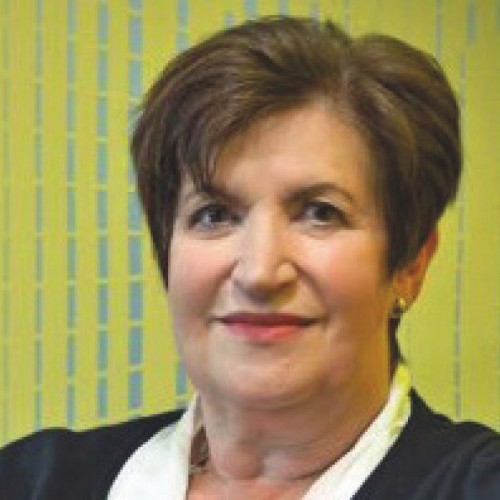
Beatrice Fraenkel
Design regeneration and health consultant, Trustee, Design Council, UKBeatrice is an industrial designer and ergonomist with particular expertise in designing systems and products aligned to end user requirements. Her early career was in design, ergonomic research and teaching at UMIST and Liverpool University. Her public-sector life has always involved regeneration and economic development schemes at a local and regional level – first as chair of the Rope Walks Partnership in Liverpool, then as chair of Renew NW. Beatrice was a non-executive director of Liverpool Health Authority, then chair of South Liverpool Primary Care Trust. Beatrice is a CQC special advisor specialising in governance and leadership. She is a trustee of the Design Council and an Hon.FRIBA. Her past roles have included chair of a housing association, trustee of Tate Liverpool, and chair of the Architects Registration Board.08.45Welcome and introduction09.00Driving health improvement, equity and economic development through a health in all policies approach
Nuala Gallagher
Corporate director of city development, Liverpool City Council, UKAn exceptional leader, Nuala has amassed more than two decades of experience in development and placemaking internationally and is also currently a board member of Limerick Twenty Thirty, a property development company. Her previous roles include Head of Regeneration for the London Borough of Newham, Director for Economy of Place at Bristol City Council and Director of City Centre Development at Belfast City Council. Nuala has also spent time working in New York, leading on sustainable urban development and teaching at Columbia University. She is a registered architect and a graduate of Columbia University with a Masters in Urban Design. She will work closely with the Mayor of Liverpool Joanne Anderson, interim Chief Executive Theresa Grant and the Government Commissioners to continue the transformation of the City Development directorate.
Sam Campbell
Director of planning and building control, Liverpool City Council, UKMrs Campbell has worked at the city council since Autumn 1999 and has risen through the ranks of the Planning Department to hold various posts such as Principal Planning Officer, Deputy Team Leader of Urban Design and Heritage Team and City Centre Co-ordinator. Her 19 year career at the council has led Samantha to take a lead planning role in a number of major regeneration schemes from Kings Dock to Liverpool Football Club’s stadium expansion to the development of the £2bn Knowledge Quarter and overseeing the growth of the Baltic Triangle. The mother of two, who has a Masters in Environmental Planning from Liverpool John Moores University and Post Graduate Diploma in Urban Design at Salford University, has also played a key role in refreshing the strategy for Liverpool’s World Heritage site, liaising closely on projects such as Liverpool Waters and a new Cruise Terminal. As Head of Planning her brief will be to also oversee the development of emerging growth zones in the city such as Ten Streets, the Fabric District, the new Beatles Quarter and the implementation of the Local Plan to build 35,000 new homes across the city over the next 15 years.
Elspeth Anwar MD
Associate director of public health (wider determinants), Liverpool City Council, UKI trained in the North West on the Public Health training scheme and I’m a medical doctor by background. I have also been an academic trainee and have published multiple peer reviewed papers. I am passionate about improving health outcomes and reducing health inequalities through driving collective action to improve the conditions in which people are born, grow, live, work and age within Liverpool. I strongly believe in working with and empowering local communities to improve health outcomes. My current lead areas include wider determinants, addictions (drugs, alcohol, tobacco, gambling) and research and development, including being the lead for the National Institute for Health and Care Research (NIHR) funded Health Determinants Research collaboration Liverpool.
Nicola Butterworth
Corporate director of neighbourhoods and housing, Liverpool City Council, UK
Dagmara Wojciechowicz
Manager, Merseyside PoloniaMy name is Dagmara Wojciechowicz and I live in the L8. November last year I took on the role of Merseyside Polonia’s manager. I am community champion manager focusing on working in partnership with local PCNs, hospital trusts and other health institutions advocating for Polish community. Our partnerships are aimed at bringing down barriers in accessing healthcare and addressing health inequalities affecting our communities. I am a public advisor for ARC NWC based at University of Liverpool on ‘Growing Up Children in Liverpool’ project, and also sit as committee on Health Equality Project Liverpool focusing on addressing low MMR imms uptake amongst children in Liverpool. I have a degree in Business and PR but my focus during my studies was on Corporate Social Responsibility.Driving health improvement, equity and economic development through a health in all policies approach
Abstract Copy
Building on Professor Matthew Ashton’s presentation on day one this panel discussion will focus on work taking place in Liverpool to improve health using a ‘health in all policies’ approach with a focus on equity and economic development. Strategic leads from across Liverpool City Council including planning, housing, city development and public health together with a community leader, will describe and discuss the integrated approach the city is taking to improving health and health equity as a foundation for inclusive economic and social development, including a focus on the local plan.10.15 - 10.45Video+Poster Gallery, coffee and networkingSelect a Stream
- Stream 6Healthy urban development
- Stream 7 Urban planning, placemaking and public realm
- Stream 8Community impact
- Stream 9Population health
- Stream 10Workshops
-
10.45 - 12.30Session 18- Researching healthy urban development: Valuation, law, modelling & green space policy
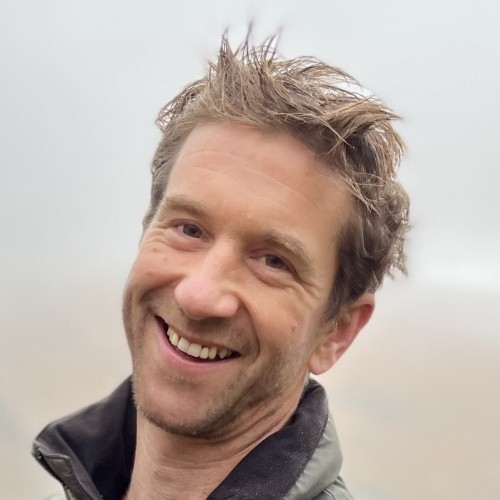
Daniel Black MSc
Research director, TRUUD, UKDaniel is a research director specialising in urban development, corporate decision-making, and bridging academic research to real world impact. He is currently based at the Bristol Medical School and co-leads the TRUUD £10m research consortium. Daniel trained originally in economics, then urban design and planning, before specialising in impact assessment methods for large-scale development. He set up his own consultancy, Daniel Black + Associates | db+a, in 2012. Since then, he has led with academic partners a series of successful research bids covering urban planning; public health; corporate decision-making; climate change; food; energy; water; and waste. Having spent over a decade in practice, learning about processes and detail downstream in a range of urban disciplines, including transport, urban design, building construction and community engagement, Daniel now leads research into decision-making that takes place upstream: governance, partnerships, corporate strategy, and risk management.10.45Researching healthy urban development: Introduction
Daniel Black MSc
Research director, TRUUD, UKDaniel is a research director specialising in urban development, corporate decision-making, and bridging academic research to real world impact. He is currently based at the Bristol Medical School and co-leads the TRUUD £10m research consortium. Daniel trained originally in economics, then urban design and planning, before specialising in impact assessment methods for large-scale development. He set up his own consultancy, Daniel Black + Associates | db+a, in 2012. Since then, he has led with academic partners a series of successful research bids covering urban planning; public health; corporate decision-making; climate change; food; energy; water; and waste. Having spent over a decade in practice, learning about processes and detail downstream in a range of urban disciplines, including transport, urban design, building construction and community engagement, Daniel now leads research into decision-making that takes place upstream: governance, partnerships, corporate strategy, and risk management.Researching healthy urban development: Introduction
Abstract Copy
This session starts with a brief overview of two major research programmes funded by the UK Prevention Research Partnership: i) TRUUD, a 6-year research consortium (2019-2025) that has been seeking to tackle root causes upstream of unhealthy urban development focusing on large-scale property and city-region transport, and ii) its sister consortium, Groundswell, which aims to identify and implement actions to maximise health and wellbeing benefits from urban green and blue spaces (UGBS) such as parks, community gardens, canals and rivers. The session will spotlight examples of work undertaken in four areas: law and health impact assessment, green space policy, spatial data visualisation, and valuation of urban-health outcomes. It will end with a panel discussion on a few key topics followed by a plenary Q&A to provide the audience with an opportunity ask the presenters questions.Learning Objectives
- The main policy challenges and opportunities for promoting urban green and blue spaces
- Policy recommendations from using agent-based modelling (ABM) to test the 20- minute neighbourhood concept
- HAUS, the ‘Health Appraisal of Urban Systems’ tool, which quantifies/monetises the societal costs of health outcomes linked to urban environments
11.00The societal cost of unhealthy urban development
Eleanor Eaton
Research associate, University of Bath, United KingdomEleanor’s research interests are in the economics of health and urban environments, and especially in metrics which can help decision making to improve the places where we live. Her focus is on the societal costs of health, including direct and indirect costs such as healthcare and productivity costs, and non-market valuation techniques such as stated preference and contingent valuation. For TRUUD she is creating a model to quantify impacts of unhealthy urban development, Health Appraisal of Urban Systems (HAUS).The societal cost of unhealthy urban development
Abstract Copy
The Health Appraisal of Urban Systems model (HAUS) is a resource for policymakers and stakeholders to enable them to quantify and monetise the societal costs of health impacts which might result from changes to the urban environment. The result of a major (six-year) research programme (TRUUD*), and a three-year pilot, (UPSTREAM**), it is based on a series of systematic reviews and primary research, and provides a comprehensive and robust methodology, which has been tested in local, regional and national applications and is being adopted by central government as part of its formal appraisal.
Using the granular detail within HAUS, we demonstrate the magnitude of effects that poor quality environments inside and outside the home can have on health, and who might be most at risk. We show how the burden of health falls across the community, and how HAUS can help meet the needs of policy makers to understand the distributional effects of interventions by understanding trade-offs between health gains and health losses in any given scenario. We demonstrate how this information can be used to influence decision-making, and give planners, investors and policy makers the evidence they need to make the case for health in local, regional and national contexts.
We reflect on what the implications are of monetising health in cost-benefit analyses of place based interventions, and how alternative methodologies for valuing health can have a big impact on the conclusions we make in health impact appraisals.
*TRUUD stands for ‘Tackling Root Causes Upstream in Unhealthy Urban Development’
**UPSTREAM is the shortened title of the project ‘Moving Health Upstream in Urban Development’Learning Objectives
- Understand the implications of methods for valuing health in urban decision making
- Explore how to understand who benefits and who loses in a given scheme
- Find out about a new model to help make the case for healthier urban development
11.15Law, health impact assessments and future avenues
Ed Kirton-Darling
Senior lecturer, Bristol Law School, UKDr Ed Kirton-Darling is a solicitor (non-practising) and Senior Lecturer in the University of Bristol Law School. His work in public/administrative law has a particular focus on housing, homelessness and urban development in a wider context of social welfare and human rights. As part of the TRUUD project, he has worked closely with the Office for Health Inequalities and Disparities and local authorities across England to encourage more effective use of Health Impact Assessment in urban development processes.Law, health impact assessments and future avenues
Abstract Copy
Law plays a fundamental role in the production of urban living, with a wide range of direct and indirect impacts, from the regulation of poor conditions to the structuring of finance and the creation of property rights. This paper will explore two specific features of the way in which law shapes health and urban development.
Firstly, in the context of a statutory planning regime and policy context that does not prioritise health, it will explore the ways in which law might be employed to promote health in urban decision-making through the encouragement of effective health impact assessment processes. Secondly, it will examine the prospect of legal implications for failing to proactively act to protect health, including reflections on potential litigation risks which might arise from a failure to engage seriously in questions of health.Learning Objectives
- Understand essential law relating to health impact assessments (HIA) in urban development
- Develop understanding of the variety of HIA requirements in local plans
- Gain knowledge of the way in which local plans can be used to implement HIA more effectively
11.30Modelling and visualising health inequalities and outcomes in relation to urban development and planning
Heeseo Rain Kwon
Lecturer in geographic data science, University of Liverpool, UKHeeseo Rain Kwon is a Lecturer (Asst. Prof) in Geographic Data Science (Human Geography) at the University of Liverpool. She was a Postdoctoral Research Fellow at the UCL Bartlett School of Planning where she is currently an Honorary Lecturer. Her doctoral research at the University of Cambridge focused on using behavioural theories, agent-based modelling (ABM) and GIS-based spatial analysis for simulating urban change. Rain's research interests currently focus on the use of new forms of data along with theories, and behavioural modelling including ABM and human-environment interaction modelling.Modelling and visualising health inequalities and outcomes in relation to urban development and planning
Abstract Copy
The pandemic highlighted structural challenges in cities, including health inequality, and introduced trends such as working from home and local living. The 15-minute City or 20-minute Neighbourhood (20mN) concept and a less car-based lifestyle has gained attention as a framework to promote health and environmental outcomes. To understand health and inequality implications of 20mN, there is a need to study the interlinkages of components that shape 20mN across sectors such as planning, real estate, transport and public health, accounting for the spatial and population characteristics of the neighbourhoods, as well as the change of the built environment and travel behaviour over time.
This research adopts a complex systems approach, building an exploratory spatial agent-based model (ABM) using data from Greater Manchester (GM). The study establishes a conceptual framework with two feedback loops: (1) residents’ switch from car to non-car modes increases physical activity and air quality, leading to better health and further encouraging active mobility; and (2) more demand for carless urban environments leads to pro-health urban development towards 20mN, facilitating further mode shifts away from cars. The simulation runs from 2023 to 2040, aligning with GM’s vision for achieving 50% walking, cycling, and public transport mode share by 2040.
On NetLogo, this study set ‘patch (land parcel)’ properties using various raster maps such as building use, deprivation and NHS disease prevalence and set ‘turtle (resident)’ properties using 2011 and 2021 UK census individual microdata of socio-economic and travel characteristics of working residents. Three sets of behavioural rules were established, informed by literature review and stakeholder consultation in GM: (1) rules for land/building use change and population location corresponding to work form home and policy scenarios; (2) rules for residents’ car to non-car mode switch based on theories of planned behaviour and interpersonal behaviour; and (3) rules for the expected impact of increased physical activity on the improvement of NCD prevalence, including diabetes. Such a modelling approach can help policymakers design and test top-down and bottom-up interventions for behavioural change towards healthy 20mN, identifying neighbourhoods needing attention for spatial and healthy inequalities.
Learning Objectives
- Get an idea of how complex systems and spatial agent-based modelling approach can help unravel the interlinkages of 20-minute neighbourhood (20mN), travel behaviour, health and inequality
- See the potential of such approach in simulating the expected impact of 20mN and increased physical activity on the improvement of the prevalence of different NCDs
- That individual and system-level behavioural changes are needed from private and public sectors and citizens for healthy and equitable 20-minute neighbourhood
11.45Green space and policy interventions
Alex Nurse
Senior lecturer in urban planning, University of Liverpool, UKAlex Nurse is a Senior Lecturer in Urban Planning in the Department of Geography and Planning, University of Liverpool. His areas of academic research include the governance of cities and city-regions, and urban cycling policymaking. He has broad areas of interest in how local actors are able to use national policy structures to deliver for their own ambitions, and how local authorities can overcome barriers to policies which are seen as a normative good. His recent book Rescaling Urban Governance: Planning, Localism and Institutional Change was published by Policy Press.Green space and policy interventions
Abstract Copy
Groundswell is a UKPRP-funded project that uses a systems science approach to optimise the health impact of Urban Green and Blue Spaces (UGBS). One element of the project, jointly led by the University of Exeter and the University of Liverpool, considers the role of political and decision-making contexts in achieving these outcomes.
In developing this work, the UoL/UoE team have undertaken a national-level study of decision-makers across all four of the UK devolved nations. In doing so, the study explores how attitudes and approaches to UGBS vary across each context and examines how evidence and collaboration factor into decision-making processes.
The findings pick up thematic issues relating to the challenges and opportunities of cross-governmental and cross-departmental working, the impact of austerity, government instability and the methods of working that emerge when this occurs, and the opportunities for national-scale urban planning. In doing so, it allows us to reflect on the last decade of governance in the UK, and the opportunities for the future as a new Government takes office.
Learning Objectives
- To understand how senior government officials make decisions for and about Urban Green and Blue spaces
- To understand how this varies between the UK devolved nations, and how different governance environments enable different approaches
- To consider what approaches might be adopted to improve decision making across contexts
12.00Panel discussion12.30 - 14.00Video+Poster Gallery, workshop, lunch and networkingLunchtime workshop14.00 - 15.30Session 19- Opportunities to prioritise health impact in urban design and development
Sophie Turnbull
Research fellow, Bristol Medical School, UKSophie specialises in the development and evaluation of behaviour change interventions aimed at preventing and treating chronic conditions and addressing health inequalities. Her work incorporates mixed methods research, blending evidence-based behaviour change methodologies across healthcare settings, public health projects, and industry collaborations. With a robust academic foundation in psychology and neuropsychology, Dr. Turnbull completed her PhD on the impact of digital health interventions on health inequalities in chronic conditions.14.00Opportunities to prioritise health impact in urban design and development
Harry Knibb
Development director, Oxford Properties; director, Academy of Urbanism, UKA chartered town planner and developer, Harry specialises in pre-planning / strategic sustainability, wellbeing, and energy work. His interests lie in social sustainability, wellbeing and loneliness. He has won awards for research exploring the linkages between pro-environmental behaviour and happiness. He believes there is an opportunity to employ robust social science methods to better understand the true impact of development. He is also a WELL AP.
Martha Jordan
PhD candidate in Management, University of Bath, UKMartha has joined TRUUD as a PhD student in Management where she will be focussing on developing an intervention that attempts to make explicit and disrupt the power structures within the current system of urban development decision-making. She began her studies in psychology, at the University of Manchester, before spending 2 years studying Environmental Psychology in the Netherlands at the University of Groningen. In the Netherlands, her work focussed on intersectionality within pro-environment community groups and looked at using psychological theory to understand the demographic makeup of these groups.
Sophie Turnbull
Research fellow, Bristol Medical School, UKSophie specialises in the development and evaluation of behaviour change interventions aimed at preventing and treating chronic conditions and addressing health inequalities. Her work incorporates mixed methods research, blending evidence-based behaviour change methodologies across healthcare settings, public health projects, and industry collaborations. With a robust academic foundation in psychology and neuropsychology, Dr. Turnbull completed her PhD on the impact of digital health interventions on health inequalities in chronic conditions.Opportunities to prioritise health impact in urban design and development
Abstract Copy
Professionals working in the private sector of urban development agree that health is important and should be prioritised. This session involves thoughts and discussion about how to raise health further up the agenda.
According to our research, despite agreeing that health is important, there are three strong reasons for inertia on health in urban development: insufficient power to make necessary changes, culture within the industry that slow down/ prevent innovation, and professionals are not sure on the specifics of what to do.
The session will explore the challenges integrating health into urban development, and opportunities to overcome them. This will include a talk and discussion around:
• Health and social value
• Evidence-based links between the urban environment and health. This will be illustrated by data from the HAUS tool (developed by the TRUUD team); providing information on the cost of health impacts resulting from the urban environment.
• Risks and benefits of prioritising health.
• Examples of how organisations are taking action to prioritise health in urban development.
• Signposting to helpful resources to support the prioritisation of health.
Learning Objectives
- Having a greater awareness of the evidence linking features of the urban environment with health outcomes
- Having a greater understanding of what other colleagues and organisations in urban development are doing to prioritise health
- Having an opportunity to discuss and reflect on key solutions to raising health up the agenda
15.30 - 16.00Video+Poster Gallery, coffee and networking16.00 - 17.00Session 20- What role can public health play in future devolution deals?
Sarah Ayres
Professor of public policy and governance, University of Bristol, UKSarah is a political scientist with expertise in Whitehall decision making and English devolution. Her research has provided critical insights into how ‘informal’ decision making, i.e. what happens behind closed doors between political elites, has shaped devolution in the UK. Sarah has been an academic advisor to three successive UK Governments on English devolution and regularly provides written and oral evidence to both Government consultations and House of Commons Inquiries. For TRUUD, Sarah leads the ‘National Government’ team, which is looking to raise the awareness of health outcomes in urban development decision making in Whitehall.16.00What role can public health play in future devolution deals?
Kathy McLean
Chair, Nottingham and Nottinghamshire Integrated Care Board, UKDr Kathy McLean has decades of experience in clinical and system leadership in Derbyshire and nationally. She was executive Medical Director at the former Derby Hospitals NHS Foundation Trust for over six years. Before that she was also a consultant physician at the trust from 1994 until 2009. Dr McLean was the Medical Director at the former NHS Trust Development Authority for three years up to 2016 and prior to this she was the Clinical Transitions Director, helping to build the NHS Commissioning Board, which is now NHS England. Her work has focused on improving quality by building clinical leadership and expertise across the system, supporting the most challenged organisations and leading change. Dr McLean was chair of University Hospitals Derby and Burton until taking up her role with NHS Derby and Derbyshire Integrated Care Board. She was also a non-executive director at Barts Health and Barking Havering and Redbridge NHS Trusts. Additionally she is chair of the NHS Nottingham and Nottinghamshire Integrated Care Board and Integrated Care Partnership and she is chair of the NHS Confederation’s Integrated Care System Network board.
Jack Newman
Research fellow, School for Policy Studies, University of Bristol, UKJack’s research considers how the reform of political institutions can lead to more effective public policy. In recent years, this has been focused on decentralisation and spatial policy in England, asking how the UK’s changing multi-level politics might enable more integrated, strategic, democratic, and preventative policymaking. At TRUUD, Jack focuses on how preventative health can be embedded in political discourse and realised though devolution and cross-government working.
Mark Sandford
Senior research analyst, House of Commons, UKMark Sandford is a researcher specialising in local government, devolution, local government finance and territorial identity. He works as a senior research analyst in the House of Commons Library. He has published a number of reports, papers and journal articles on local government finance and English devolution. He has also been a research fellow at the Constitution Unit, University College London, and head of research at the Electoral Commission.
Michael Wood
Head of health economic partnerships, NHS Confederation, United KingdomMichael Wood is the Head of Health Economic Partnerships at the NHS Confederation. Prior to this he developed and held the role of NHS local growth adviser from 2015, for some of this time working as deputy local growth consultant for the Higher Education Funding Council for England (HEFCE). Before that, he was senior European policy manager at the NHS European Office for more than seven years. He has also worked for the Parliamentary and Health Service Ombudsman and for a Member of the European Parliament in Brussels. As Head of Health Economic Partnerships, Michael advises NHS leaders nationally and locally on policy, strategy, partnerships and funding relating to the local economy, including in areas such as skills and workforce, estates, innovation, population health and finance. Michael currently holds national advisory positions on the Civic University Network and the National Civic Impact Accelerator, as well as the Midlands Engine Health Board. He also advises NHS London on the development of its NHS Anchor Network.
Sarah Ayres
Professor of public policy and governance, University of Bristol, UKSarah is a political scientist with expertise in Whitehall decision making and English devolution. Her research has provided critical insights into how ‘informal’ decision making, i.e. what happens behind closed doors between political elites, has shaped devolution in the UK. Sarah has been an academic advisor to three successive UK Governments on English devolution and regularly provides written and oral evidence to both Government consultations and House of Commons Inquiries. For TRUUD, Sarah leads the ‘National Government’ team, which is looking to raise the awareness of health outcomes in urban development decision making in Whitehall.What role can public health play in future devolution deals?
Abstract Copy
This panel explores the latest developments in health devolution in England. We take stock of the rapid developments in the roll-out of mayoral combined authorities (MCAs) and integrated care systems (ICSs). We assess the challenges and opportunities for these two systems to work together to deliver a more decentralised and place-based approach to health policy. And we reflect on the future direction of health devolution under the new government. From both expert and practitioner perspectives, panellists will seek to identify strategies and policy tools that help embed public health in local policymaking.
We are joined by:
Mark Sandford, an expert on English devolution from the House of Commons Library.
Kathy McLean, chair of two ICBs in the newly devolved East Midlands region.
Michael Wood, author of a new report on health devolution from the LGA and NHS Confederation.
Jack Newman, researching MCAs and healthy urban development on the TRUUD project.
The conversation will build on a report published in May 2024 by the NHS Confederation and Local Government Association: ‘Prevention, population health and prosperity: a new era in devolution’. It looks at how health can be integrated into devolution agendas in England. Truud’s HAUS model features in this report as an example of how to think about preventative and long-team public health in the context of devolution.
Learning Objectives
- Understand the latest developments in health devolution in England
- Identify the challenges facing ICSs, MCAs, and the broader health devolution agenda
- Reflect on the opportunities for future health devolution under the new government
End of Healthy urban development stream -
Urban planning, placemaking and public realm
Space 6 & 7
10.45 - 12.30Session 22- Spatial planning for healthy places: Policy and practice
Caroline Paradise PhD
Head of design research, Atkins, UKCaroline Paradise is a Technical Director, and Head of Research & Innovation within the Building Design practice at Atkins. She is a qualified Architect with a PhD in Architecture and 18yrs experience in applied research within the built environment industry. She currently leads a multi-disciplinary Research & Innovation team focusing on themes including Human Experience, Technology Advancement and the Creative Process. Her role supports a research driven design approach to provide innovative solutions across a range of sectors, including Education, Residential and Transportation. Since the beginning of her career, Caroline has been passionate about the importance of design to support the health and wellbeing of all building users. Caroline led the development of Atkins’ HCD toolkit, an innovative design service supported by a suite of digital tools which puts user experience and wellbeing at the heart of design decision making.10.45Assessing liveability in St Louis City through spatial and policy analysis
Milena Franco Silva
Research assistant, Washington University in St. Louis, United StatesMilena Franco Silva is a research assistant in the People, Health, & Place Unit and a second-year PhD student in Public Health Sciences at the Brown School at Washington University in St. Louis. Originally from Curitiba, Brazil, Milena is an architect and urbanist who earned her Master’s degree in Urban Management from the Pontifical Catholic University of Parana (PUCPR). Throughout her academic journey, Milena has recognized the intrinsic relationship between urban design and public health. With a commitment to fostering equitable and healthier communities, Milena aims to contribute actively to these efforts in urban settings across Latin America and globally, leveraging a transdisciplinary approach.Assessing liveability in St Louis City through spatial and policy analysis
Abstract Copy
To assess and monitor urban health, liveability, and sustainability worldwide, the Global Observatory for Healthy and Sustainable Cities (GOHSC) launched the 1000 Cities Challenge. The City of St Louis, Missouri, USA is among the early adopters.
Purpose: This study aimed to evaluate liveability in the City of St Louis using GOHSC spatial and policy indicators.
Methods: Through a mixed-methods approach, we analysed the spatial distribution of urban design, transport features, and presence/quality of liveability policies, using GOHSC software. We calculated spatial indicators at an area grid (100 meters) and citywide estimates using open data from OpenStreetMap, Global Human Settlements Layer, and Public Transit Feeds. To assess policy indicators, four reviewers used city websites to map policies within liveability domains (health, sustainability, walkability, public transit, open space access, urban air quality, nature-based solutions, and climate disaster risk reduction). Coding criteria for policies included level of government, year of implementation, alignment with healthy cities evidence, and inclusion of measurable targets. Policy indicators were reported, considering policy presence and quality scores.
Results: Nearly one-quarter (26.3%) of the population has access to frequent public transport within 500 metres of their homes, and 44.5% live near large public open spaces. This is below GOHSC's current city average (44.6% and 66.0%, respectively). Conversely, 89.6% live in areas with walkability scores above the current GOHSC median, and 91.7% of residents live in neighbourhoods meeting the optimal threshold of street intersection density (100 intersections/km²) that supports walking for transport. For every 100 residents, 2.8% live in neighbourhoods meeting the optimal threshold for population density (5,700 people/km²). The policy presence score obtained was 26/32 (81%), and the policy quality score was 19/62 (31%). Most policies did not include measurable targets.
Conclusions: Many residents lack access to sufficient public transit and open space. While many policies aim to facilitate liveability, most don't employ evidence-based recommendations and/or measurable targets for improvement, which may hinder tracking progress toward liveability outcomes. Utilising mixed-methods allowed to develop city-level indicators for policy and spatial data, enabling comprehensive evaluation of liveability experienced by residents. There is need to synthesise local and regional policies, supplement liveability indicators to measure environmental (in)justice within cities, and utilise streetscape micro-scale data to develop a comprehensive understanding of liveability.Learning Objectives
- Understand the application of spatial and policy indicators to evaluate urban livability.
- Analyze the impact of existing urban policies on livability outcomes.
- Identify gaps and opportunities for enhancing urban livability through evidence-based interventions.
11.05How to embed health in spatial planning at a local level: A case study from an inner-London borough
Johnny Lui
Spatial planning and health manager, London Borough of Tower Hamlets, United KingdomJohnny is an experienced architect, urban designer and planning professional. Before joining the Tower Hamlets Public Health team, he worked as an architect at Herzog & de Meuron in Switzerland and the UK on major international projects. He studied at the University of Cambridge, the Royal College of Art, and the University of Westminster. In his current role, he is responsible for the integration of Health in Spatial Planning. Using a combination of Public Health evidence, planning expertise and urban design knowledge, Johnny improves health outcomes through the planning process at borough-level. He also contributes to this agenda at a London-wide level as part of the NHS HUDU Health Impact Assessment (HIA) Working Group, and nationally as part of the OHID Spatial Planning for Health workforce. He has been an invited speaker and presented his experience integrating Health in Spatial Planning on behalf of the Local Government Association, the TCPA, and Built Environment for the Future.How to embed health in spatial planning at a local level: A case study from an inner-London borough
Abstract Copy
Planning policies can directly or indirectly contribute to protecting and improving people’s physical and mental health and thus help tackle health inequalities.
The London Borough of Tower Hamlets adopted its New Local Plan in 2020. The plan includes an HIA policy, which requires developers to complete and submit an HIA as part of their application. An HIA Working Group was established to implement the policy between 2019 and 2021, and an HIA officer was recruited to provide comments on HIAs received. Following a case study approach, a process evaluation of the policy’s implementation was undertaken with University College London, which consisted of in-depth interviews with public health and planning colleagues, and focus groups with HIA consultants.
Outcomes: The evaluation found that successful collaboration between planning and public health colleagues had led to a shared understanding of maximising the legal levers of the HIA policy. However, despite effective partnership working, issues such as organisational silos, sectoral priorities, and resource constraints across the council impeded policy implementation. As a result, health outcomes were not maximised through the policy. The evaluation provided a range of recommendations, including:
• More focused public health involvement on the largest planning applications;
• Strengthening of the HIA policy and related planning policies;
• Earlier public health involvement, ideally at a pre-application discussion stage;
• Supplying applicants with public health insight and support identifying vulnerable populations, priority health topics and key wider determinants of health in each area; and
• Further capacity building of planning colleagues to understand how their work influences the wider determinants of health.
Implications: These recommendations are now in the process of being implemented. A spatial planning and health manager with a planning / urban design background has been recruited to lead on the implementation of these recommendations. There are early signs that the efficacy of HIAs and health outcomes in planning are improving based on this new work.
Learning Objectives
- 1. How to embed a health-lens within planning policy and decision making at a local level health impact assessments and Public Health
- 2. How to build relationships and deliver joint projects between Public Health and Spatial Planning professionals
- 3. Practical insight into the use of health impact assessments in spatial planning – opportunities, challenges and recommendations
11.25Healthy policies for healthy places: A framework to systematically embed health in local development plans in England
Gemma Hyde
Projects and policy manager, TCPA, United KingdomGemma Hyde is a Projects and Policy Manager for healthier place-making at the Town and Country Planning Association (TCPA). Gemma supports local authorities in all aspects of healthier place-making including how to embed health and wellbeing into development plans, the promotion and implementation of 20-minute neighbourhoods, child-friendly and intergenerational approaches, supporting specific initiatives such as school streets and providing training and workshops for officers, elected members and wider community groups. Prior to joining the TCPA, Gemma worked in various planning and public health roles with a number of local authorities and third sector organisations including Milton Keynes Council and the National Childbirth Trust.
Emma Bird
Senior lecturer in Public Health, UWE Bristol, United KingdomDr Emma Bird is a Senior Lecturer in Public Health at UWE Bristol. Emma is an active member of UWE Bristol's Centre for Public Health and Wellbeing, with broad research interests in health and place and evaluation in health and wellbeing.Healthy policies for healthy places: A framework to systematically embed health in local development plans in England
Abstract Copy
Planning policy, nationally and locally, shapes the environments we live in and Local Plans can play an integral role in improving both physical and mental population health. However, TRUUD research found that Local Plans are inconsistent and weak regarding the health requirements that are expected from developers when making a planning application.
Many local planning authorities in England recognise the role of planning in shaping good population health and want to strengthen the ‘health’ aspects of their plans and policies but are unsure exactly how. Local authority officers from across departments can be unsure why, how and when in the planning process, health can be embedded into local policy, and weaknesses and vagueness in policy means developers can be unclear about their responsibilities to address local health priorities, and incorporate healthy urban development principles and features in their proposals.
Based on in-depth health in Local Plans research and over a decade of practice supporting local authorities across the UK, TRUUD and the TCPA are collaborating on a Healthy Planning Framework to translate their experience into transferable and sustainable guidance to support stakeholders working in local authorities to better integrate health into local planning policy.
The framework, building on work already completed by TRUUD and the TCPA, will be drafted and then reviewed with a small number of local authorities to provide feedback and a ‘sense check’ before being launched in September 2024. It will include detailed guidance on 1) specifying local health priorities; 2) signposting to guidance and standards; 3) clarifying health-related requirements for developers; and 4) strengthening implementation requirements. Examples of good policy language from existing adopted policy will be provided throughout.
This paper will present the framework – a practical tool that will help local planners and others create healthier places by implementing evidence-based and robust healthy planning policies.
Learning Objectives
- Increase understanding of why need to tackle poor population health and inequalities through the planning system
- Drive inter-disciplinary collaboration to embed robust health and wellbeing evidence into planning policy
- Introduce practical guidance for local authorities in England on how to create healthy local planning policy
11.45Healthy Happy Places – Places of Sanctuary, North Tyneside
Rachel Turnbull
Programme lead and co-founder, Health Innovation North East and North Cumbria, United KingdomRachel works in healthcare innovation leading regional projects in the North East of England. Originally qualified as a clinician with a Doctorate in Clinical Psychology Rachel has developed more than 15 years’ experience in project management and service improvement roles and more latterly completed a degree in urban planning and architecture. Her interests lie in the connections between wellbeing and urban design and how to support the creation of healthy, happy, fun places where people and communities can thrive. Rachel is co-creator of the programme, Healthy Happy Places, which is focusing specifically on how we can create positive mental health and wellbeing through the built environment by sharing expertise and knowledge between the NHS, public health, regeneration and planning, design, architecture, the arts and citizens; and using creative participation to nudge and inspire the design of places and spaces. Exploring ways of putting ‘tactical urbanism’ into action in places with deep inequalities using a set of evidence based 'ingredients' to guide possibilities in place. This is currently being tested and applied in practice to projects in the North East.Healthy Happy Places – Places of Sanctuary, North Tyneside
Abstract Copy
Healthy Happy Places acts as a bridge between sectors and the community, to come together to turn unloved spaces into healthier, happier places. The aim is to use the designed environment to create positive mental health and wellbeing in areas of inequalities in the North East of England. It rests on principles from different disciplines, including health creation, and strengths-based approaches, such as Asset Based Community Development (ABCD), creative placemaking, participatory action research, and tactical urbanism. The practice of Healthy Happy Places uses a set of ingredients and a creative approach to develop places that are more joyful, calming, and nurturing places.
Healthy Happy Places worked with North Tyneside Council and community partners to explore what added value could be created to contribute to the masterplan and planned regeneration across two towns in the borough of North Tyneside in the North East of England. The application of the Healthy Happy Places first pillar was applied to test the concept of how we ‘understand place’ using both data and socially engaged creative practice at a town scale. A creative brief was developed named ‘Places of Sanctuary – how can our towns create and nurture positive mental health and wellbeing for all?' Two sets of artists were commissioned to lead the creative engagement work in each town.
Outcomes: Wallsend – Mustard Stories Arts CIC worked with us to develop eight weekly sessions focused around creative writing, spoken word, and photography, which was offered to citizens who attended Anxious Minds based in the shopping centre. Each session focused around aspects of life in the town, which were directly related to the masterplan development. This resulted in an animated video and a zine being produced (https://bit.ly/4bWw6F7) along with recommendations on potential interventions and how this could overlay onto the developing masterplan. The Council included this in its Cabinet report for the masterplan.
North Shields – Artists Nicola Lynch and Sally Southern worked with us to run group sessions in Cedarwood Trust and Changing Lives, working from the same brief. This resulted in the creation of a temporary geodesic dome being constructed in the shopping centre.
Challenges and implications are around how this can become a more integrated and bottom-up approach so that citizens (and other sectors) get an opportunity to inform the design (and brief) of the masterplan from the outset.Learning Objectives
- Reflecting on the ingredients for a healthy, happy place in the context of a street-scale project
- In practice – how can this be achieved
- Learnings – what are the successes and challenges of creating healthy, happy places
12.05Panel discussion12.30 - 14.00Video+Poster Gallery, workshop, lunch and networking14.00 - 15.30Session 23- Liverpool Green Lanes: Connecting communities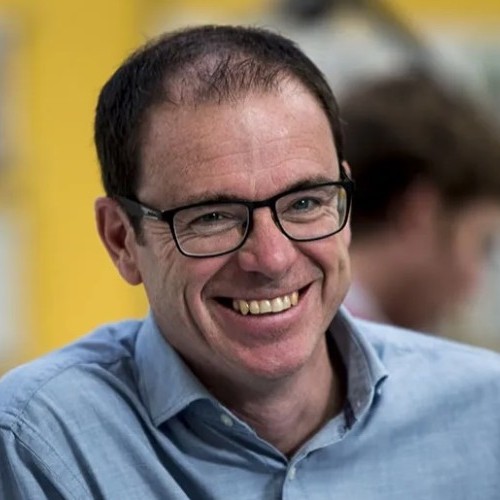
Paul Bell
Partner, Ryder Architecture, UKPaul is a partner at Ryder, established in Newcastle in 1953, with offices across the UK, Hong Kong, Vancouver and Amsterdam. Projects range in value from £50,000 to £300 million, including civic, education, healthcare, infrastructure, leisure, manufacturing, office, residential, retail and science sectors. Paul completed his architectural education at the Mackintosh School of Architecture, Glasgow in 1992, and with more than 20 years' experience in the healthcare sector, leads Ryder’s healthcare portfolio, which includes the award-winning Dumfries and Galloway Royal Infirmary and the Prince and Princess of Wales Hospice in Glasgow. In 2006, he established Ryder’s Glasgow team and led the early development of the Hong Kong team. Prior to joining Ryder, he worked with Terry Farrell for 11 years in London and Hong Kong, and has spoken around the world on sustainable healthcare design.14.00Liverpool Green Lanes: Connecting communities
Cathy Russell
Urban design director, Ryder Architecture, UKCathy is a recognised practitioner in urban design and an associate of the RTPI. She gained a master’s in urban design at Newcastle University. Cathy’s role at Ryder involves research, masterplanning, public realm, site and contextual analysis, stakeholder engagement and planning. She also leads historic research, heritage statements and impact assessments, working closely with conservation officers, Historic England and other consultees. Cathy is a Building with Nature approved assessor and Healthy Streets Foundation practitioner, and is passionate about creating healthy, sustainable places which enhance wellbeing. She contributes to Ryder’s research on placemaking for health and wellbeing, including presenting at the SALUS Healthy City Design Congress.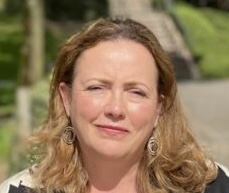
Allison McGuiness
Head of sustainability, Liverpool ONE, UKSpearheading Liverpool ONE’s environmental, social and governance development is Allison McGuinness, Head of Sustainability, who brings a breadth of experience in implementing ESG-focused strategic behavioural change across the public and private sectors. Allison assists the whole Liverpool ONE team in leading Liverpool ONE’s journey to a more sustainable future.
Kevin Fenning
Director, Evidence First, UKI am an experienced economic development and strategy consultant with 15 years’ experience of supporting clients. I regularly work with public and private sector organisations on: economic strategy and analysis, business case development and funding bids, economic impact assessment, and skills strategy and analytical work. Typical clients include: local government (local authorities, combined authorities and pan-regional partnerships), central government departments and agencies (including MHCLG and Defra), universities, and major investors and developers. I help these organisations consider their approach to investing in and improving local places around the UK. These are complex projects, involving a number of thematic areas, including: innovation, net zero, business support / sectoral development, exporting / trade, skills, infrastructure, housing, commercial property, energy and sustainability, and demographic change. A consistent theme in all of these projects is the need to successfully engage with local leaders and senior officers – facilitating discussion between different organisations on the basis of clear, well-presented statistics and evidence, and helping groups of stakeholders to develop a common approach.
Jeremy Salmon
Principal director, UrbanPlaceNetwork, UKFounding Principal of UrbanPlaceNetwork, international city focussed architect with over 30 years’ experience on major mixed-use projects around the world; passionate about activating destination, creating a sense of belonging through placeshaping and encouraging shared authorship.
Roberto Villegas-Diaz
Data manager, University of Liverpool, United KingdomRoberto is the Data Manager of the GroundsWell Consortium, bringing a robust background in computer and data science to the role. With extensive expertise in crafting reproducible software pipelines, Roberto supports a wide range of analyses, ensuring accuracy and reliability in data handling. His keen interest in high-performance computing drives innovative solutions, enhancing the efficiency and scalability of data operations within the consortium.Liverpool Green Lanes: Connecting communities
Abstract Copy
Liverpool Green Lanes is both a provocation and a proposition to catalyse, connect, green and grow Liverpool, addressing health and economic inequality, improving connectivity and engaging the city’s communities. Building on an extensive knowledge of the city and detailed project experience within KQ Liverpool, the Liverpool Green Lanes proposition explores how the influence of urban regeneration projects like KQ Liverpool can be extended beyond their boundaries.
Setting out an ambition to promote city living, health and wellbeing, cultural and civic life, sustainable and maker retail, transit and gateway, learning and knowledge, urban food and ecology, the proposal defines how critical paths across cities, areas of need, interest and potential could be connected. These critical paths have the potential to amplify and accelerate Liverpool’s positive transformation, providing communities with access to a greener, healthier, more liveable and better connected urban environment.
As a centrepiece of last year’s HCD 2023 Congress, an interactive installation generated significant interest and feedback. The proposition was presented to Congress and enthusiastically debated in a panel discussion with representatives from the World Health Organization, University of Liverpool, Liverpool City Council, and subject matter experts. At HCD 2024, an expert panel will demonstrate how continued development of the Liverpool Green Lanes concept responds to the objectives of the World Health Organization’s emerging Strategic Guide for Urban Health, with responses to the proposition from collaborators.15.30 - 16.00Video+Poster Gallery, coffee and networking16.00 - 17.00Session 24- Collaborating for evidence-informed policy and practiceRhiannon Corcoran PhD
Professor of Psychology and Public Mental Health, University of Liverpool; Fellow, Centre for Urban Design and Mental Health, UKRhiannon’s research focuses on psychological, social and environmental mechanisms and determinants of mental distress and wellbeing. In particular, she is interested in social cognition and on how our living environment affects our ability to feel good and function well. As an applied social scientist, Rhiannon’s mission is to put research findings into practice. She does this by combining her work at the university with herwork as a co-director of Prosocial Place , a social enterprise that specialises in putting wellbeing and mental health at the heart of place-making and regeneration. In this capacity Rhiannon has worked on several national programmes such as the NHS Healthy New Towns Initiative and with DLUHC, DCMS and Design Council. Rhiannon’s work in social cognition involves both 'clinical' and non-clinical groups of people where she has a particular interest in the psychosis spectrum, common mental distress and the autistic spectrum. Rhiannon uses diverse methods within quantitative and qualitative approaches including real world and realistic evaluation, quasi-experimental and neuroscientific techniques.16.00Collaborating for evidence-informed policy and practice
Sarah Rodgers
Professor of Health Informatics, University of Liverpool, United KingdomSarah is a Professor of Health Informatics with expertise in evaluating natural experiments and non-randomised intervention studies using anonymised linked administrative and health datasets. Sarah’s research focuses on using safe haven data that have been linked across health, social and environmental domains to explore the impact of exposures such as decent housing conditions, alcohol outlets, pollution, and natural outdoor spaces, on health and wellbeing. Sarah is Co-Director of a UK Prevention Research Partnership, GroundsWell. This Consortium aims to reduce health inequities of non-communicable diseases through the provision of appropriate urban green and blue spaces. GroundsWell work across the Liverpool, Belfast, and Edinburgh city regions. Sarah is an investigator on the Wellcome Trust funded birth cohort Children Growing Up in Liverpool and Civic Data Cooperative data linkage initiative. She is one of the academic leads for the Liverpool and Lancaster School for Public Health Research LiLaC. Sarah is the capacity training lead for LiLaC SPHR, and for our Department of Public Health, Policy & Systems. She leads the Care and Health Informatics theme for the NIHR Applied Research Collaboration (Northwest Coast). Sarah is making contributions to the new NW Secure Data Initiative to enable evaluations to include data across different siloes using a 'bring your own data' approach.
Rebecca Crook
Research fellow, University of Liverpool, United KingdomRebecca is a Research Fellow within the GroundsWell Consortium in the Department of Public Health, Policy & Systems. Her role in GroundsWell focuses on the development and evaluation of community-based urban green and blue space interventions, using co-design and qualitative approaches.
Roberto Villegas-Diaz
Data manager, University of Liverpool, United KingdomRoberto is the Data Manager of the GroundsWell Consortium, bringing a robust background in computer and data science to the role. With extensive expertise in crafting reproducible software pipelines, Roberto supports a wide range of analyses, ensuring accuracy and reliability in data handling. His keen interest in high-performance computing drives innovative solutions, enhancing the efficiency and scalability of data operations within the consortium.Anna Le Gouais
Research fellow, University of Bristol, United KingdomAnna is a Research Fellow at University of Bristol - Population Health Sciences, Bristol Medical School. She is seconded part-time to Bristol City Council as part of the TRUUD project, where she works with Regeneration, Planning Policy and Public Health teams.
Marc Cooper
Regeneration project manager, Bristol City Council, United KingdomMarc Cooper is a Regeneration Project Manager at Bristol City Council with previous regeneration experience at Royal Borough of Kingston upon Thames.
Eleanor Eaton
Research associate, University of Bath, United KingdomEleanor’s research interests are in the economics of health and urban environments, and especially in metrics which can help decision making to improve the places where we live. Her focus is on the societal costs of health, including direct and indirect costs such as healthcare and productivity costs, and non-market valuation techniques such as stated preference and contingent valuation. For TRUUD she is creating a model to quantify impacts of unhealthy urban development, Health Appraisal of Urban Systems (HAUS).
James Trafford
Project manager, Liverpool City Region Combined Authority, UKExperienced project manager with highly transferrable project and cost-control skills across multiple industries. Over my career I have delivered profitable, timely and compliant projects to meet customer needs worldwide in defence, automotive, energy and currently; the public sector.Collaborating for evidence-informed policy and practice
Abstract Copy
This workshop will focus on partnership working to improve population health and reduce health inequalities, bringing learning from two UK Prevention Research Partnership funded projects: GroundsWell, which focuses on the role of urban green and blue spaces; and TRUUD, which focuses on unhealthy urban development.
Session chair: Rhiannon Corcoran
Presentations:
1. Revitalising Birkenhead: Evaluating the Transformative Health Impact of the Dock Branch Park Regeneration
Rebecca Crook and Wirral Council
Dock Branch Park regeneration is transforming a disused railway line into a green space and active travel corridor traversing Birkenhead, Wirral. In collaboration with key stakeholders, including community volunteers, Groundswell researchers conducted an evaluability assessment of the Dock Branch Park regeneration programme to determine whether an evaluation would be useful and feasible, and to outline potential evaluation methods. We outline an overview of the methodology and the proposed evaluation design, providing insights into co-design methods for effective collaboration with community partners and stakeholders.
2. Co-producing evaluative research with the Liverpool City Region Combined Authority: Green Bus Routes
Sarah Rodgers and James Trafford
GroundsWell is working in partnership with the Liverpool City Region Combined Authority on its Green Bus Routes programme, which focuses on improvements to busy bus corridors. GroundsWell is supporting the programme with long-term monitoring of key outcomes (e.g., change in air quality and healthcare use) as well as co-producing primary data (e.g., surveys and workshops). We present the learnings of implementing collaborative working on long-term projects with public-sector partners.
3. Using health evidence for a spatial regeneration framework: An embedded researcher approach with Bristol City Council
Anna Le Gouais and Marc Cooper
A TRUUD embedded researcher has worked part-time with Bristol City Council over more than three years. This supported development of a spatial regeneration framework for an area changing from predominantly industrial to residential, alongside employment, community and green spaces. The embedded researcher bridged between academics and practitioners to provide heath evidence for the regeneration framework. This included piloting a new health economic modelling tool to show health impacts of environmental changes from property development. We share learning from the embedded researcher approach.
Discussion: Focusing on how to work with stakeholders and academia from both sides, with a panel consisting of a researcher and public-sector partner from each of the three projects. We will discuss potential impacts of research-practitioner collaborations, challenges and solutions, interdisciplinary approaches, long-term impacts, and policy and funding issues.Learning Objectives
- Collaboraton
- Evidence
- Policy and practice
End of Urban planning, placemaking and public realm stream -
10.45 - 12.30Session 25- Community and public participation: Tools, methods and impact
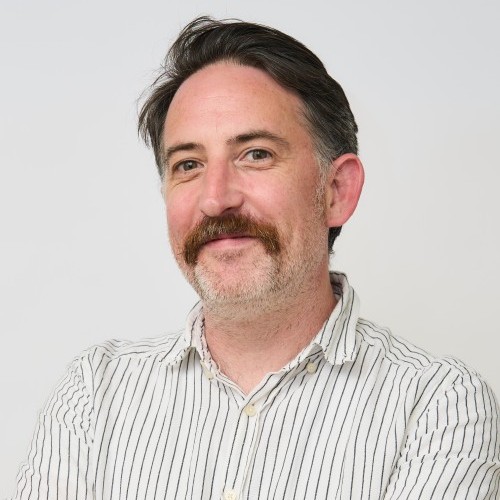
Michael Parsons
Cross-programme director, Impact on Urban Health, UKMichael joined the Impact on Health Programmes team in June 2019 and works on its emerging cross-programme approach. Before this, he worked for several years at some of the UK’s largest charities, across education, ageing, health and civic engagement, among other areas. His particular interest is in the causes and effects of inequality.10.45Community health impact assessments: A Trojan horse to reduce health inequities in cities
Joshua Artus
Director, Centric Lab, United KingdomAn urban geographer focusing on the relationship between urbanisation and health outcomes at the community level. Josh helps run Centric Lab, a non-profit organisation prototyping ways to use health-based scientific evidence to support justice movements, surface and socialise non-western epistemologies and create language to articulate the injustices felt by many communities about our shared health. Using neuroscience and environmental data to identify how biological inequity contributes to poor health outcomes in neighbourhoods and peoples that have been racialised and marginalised, Centric Lab use this research to build open-access community tools, create new narratives and framings of health, and provide organisations with expertise and insights on health and place.Community health impact assessments: A Trojan horse to reduce health inequities in cities
Abstract Copy
Non-communicable diseases (NCDs) remain prevalent and growing, and an ability to tackle the wider determinants of health through urban planning has not yet been achieved. We propose that there is a very simple yet powerful way to overcome these issues. By reimagining and redesigning the health impact assessment to be community-led – a community health impact assessment (CHIA) – all relevant stakeholders in urban development can improve long-term health outcomes for urban residents.
Our approach sits in three spheres:
1) Firstly, rethinking the methodology of the traditional HIA to focus on communities and systems. Instead of assessing the merits of an intervention or policy in isolation, as it is practised now, we first seek to understand the existing community vulnerabilities to changes by assessing their existing “burdens” using a scientifically informed, justice-led ecological assessment of health. This broadens understandings of health to allow for action across silos and address multiple challenges that have multiple benefits.
2) Secondly, we define “burden” as a quantifiable combination of environmental (air, noise, light, heat pollution) and psychosocial (deprivation, alienation, marginalisation, etc) stressors people are exposed to in their local urban environments. We qualify this weighting through existing literature on the stress-response-system, whereby chronic and disproportionate exposure to stressors is known to lead to the dysregulation of endocrine, immune, and metabolic regulatory systems, key pathways to the development of NCDs.
3) Lastly, we use a community-led co-creation process to carry out the CHIA. This brings in lived experiences of interacting with various urban systems (wider determinants of health).
To support our hypothesis, we have been running a funded and educational pilot programme with 12 community groups from across the UK using a toolkit to create their own CHIAs. Initial learnings demonstrate a desire to see greater CHIAs have influence on governance, the linking of health to climate, cross-departmental action, as well as community learning opportunities on determinants of health research. We see great opportunity for authorities to engage with communities and urban stakeholders and embody the WHO’s intended interlinked values of HIAs: democracy, sustainable development, ethical use of evidence, and equity, while adding systems thinking, and community-led research.Learning Objectives
- Participants will gain an understanding of the Community Health Impact Assessment process and how it differs from traditional approaches to Health Impact Assessments
- Participants will gain an understanding of the different environmental and psychosocial elements that lead to poor health in an urban environment
- Participants will be able to identify opportunities to use Community Health Impact Assessments in their contexts and influence cross-sector and -departmental work.
11.05Spotlighting community research as a tool to explore health inequalities with communities
Sharon Brooks
Project co-ordinator, Swiss Media, United KingdomSharon is an entrepreneur with an eclectic range of experiences spanning various industry sectors from radio broadcasting, marketing health promotional campaigns to licensing copyrighted music internationally and property portfolio management. She was recently appointed a board of Trustee to mental health charity Mosaic ClubHouse in Brixton and sits as a member of the organisers of the BRIT Awards / BPI Equity & Justice Advisory Group. Sharon Chaired, Black Thrives Lambeth’s - participatory grant making ‘Employment Working Group’. The representatives were composed of leaders of grassroots organisations, individuals with lived experiences, public health managers and community researchers who together co-designed the grant decision making process which led to the successful distribution of £300K to independent individual ideas, project initiatives and charities that supported black people with long-term health conditions and disabilities into employment.
Gabriel Ajala
Animator, Geroff Visuals, United KingdomWith over 15 years of design experience Gabriel has a passion for content creation focused on social and educational content. Based in Hackney, East London, his diverse and socially aware environment has shaped his career and community involvement. Gabriel has always been an advocate for community issues and participated in various projects to promote a better way of life. He is part of the Leaders of Tomorrow scheme, mentoring young people, and serves as the creative director for Change in Youth, collaborating with schools and colleges in East London. In 2015, he founded Geroff Visuals to foster diversity and social inclusion in animation and commercial media, partnering with organizations like the NHS, Loughborough University, and The Africa Advocacy Agency. His animated videos, used in community research projects, have received acclaim, including a showcase at the Engage Live conference in Bristol.
Jide Johnson
Animator, Aniboxx, United KingdomManaging Director and Animation Producer Jide Johnson started Aniboxx studios out of the frustration of noticing a lack of underrepresented characters in Animated content. Working with brands such as The NHS and the Global Health Workplaces company, Aniboxx has always been helping brands in the health space communicate their messages, which is why it made perfect sense to produce the three animated stories we did for Impact On Urban Health. Aniboxx launched Little Miss Hug for the Mr Men brand with an advert, Written, produced and Directed by Jide. Aniboxx then began to work with Cartoon Network (Turner Broadcasting) on animation and content for their flagship shows across 5 main channels, for 2.5 years. Jide then realized he had a passion for telling his own stories and has since gone on to tell a number of stories based on the underrepresented, for the big screen. Aniboxx worked on a documentary called “Spending Black”, featured on BBC iPlayer in Oct 2021, focused on the power of spending money with Black owned businesses. Since then, the Aniboxx team have won a place on the Sony Animation Pictures talent league to develop their first 2D animated series Family Britannia about a British born Nigerian Big Tech Genius. Following the series development, Jide collaborated with the Milkshake / Nickelodeon team to write, produce and voice narrate Aniboxx’ fīrst in house documentary “Where are The Smart Black Boys?” exploring the lack of intelligent black males featured in children’s content. Jide has recently produced a short movie about a Ghanaian Software Engineer: “UNCLE” for Channel 4’s Random Acts platform. This can now be viewed on 4OD. Aniboxx is currently producing four episodes of the American Animated series “The Tuttle Twins” (Season 3). Jide also launched the “Aniboxx Access internship scheme” for up and coming 2D character animators, helping close the UK animation skills gap.
Rianna Raymond-Williams
Portfolio manager, Impact on Urban Health, United KingdomRianna co-leads our work on trust in health systems and the role trust plays in creating health equity. As part of her work, she will collaborate with a range of stakeholders to understand the challenges and barriers Black and other minoritised communities experience when engaging with health systems. She intends to work with community members, academics, practitioners, and activists to devise solutions and initiatives with the hope of creating better health outcomes for Black communities in Lambeth and Southwark.Spotlighting community research as a tool to explore health inequalities with communities
Abstract Copy
Our project aims to visually represent community research practices within Lambeth and Southwark, utilising animation to address health inequities and celebrate the contributions of community researchers. This initiative focuses on Black and racialised communities disproportionately affected by adverse health outcomes. By employing an iterative participatory research approach, a creative team collaborates with community researchers to develop six animations on mental health, neurodiversity, and long-term health conditions.
The animations are designed to depict community research practices visually, highlighting how these practices address health inequities in Lambeth and Southwark. They cover specific health-related topics such as mental health, neurodiversity, and long-term health conditions, illustrating community researchers' active involvement and contributions. This approach uses animation to engage with and educate the community, making complex research accessible and relatable.
Framework: The project is grounded in participatory research methodologies, emphasising collaboration with community researchers to address systemic health inequities. It integrates principles of decolonising research methods, prioritising cultural sensitivity, contextual relevance, and the amplification of marginalised voices.
Practical application:
Collaboration: A creative team and community researchers co-develop six animations on crucial health issues.
Engagement: The project uses animations as educational and engagement tools to communicate research findings and practices.
Outcomes:
Empowerment: Community researchers gain ownership and agency over the research process.
Trust building: The collaborative process fosters mutual trust between researchers and the community.
Amplified Voices: The project centres on and amplifies narratives often marginalised in academic research.
Implications:
Research practice: The project serves as a model for integrating community voices into research, challenging traditional power dynamics.
Health equity: By highlighting the contributions of community researchers, the project advocates for more equitable health outcomes.
Social change: The project aspires to inspire broader social change and solidarity among stakeholders committed to health equity, promoting a just and equitable research landscape.
By using animation to engage with the community, this project not only educates but also celebrates and honours the contributions of community researchers, aiming for a lasting impact on research practices and health equity.Learning Objectives
- Understand Participatory Research Methodologies
- Recognise the Role of Animation in Community Engagement
- Analyse Strategies for Addressing Health Inequities
11.25Storytelling methodologies for urban health research and practice
Helen Pineo
Research Associate Professor, University of Washington, United StatesHelen Pineo, PhD MRTPI is an urban planner and Research Associate Professor in the Department of Urban Design and Planning at the University of Washington. Her research focuses on how urban policy and development can support health and sustainability. She contributes to the evidence base about why and how to do healthy urbanism by using transdisciplinary approaches and amplifying the needs of under-represented communities and the planet. Her current and past research involves participatory, systems thinking and other methods to study: urban transformative change, housing and health, urban health metrics and evidence use in government. Her book, Healthy Urbanism (Palgrave Macmillan, 2022) provides a multi-scalar conceptualization of healthy urban environments, integrating equity, inclusion and sustainability. Helen lived and worked in London for 16 years, most recently as an Associate Professor at University College London, and previously as an urban planner working on projects in the UK and internationally.
Gemma Moore
Associate Professor (Teaching) and Senior research fellow in Evaluation, University College London, United KingdomDr Gemma Moore is an Associate Professor (Teaching) and Senior Research Fellow, at the Institute for Environmental Design and Engineering at the Bartlett, UCL. Gemma is an interdisciplinary, applied social scientist, whose research and education focuses on developing approaches and methodologies for the collective production of knowledge in the field of sustainable, healthy urban environments. This involves practices of participation and engagement in research and education processes. Between 2020-2023 Gemma was part of a large collective research team on the ‘Complex Urban Systems for Sustainability and Health’ programme, which explored, and evaluated, how different forms of evidence are negotiated and applied in complex multi-stakeholder urban health initiatives. Gemma is a member of the Bartlett Faculty leadership team as Faculty Impact Lead. She also leads, with UCL colleagues and Compost London, an engaged learning programme (the Evaluation Exchange) which supports community organisations and teams to build research and evaluation capacity.Storytelling methodologies for urban health research and practice
Abstract Copy
Community knowledge of the social determinants of health is increasingly understood as important for health sciences research and urban development practice. This shift away from biomedical models, towards more diverse ways of knowing, is opening new possibilities for supporting health equity through urban development. There is now greater attention to the root causes of health disparities, such as poverty and discrimination, and the need to move away from top-down models. Academic and government institutions need to develop new ways of working to fully understand diverse community perspectives, which can be undermined by traditional power dynamics and interests. Storytelling has been theorised as the basis through which we experience and comprehend life, including how we form and share our beliefs and motivation for action. This workshop will bring together experiences from researchers and community-based organisations who have adopted storytelling methods to learn from residents about how the urban environment affects their health and wellbeing and processes of urban change.
Storytelling research methodologies can create benefits for participants and researchers that are distinct from other approaches. In relation to health, storytelling methods have been evaluated as producing richer data about culture and context, including nuanced insights into participants’ behaviours. Storytelling is also seen as a safe way to talk about difficult experiences and to connect to wider audiences. There is a need to be aware of the risk of ‘stealing’ stories or incorrectly retelling them in ways that compromise the storyteller’s original intentions. Methodological rigour and ethics when combining diverse narratives are essential.
Stories and narratives are powerful motivators of change and they are increasingly used as tools in collaborative urban planning. Residents’ voices may contain perspectives that conflict with each other and dominant narratives within a city. Through listening to others’ stories and developing new ideas and possibilities for how a city could be, stories can be a catalyst for urban change. Urban storytelling practices have also been developed as decolonial planning approaches to activate agency and disrupt existing power structures and hierarchies of knowledge.
This session engages experiences and learning gained through the application of storytelling methodologies by researchers and community-based organisations. Presenters will share examples of how narratives have been used to develop new ways of managing and studying complex challenges, such as equitable urban regeneration. Participants will develop new ideas about the application of storytelling approaches in research and practice.Learning Objectives
- Explore the role of storytelling in equitable, healthy and sustainable urban research, development and policymaking
- Examine ethical and practical considerations of sharing community knowledge through storytelling that avoids ‘stealing’ stories and epistemic injustice
- Discuss ways that storytelling methods can be used to centre underrepresented community voices in urban narratives
11.45Encouraging engagement for societal, economic and environmental impact
Jo Morrison
Co-founding director, Association of Collaborative Design, UKJo operates at the intersection of people, place, technology and data. Focusing on digital innovation and multidisciplinary collaboration, she aims to create more pleasurable, sustainable and person-centred environments through digital placemaking practices. Her sector experience includes health, education, culture, travel and the built environment. Jo is Co-Founding Director of the Association of Collaborative Design, Director of Digital Innovation and Research at Calvium, a Fellow of the Royal Society of Arts and the Institute of Place Management, as well as an Expert on the UK government's High Streets Task Force.Encouraging engagement for societal, economic and environmental impact
Abstract Copy
The Engagement Overlay to the RIBA Plan of Work was launched this year and aims to standardise and elevate engagement practices among architects and built environment professionals, fostering a more inclusive and democratic approach to urban design. It provides a structured method for early, effective, and proportionate stakeholder community engagement throughout all work stages, aligning with the existing RIBA Plan of Work framework.
Methods: Led by the Association of Collaborative Design, in partnership with Sustrans and the Royal Institute of British Architects, the Engagement Overlay is the result of a two-year research project. A participatory approach was adopted, with research methods including: group workshops; semi-structured interviews and content analysis. More than 40 contributors and participants from over 30 organisations took part.
Results: The Engagement Overlay goes beyond conventional public participation methods, emphasising the importance of shared decision-making and establishing benchmarks for exemplary practices. By promoting early and sustained engagement, the Overlay helps build trust, transparency, and accountability among project teams, clients, and stakeholders – fostering resilient and adaptable communities. The technical framework provided by the Engagement Overlay supports built environment professionals in delivering evidence of high-quality engagement, a critical requirement of many procurement frameworks. This proactive approach aligns with the SDGs, aiming to create environmentally resilient urban spaces with strong social values that effectively respond to climate change and biodiversity crises.
Key benefits of the Engagement Overlay include: facilitating a more democratic design approach; enriching projects with local knowledge and diverse perspectives; promoting shared decision-making; establishing benchmarks for best practices; building skills within the architecture and built environment professions; ensuring projects meet stakeholder needs and aspirations; and enhancing client and stakeholder communications.
Conclusion: The Engagement Overlay is a critical tool for enhancing the quality of public participation in urban design. It provides a comprehensive framework that supports sustainable urbanisation, encourages collaborative decision-making, and ultimately aims to foster places that are socially and environmentally resilient.Learning Objectives
- Recognise and refer to the Engagement Overlay to the RIBA Plan of Work
- Explain the significance of engagement to other built environment professionals
- Refer to examples of participatory and collaborative practice
12.05Panel discussion12.30 - 14.00Video+Poster Gallery, workshop, lunch and networking14.00 - 15.30Session 26- Citizen science: Informing planning policy and practice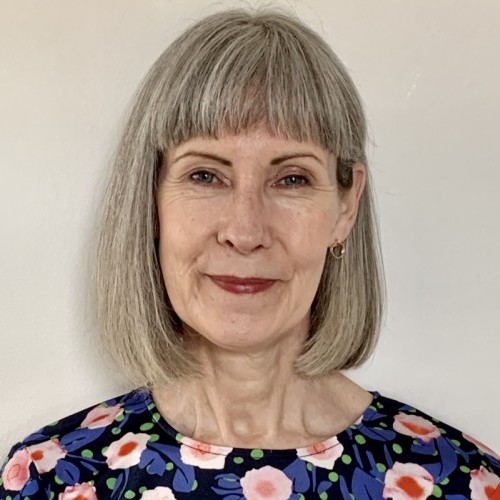
Julia Thrift
Director of healthy place making, Town and Country Planning Association, UKJulia's work at the TCPA focuses on collaborating with a wide range of partners to help create healthier places. She contributed to 'Putting health into place', the guide to creating healthier new communities, published by NHS England in 2019 and produced through a collaborative partnership between the TCPA, the King’s Fund, the Young Foundation, NHS England, Public Health England, and the ten NHS England Healthy New Towns. In addition, she leads the national Green Infrastructure Partnership, a network of more than 2000 people and organisations working to improve green infrastructure in the UK. Throughout her career she has been interested in the links between the design of the built environment and the quality of people’s lives. Earlier in her career, she was the founding director of CABE Space, the Government's advisor on policy and practice regarding England's urban parks and public spaces. She began her career as a journalist, writing about design, architecture and art. She has a degree in philosophy from UCL.14.00Compassionate places: Implementing a health and human-oriented design model into policy and practice
Natasha Reid
Founder, MATTER . SPACE . SOUL, United KingdomNatasha Reid is founder of MATTER SPACE SOUL, a specialist design consultancy and creative lab shaping places for health, wellbeing and social sustainability. Having trained and practiced in architecture, she has focused on the social, psychological and emotional impacts of places over the last decade and often speaks at conferences on forward-thinking approaches to pressing urban issues. She is a “Healthy Places and Inclusive Design” expert for two London borough review panels, Fellow with the Center for Conscious Design and an Associate with the Quality of Life Foundation. She studied Architecture at Cambridge University and gained a Distinction for her Professional Diploma in Architecture at The Cass. She is an advocate for the power of design to create change that matters, recognised in international publications such as Wallpaper* and Elle Decoration, as a "Groundbreaker" and "Women to Watch".Compassionate places: Implementing a health and human-oriented design model into policy and practice
Abstract Copy
The presentation will share implementation of a new transdisciplinary model for a healthy, human-oriented design and placemaking into policy and practice as a demonstrator to inform wider systemic change.
Framework: From "what" to "how": The Place Quality Model aims to change the way places are shaped to be based on the complexity of human needs and the qualitative human experience of places, and go beyond quantitative “bricks and mortar” factors. Drawing from a wide variety of research areas, including public health and the human sciences, it sets out a multidimensional, structured approach to embed human benefits into the everyday practice of shaping places.
The presentation will share how this intervention has been applied in different contexts:
• Place Quality Model development and implementation in a London local authority’s spatial planning requirements (Brent Council);
• PHIRST (Public Health Intervention Responsive Studies Team) academic evaluation by public health researchers at University of Bristol to inform wider policy application (completing July 2025);
• Place Quality Model applied in industry to design and development projects in collaboration with a neuroscience researcher (UCL);
• Trial for community engagement to support policy development with a public health researcher (UCL) and artist/ cultural curator.
Outcomes and implications:
• Share learnings and insights from different practical applications across policy, industry practices, community participation and cross-disciplinary collaborations;
• Explore barriers and opportunities for wider industry change;
• Share emerging links to wider change-making programmes to convene built environment stakeholders to make systemic change towards the urban health agenda; and
• Conclude with the case for a new “bridging” discipline at the intersection of fields
Background:
There is increasing recognition that architecture and urban design have a profound impact on people’s health, and community wellbeing (Public Health England 2017). But despite significant evidence and scientific research on the relationship between the built environment, human health and social wellbeing, the way that places and buildings are designed today does not put this critical knowledge into practice. It is increasingly acknowledged that current practices of design are insufficient to protect and improve health, or meet people’s needs (Pineo 2022, McCay and Roe, 2021).Learning Objectives
- Learnings and insights from change-making in practice
- Multidimensional and transdisciplinary approaches
- Barriers and opportunities towards wider industry change
14.20Leveraging community-scale research for informed community planning and design
Francesqca Jimenez
Senior social scientist, HDR, United StatesA Senior Social Scientist at HDR, Francesqca Jimenez investigates the ways environments impact human health, happiness, and well-being. Francesqca holds a Master of Science in Applied Research in Human-Environment Relations from Cornell University’s Department of Design and Environmental Analysis with a minor in Organizational Behavior, and a Bachelor of Arts in Psychology, English and Women’s Studies from the University of California-Los Angeles. Her primary research interests are environmental psychology, linking environments to healthy behaviors, and advancing social equity through design. In her work, she endeavors to understand how built, natural, and social environments affect behavior, cognition, emotion, identity, and representation.
Jeri Brittin PhD
Director of research, HDR, USADirector of Social and Behavioral Sciences at HDR, Dr. Jeri Brittin leads a transdisciplinary team of social, behavioral, and health scientists whose work informs optimal strategies, planning, organizational and design decision-making. With her background in design, doctoral training in social and behavioral health, and experience leading multi-disciplinary teams, Jeri is passionate about developing strategies, systems and environments that promote positive and equitable outcomes. Her work focuses on wellness and behavioral outcomes related to environmental and social determinants in buildings and campuses, neighborhoods and cities, and organizations. Dr. Brittin maintains an active national and international research collaboration network, is a frequent speaker, has published numerous refereed articles, and serves on several national committees focused on design and health.Leveraging community-scale research for informed community planning and design
Abstract Copy
Architecture and engineering (AE) has always been committed to community betterment but demands to address persistent community-scale environmental and social issues transcend many traditional boundaries of technical, engineering, and architectural design approaches. This session aims to address these challenges by integrating concepts from community health promotion, resilience, and the social and behavioural sciences into the design and planning process.
Our presentation will explore the definition of a healthy community from environmental, social, and behavioural perspectives, and discuss feasible, real-world environmental design strategies for improving community health. We will delve into the concept of a resilient community, the role of innovative nature-based solutions in enhancing resilience, and the interconnection between health, resilience and place.
We champion a flexible, practical framework that will provide guidance to gear projects towards improvement of community-scale outcomes. This framework emphasises the intersection of community wellbeing, equity, and sustainable design. It leverages community-scale research as a rigorous and inclusive evaluation process, providing decision-makers with critical information about community challenges and aspirations.
To illustrate the practice-based application of community-scale research, we present two case studies. The first, from the City of Richmond, BC, Canada focuses on a community needs assessment that examined community utilisation of parks, recreation facilities, sports venues, arts and culture sites, and libraries. The study demonstrated how these community spaces contribute to a complete community concept, informed public decision-making, and promoted inclusivity.
The second case study, conducted on behalf of the Madison Metropolitan Sewerage District in Madison, WI, USA, used a behavioural science and experimental contingent valuation approach to understand how and to what degree community constituents value a modern and sustainable water system. The study revealed that the community highly valued sustainability and quantified willingness to pay towards that goal.
In this discussion, we will explore how healthy and resilient communities emerge from thoughtful planning informed by research. We believe that community-scale research is necessary to inform critical infrastructure projects that promote community wellbeing for all. Only in partnership will we be able to shape environments where wellbeing and sustainability intertwine and address our communities’ most pressing issues.
Learning Objectives
- Discover the value of community-scale research to inform equitable and sustainable design and decision-making.
- Gain an understanding of the multifaceted concept of community health, considering environmental, social, and behavioural dimensions.
- Learn practical and feasible approaches to address community-scale challenges to health and sustainability.
14.40Protocol for citizen measurement of NO2 in school environments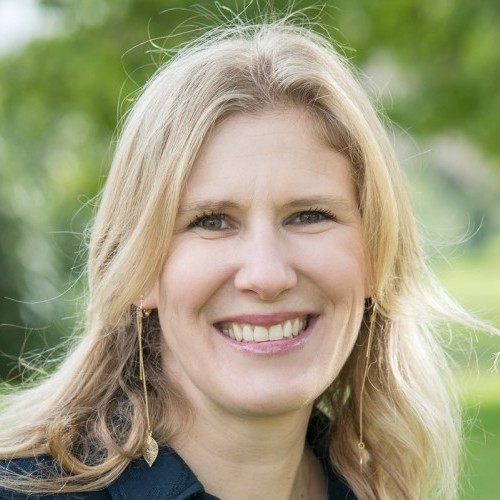
Carolyn Daher MPH
Co-ordinator, Urban Planning, Environment and Health Initiative, Barcelona Institute for Global Health, SpainCarolyn Daher is a public health specialist with over 20 years of international experience connecting research, education and implementation to build healthier communities. Carolyn has a B.A. in Environmental Studies (Brown University), Master in Public Health (Johns Hopkins Bloomberg School) and a Master in Psychosocial Intervention (University of Barcelona). Her work centers on how to generate greater impact in policy and society using scientific evidence, and ensure evidence-based practices in the creation and implementation of projects to promote health, especially in urban contexts. She currently coordinates ISGlobal’s Urban Planning, Health and Environment Initiative.Protocol for citizen measurement of NO2 in school environments
Abstract Copy
Air pollution is among the leading environmental threats to health worldwide. Children are especially vulnerable to long and short-term health impacts including respiratory, cognitive and mental health impacts. in cities, school environments, where children spend a significant amount of their time, are often hotspots for air pollution. Yet local information on air pollution levels around individual school is often not available. This information is relevant for raising awareness and also for stimulating action in terms of policy and interventions.
As part of the Clean Cities Campaign, ISGlobal and 4Sefera have developed a standardised protocol for N02 Palmer Diffusion tubes monitoring around school environments. The tubes are economical, easy to use, and provide the most reliable estimates of traffic-related air pollution by low-cost sensors. The protocol was created after reviewing the collective experiences of diverse monitoring sensors and their protocol and was then tested with CCC partners and revised for further clarity. The protocol offers detailed instructions for designing, implementing, and interpreting and sharing results for NO2 measurement campaigns in a standardised way. The protocol is a valuable contribution to empower local citizens and school communities to gather data about their local context and use this information for awareness, advocacy and monitoring efforts. The protocol contributes to the growing body of citizen science tools and can be used in different urban contexts worldwide.
In this presentation, we will describe the consultative process used for developing the protocol, explain the main contents for monitoring campaigns and opportunities to use the protocol and results for urban and school transformation.Learning Objectives
- Share tools for improved practice
- Build awareness of the link between air quality and health
- Empower communities for evidence based action
15.00Panel discussion15.30 - 16.00Video+Poster Gallery, coffee and networking16.00 - 17.00Session 27- Learning from the past: Entrepreneurial approaches to delivering transformative social outcomes for our poorest communities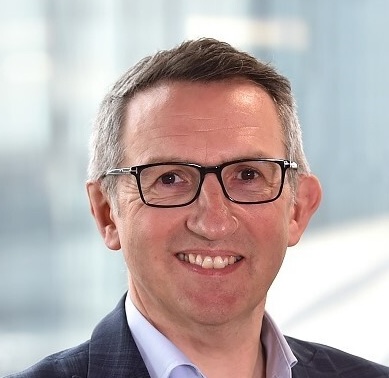
Rob White
chief executive officer, Brabners, UKRobert is the driving force behind our strategic change programme which has already delivered positive profitable growth. He is passionate about our firm’s independent status and the opportunity it offers to deliver an enhanced experience for colleagues and clients. Robert is a senior business leader with over 20 years’ experience developing and delivering strategic change and improving financial performance in competitive markets. He held a number of executive management roles at multi-site international companies prior to joining Brabners. He has broad sector and service experience and is a qualified chartered accountant. Robert is a member of our Management Board, Sector Executive Board and Client Services Board. He's also the Chair of The Brabners Foundation and Co-Chair of the True North Advisory Council.16.00Learning from the past: Entrepreneurial approaches to delivering transformative social outcomes for our poorest communities
Catherine Smith
CEO, Well North Enterprises, UKCatherine has supported organisations from both public and private sectors in the design and delivery of transformational OD projects. An individual who enjoys collaborating with like-minded people to make the world of work a great place for all. She supports and challenges leaders and their teams to build great cultures, purposeful missions and businesses that are sustainable. Through building working relationships that are based on trust, openness and vulnerability she enjoys long lasting and mutually beneficial friendships. Following a successful corporate career culminating in a board position for a subsidiary UK PLC she has over 18 years’ experience in people and organisation development and has had the privilege of working with business across many market sectors including: NHS, LA, Police, Education, Manufacturing, Media, Pharmaceuticals, Finance, Insurance, Property and Energy. She has experience in: • Leadership Development • Team Development • Change Management • Culture & Values • Executive Coaching • Stepping Out from the top team • Career Development She lives on the Wirral and when not at work can be found walking the Welsh hills with her dog; learning to row as part of a quad and enjoying the company of friends at a very long standing book club.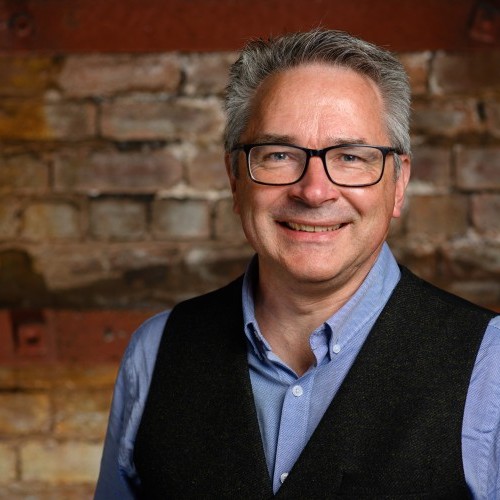
Neil Orpwood
Head of healthcare, HLM Architects, UKNeil qualified as an architect in 1995, having started his degree at North East London Polytechnic in 1985. He is a Chartered Member of RIBA, and has worked at HLM Architects in Sheffield since leaving full-time education. Heading up HLM’s Healthcare Team both nationally and internationally, he has a detailed knowledge of this specialist sector, working on a spectrum of projects, from small refurbishments through to multimillion-pound facilities.
Lord Andrew Mawson
Chair, 360 Degree Society, UKLord Andrew Mawson is a leading British social entrepreneur. He became Chairman of Well North Enterprises in 2019 following the success of the Well North programme, which Andrew led from 2015 – 2019. This was a Public Health England initiative which brought together the public and private sectors, and local communities to improve the health of people living in some of the most deprived parts of the North of England. Well North has now evolved into 360 Degree Society, a social business driving a national mission to put people at the heart of places and create health and wealth outcomes for communities across the UK. So far, the 360 Degree Society team has grown 15 Innovation Platforms across the country. Andrew is perhaps best known for founding the Bromley-by-Bow Centre in East London, the first working example of a fully integrated primary health care facility in the country. The centre today has over 287 staff, 97 businesses it has built with local people, and is responsible for 55,000 patients across Poplar. The centre is visited by over 2000 people a year from across the country and internationally. The 360 Degree Society has grown out of this 40-year track record and is now taking the principles originally developed at the Bromley by Bow Centre and working with partners to apply them in challenging communities across the country. Andrew, also founded Community Action Network (CAN) in 1997, a national programme for social entrepreneurs, Poplar Harca (one of the country's first housing companies) and Leaside Regeneration Ltd, which brought in over £100 million investment into the Lower Lea Valley. Andrew has now “graduated” from most of these ventures and each of them continues as a successful organisation. Through 360 Degree Society and Andrew Mawson Partnerships, Andrew works alongside a leading national thinkers, entrepreneurs and doers to grow and replicate his approach and successes including the national Science Summer School with Professor Brian Cox. In 2012, Andrew was made a Freeman of the City of London. He is also the author of the book, “The Social Entrepreneur: Making Communities Work.” Andrew’s work is also featured in Lord Crisp’s latest book (former CEO of the NHS) ‘Health is made at home; hospitals are for repair’. Andrew and his partners wrote the first paper proposing that the Olympic Games be brought to East London in 2012. He was involved in the Olympic project for 19 years from day one. He was a Director of the Olympic Park Legacy Company (OPLC) and then the London Legacy Development Corporation. Andrew Chaired the Regeneration and Community Partnerships Committee for 10 years on both boards, stepping down in 2018. Since the Games this development corporation has planned, developed, and managed the Olympic Park in East London and is creating a lasting legacy from the 2012 Games. The new £1.1billion East Bank campus development has brought to the Park the Victoria and Albert Museum, University College London, the BBC and Sadlers Wells, the London College of Fashion to name a few. This £1.2 bn project was Andrew and Paul Brickell’s original idea in 2006, which was an attempt to build an Innovation District in the heart of the east end of London based on the Bromley principles, bringing together business and social entrepreneurs. The project was backed by the then Mayor of London, Boris Johnson, when he was Chairman of the London Legacy Development Corporation. Under the AMP banner, Andrew co-founded One Church 100 Uses CIC and launched the Water City Group to create and implement a vision for East London revitalised by the opportunities of the 21st Century and the 2012 Olympic Games. Andrew was made a life Peer in 2007 in recognition of the social impact of his work, and he now sits as an independent Crossbench Peer in the House of Lords. 
Liz Towns-Andrew
Head of regional & business engagement, The University of Huddersfield, UKLiz is a chemist by training and has extensive experience of working at the academic-industry interface. She was Director of Innovation for the Science & Technology Facilities Research Council before joining the University of Huddersfield and led the development of the national science and innovation campuses in Cheshire and Oxfordshire. She is 3M Professor of Innovation and Director of External Engagement for Huddersfield Business School, identifying opportunities for development of research activity and strategic partnerships. Until December 2020, she was Director of Research an Enterprise for the University and received a Queen’s Award for Enterprise Promotion for establishing the 3M Buckley Innovation Centre in 2013. In 2017, she was elected Chartered Companion of the Chartered Management Institute. She received an OBE in the 2020 New Years Honours list for services to Business, to Enterprise and to Public and Private Sector Collaboration and is the Regional and Business lead for the University’s major development – the National Health Innovation Campus. Liz is married to Steve and has a daughter Emma and outside work loves to spend her time gardening in her allotment, travelling and researching her family tree.
Rachael Baker
Managing director, JJ Smith, UKRachael, a 4th generation family member, joined the business in 2013 and became Managing Director in 2022. With a scientific PhD and a number of business administration qualifications, Rachael is passionate about encouraging more diversity within engineering and construction. She is also a member of the Liverpool City Region Business and Enterprise Board, working with others to make the region the best place in the UK to live and work.
Atul Patel
Superintendent pharmacist and prescriber, Mildcare, UKI came to England as a British Indian refugee in 1973, from Uganda when I was 13 years old. I attended Balham Boys School, and in my spare time trained as an Electrical appliance engineer apprentice. By the age of 16 I was proficient in repairing electrical appliance such as fridges, fridge-freezers, vacuum cleaners and other small household appliances like irons and kettles etc. I used these skills to support my family and also fund my university degree of Pharmacy, which I completed in Leicester, graduating in 1983. I worked as a Locum Pharmacist for two years and alongside this, in partnership with my brother, also ran a successful electrical repairs business called Electrocare in Tooting. I established my first company called Mildcare Limited in 1983 opening my first Pharmacy practice trading as Lincoln Pharmacy, and opened a second practice in Southwark in 1998. I served in the East London LPC and was part of the working group that introduced Flu Vaccination (which is now a nationally commissioned service), EHC, Minor Ailments and Methadone Supervision services in Tower Hamlets. I have always had an interest in flying planes, and in my spare time I successfully qualified as a pilot in 1989. I enjoy participating and trying my hand at most sports as well, in particular being part of cricket clubs and 5-a-side football teams in the past. I still enjoy golf and, most recently, have joined a padel club. During my 40 years of practicing as a Pharmacist I have always been involved with developing and addressing ways to meet our patients’ healthcare needs within our community; and have been aware of the need to always better our integrated approach to healthcare management. Since 2006 I have also been involved in “The St. Paul’s Way Transformation Project”, working closely with Lord Andrew Mawson and Partnerships, and was appointed director of a new social enterprise named St Paul’s Way CIC which was founded in March 2012 to kick start the Transformation in East London. In recent years, the NHS has continually encouraged pharmacists to become part of an integrated primary care team. I have always dedicated time to my continuing professional development and I qualified as an independent prescriber in 2016. In 2023 I was awarded Independent Prescriber of the Year by Pharmacy Business. I am now part of the NHS Pathfinder site in Southwark, and with this opportunity furthering my professional development, I hope the journey will continue to help me to fulfil my company’s, as well as my personal, mission statement: “to serve my patients and community to the best of my ability, to ease the burden of their disease and improve the quality of their lives”.Learning from the past: Entrepreneurial approaches to delivering transformative social outcomes for our poorest communities
Abstract Copy
Greater community engagement means greater impact. Projects can be more joined up, more aspirational, and can continuously learn from the best examples from around the UK and beyond.
In this session, the urgent need for innovative and entrepreneurial approaches to fix a broken system and to avoid the repeated mistakes of the past will be explored and addressed.
A panel of experts, including experienced practitioners, international leaders and communicators, equipped with credible evidence and methodology, will share how they are driving system-wide change by creating interconnected communities where housing, job creation, education, and health provision are seamlessly integrated, often in very challenging circumstances.
This session will highlight the essential roles of businesses, faith groups, educational institutions, health providers, as well as all levels of government in ensuring the wider social determinants of health are addressed for individuals and our communities. It will discuss how real change often requires sustained commitment over many years and ask: How can we work together to create and sustain genuinely healthier, wealthier, happier and more interconnected communities?End of Community impact stream -
Population health
Space 9
10.45 - 12.30Session 28- Urban health impact at a local level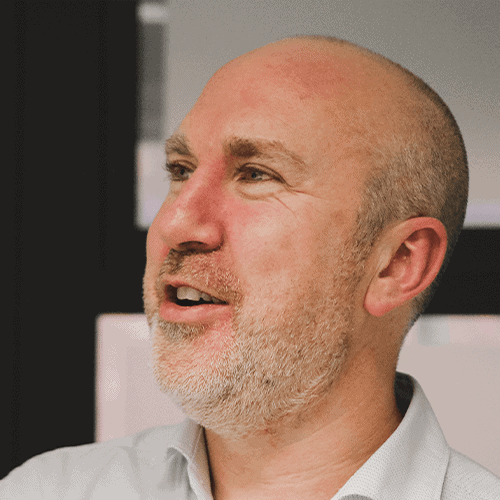
Max Farrell
Founder, LDN Collective, UKMax is Founder & CEO of the LDN Collective, a network of built environment experts and creatives fighting to improve people’s lives and the planet’s prospects. Members are experts in social impact, zero carbon and modern methods of construction as well as architecture, engineering, graphic design and film-making. They are a dynamic and collaborative ‘one stop shop’ for projects anywhere in the world. Current projects include masterplans for garden communities in Oxfordshire, Peterborough and Solihull; new health and wellbeing resorts in London and the South East; detailed planning applications for Clarion, the UK’s largest housing association and #ParkPower – a crowdsourced vision for the future of London’s green spaces. Max’s expertise lies in urban planning & strategic communications. He was a Partner at Farrells for 10 years, the internationally renowned architects with offices in London, Hong Kong and Shanghai, before leaving to set up the LDN Collective. In 2021, Max was appointed Chair of Cultural Co-Location for Creative Estuary. With £4.3m funding from DCMS, as part of the Thames Estuary Production Corridor, the ambition is to transform 60 miles of the Thames Estuary into the most exciting cultural hub in the world. Max was Project Lead and Author of the Farrell Review of Architecture and the Built Environment, commissioned by the UK Government, which made 60 recommendations spanning education, outreach & skills; design quality; cultural heritage; economic benefits & architecture policy, many of which have been implemented. He is an adviser to London National Park City, Urban Design London, the Place Alliance, the Urban Room Network, the National Arts and Place Consortium, Community Consultation for Quality of Life and Wild Streets.10.45Creating health and wellbeing at the local level
Shaun Andrews
Director of UK planning strategy, Prior + Partners, United KingdomShaun is a senior urban planner and Director of UK Planning at Prior + Partners. He draws on his extensive experience in both the private and public sectors, with Shaun’s expertise spanning the delivery of complex regeneration projects including new communities, formulating strategic planning documents, and crafting masterplans that shape the future of neighbourhoods and urban centres. Shaun is passionate about championing built environment principles and practices that prioritise the creation of healthy communities and places. He is a co-author of ‘The Healthy City’ on behalf of Key Cities, which seeks to embrace the full potential of our urban landscapes to ‘create health’. A Planning Expert to the Government’s High Streets Task Force, Shaun is also collaborating with the Quality of Life Foundation to advise the Local Government Association on a holistic resource for councils to understand and leverage their powers in promoting public health through planning.
Matthew Morgan
Co-founder, director, Quality of Life Foundation, United KingdomMatthew Morgan is the Director and co-Founder of the Quality of Life Foundation. He is responsible for setting strategy with the Board of Trustees, overseeing the Foundation’s commercial services and delivering lasting impact with the Quality of Life team, itself focused on highlighting the impact of the built environment on people’s lived experience. With over 20 years’ experience in writing and communications, Matthew has previously worked with architects, engineers and developers; in book and magazine publishing; and with charities and start-ups. He is a participant on a number of advisory boards and chairs a multi-stakeholder group that advises on community engagement as part of the UKRI-funded CCQOL (Community Consultation for Quality of Life) project. A published author and mental health advocate, Matthew is particularly interested in how communities are formed and their effects on people’s physical, social and psychological wellbeing, an interest he developed while growing up in an intentional community in Kent.Creating health and wellbeing at the local level
Abstract Copy
Despite a growing recognition of the importance of spatial and strategic planning, a period of deregulation in the planning sector has occurred, including removal of strategic and regional plans. This, combined with substantial cuts to local authority budgets, have significantly weakened local governments' capacity to address the health and wellbeing needs of their populations. However, despite this challenging context many local authorities are exploring innovative ways to improve health and wellbeing and address health inequity.
Prior + Partners and the Quality of Life Foundation have been collaborating to shine a light on the significant role local authorities have to improve health and wellbeing, and what national government can do to support this. This themed paper will outline this research and present an overview of key recommendations for future government on how to improve health and wellbeing through planning at the local level. This includes but is not limited to enshrining a duty to address health inequity through the planning system, supporting better use of data and evidence and the reintroduction of strategic and spatial planning.
Recommendations build on existing calls from groups such as the Better Planning Coalition to enshrine a duty to address health inequality through national legislation including the National Planning Policy Framework (NPPF). This would help reinvigorate planning’s historic duty to improve health outcomes, achieve consistency across authorities and give weight to policies, projects and decisions impacting health.
Recommendations also explore ways to better integrate data and evidence into planning, including support to improve skills associated with the collection and analysis of data and evidence. This would create a more accurate and responsive planning system where plans and decisions are based on specific local needs.
As well as strengthening local planning, recommendations also make the case for a reintroduction of strategic and super-regional planning in England. This would result in a more collaborative and proactive planning system, that defines a future for our places and how to get there.
Learning Objectives
- Existing powers, duties and levers to create healthy homes and neighbourhoods.
- Recommendations for a data and evidence led approach to planning for health and wellbeing.
- Role of strategic planning to improve health and wellbeing outcomes.
11.05Health and wellbeing in Lambeth and Southwark: Insights from local communities
Michael Rigby
Data Project Manager, Impact on Urban Health, United KingdomMichael Rigby is the Data Partnerships Manager at Impact on Urban Health. Since October 2022, he has managed and created data partnerships to improve Impact on Urban Health's evidence and knowledge by utilising the latest data-driven approaches available. Michael has worked within the not-for-profit sector as a 'data for good' expert for over 20 years and was previously ‘Head of Digital’ at the Football Foundation – the UKs largest sports charity – where he was responsible for a successful digital transformation to enable the delivery of a ten year National Football Facilities Strategy.Health and wellbeing in Lambeth and Southwark: Insights from local communities
Abstract Copy
We know that even a small geographic distance can have significant impact on the lives of the people living there, from their specific needs to their wellbeing and health. However, the data that exists on health at a hyper-local level is limited: the Greater London Public Health team highlighted a particular need for “more granular data at a local level and cut by dimensions of inequality in particular ethnicity, disability and other protected characteristics”.
To respond to this need and build a detailed and holistic view, we launched Lambeth and Southwark’s largest ever survey on health and wellbeing. To ensure the research centred the issues that matter to residents and that the information was gathered sensitively, we combined a quantitative survey of more than 5000 residents by Opinium Research with qualitative research conducted by Community Researchers at ClearView Research.
ClearView selected and trained seven local residents in the methodologies needed for their role in this project as community researchers. These were integral to developing themes and questions for the quantitative survey, and hosted focus group ‘exploration labs’ to delve into the lived experiences of community members and their sentiments towards the health challenges they face.
Our main challenge was ensuring we had survey respondents from each ward across both boroughs. To achieve this, the team worked closely with councils, community organisations and services to share the survey. To help ensure that our sample captured the diversity of the communities living in Lambeth and Southwark, the survey was available in the boroughs most widely spoken languages: English, Polish, Portuguese, Spanish, and Somali.
The study shows that a person’s likelihood of being in good health was most likely to be influenced by their income, education level, housing tenure and conditions, ethnicity, gender, and LGBTQ+ status. The insights into health and wellbeing provided by residents highlighted the significant disparities in health influenced by a complex interplay of structural discrimination, trust in and access to healthcare, housing quality, and broader social and economic determinants of health.
Developing this research highlighted importance of understanding residents' experiences, including their feelings towards their local environment, employment, and overall wellbeing, to inform targeted interventions that address health inequalities effectively.
Learning Objectives
- 1. Participants will learn about a large-scale, community-led approach to researching urban health inequalities on a hyperlocal level, that combines a quantitative survey with qualitative methods to understand lived experiences
- 2. Participants will gain insight into the complex interplay of factors that influence disparities in urban health, from the perspective of individual residents
- 3. Participants will gain an understanding of how residents’ experiences and feelings can and must be used to inform and develop effective, targeted interventions with the community to address health inequalities
11.25Building system capability to create healthy environments in Southampton and East Sussex (a PHIRST study)
Lourdes Madigasekera-Elliott
Public health strategic lead: Creating Healthy Places, Public Health East Sussex, United KingdomLourdes is a public health professional who leads on creating healthy and sustainable places in East Sussex for East Sussex County Council. Lourdes has a background in international development, programme management, sustainability, political science, and sociology which includes a Masters in African Studies from Oxford University. In England, she co-chairs both the national health in all policies network and the southeast regional healthy places (built and natural environment) network. Lourdes and her team work to embed ‘Health in All Policies’ and lead on ‘Creating Healthy Places’ from a public health perspective. Using a ‘whole systems approach’, Lourdes works to influence decisions made in sectors other than ‘health’ that can positively or negatively affect the wider determinants of health and health inequalities. This includes a specialist focus on ‘planning for health/designing in health’ and planetary health. Lourdes provides expertise on health impact assessments and national strategic infrastructure projects.
Emma Halliday
Senior research fellow, Lancaster University, Joint-chief investigator, PHIRST LiLaC, United KingdomDr Emma Halliday is a Senior Research Fellow based at Lancaster University and joint-Chief Investigator for PHIRST LiLaC. She spent four years working with NHS Health Scotland’s policy evaluation team and has worked closely with local authorities and community organisations to deliver evaluations of place-based interventions including regeneration, air quality, physical activity and community engagement initiatives. Her areas of expertise include: qualitative methods, public involvement and social determinants of health. Dr Emma Halliday - NIHR Public Health Interventions Research Studies Teams (PHIRST) e.halliday@lancaster.ac.ukBuilding system capability to create healthy environments in Southampton and East Sussex (a PHIRST study)
Abstract Copy
Aim: Local government can play a key role in developing built and natural environments that promote health through statutory responsibilities for planning and other relevant functions. This presentation reports on a NIHR PHIRST supported evaluation of Southampton and East Sussex councils’ efforts to accelerate a focus on healthy environments through the employment of specialist Healthy Places officers. The aims were to: identify any changes in capabilities and ways of working that support efforts to promote healthy environments in local authority settings, which can be attributed in whole or in part to the investment in specialist dedicated posts; understand the ways in which these changes manifest; and assess any early impact these changes have on policy and practice.
Methods: The evaluation involved a qualitative study of processes and early impacts informed by a systems approach to evaluation. Data collection included a combination of stakeholder interviews and documentary analysis, diaries maintained by Healthy Places officers, and observations of meetings and activities. Case studies of local actions to facilitate and build healthy environments were also gathered, focusing on the establishment of a planning for health working group, the rollout of health impact assessment training and the development of Hot Food Takeaway policy options for a Local Plan.
Results: Prior to the posts’ introduction, intersectoral activity to build healthy environments was relatively ad-hoc and limited in both local authorities. The evaluation mapped a diverse range of policy areas, including housing, transport and natural environments, with which the post-holders are now engaging. This has led to developments in intersectoral working between departments and organisations, increased workforce capacity and emerging examples of more health relevant policies and plans in both authorities. Factors influencing change include resources and time, particularly for planning teams, and wider political, economic and geographical drivers.
Conclusion: It is unlikely that the scale of activities would have been achieved without the additional capacity of these roles. The findings can help local authorities understand the added value of specialist posts, which, longer term, will contribute to environments that improve health and wellbeing and reduce health inequalities. Recommendations cover the need for workforce development, both for public health and planning, as well as the creation of processes, cultures and structures to enable a sustainable legacy.Learning Objectives
- Opportunities for healthy placemaking
- Intersectoral working
- Workforce Investment
11.45Driving efficiency through interoperability of social prescribing and clinical systems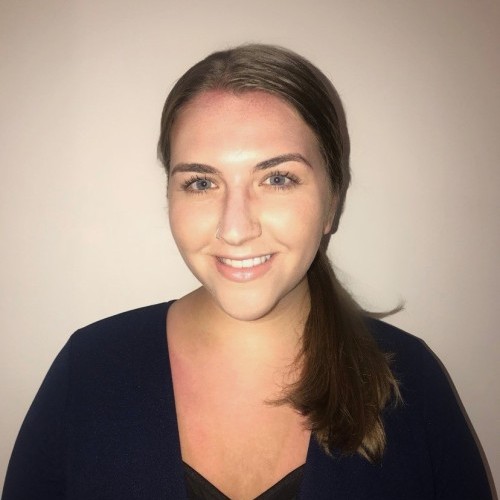
Georgina Byrne-Watts
Quality and research lead, The Life Rooms, Mersey Care NHS Foundation Trust, United KingdomGeorgi Byrne-Watts, Quality and Research Lead for The Life Rooms (Mersey Care NHS Foundation Trust) Georgi was appointed as Quality and Research Lead for The Life Rooms in 2021, to evaluate the impact of up-stream, preventative support on the health and wellbeing of individuals and communities. Leading a team in quality improvement initiatives, and research and development, Georgi’s work is integral in demonstrating the impact and benefits of The Life Rooms’ Social Model of Health and supports innovative ways of improving health and wellbeing for socially deprived communities. Prior to leading on Quality and Research at The Life Rooms, Georgi worked as an English Teacher and Lead Researcher in a secondary school and has achieved BA (Hons) in English Literature and Philosophy, MA in Management, and PGCE in Secondary English. The Life Rooms and Access Elemental’s Mid Mersey Interoperability project demonstrates the benefits of harnessing digital innovation and developments by linking clinical and non-clinical systems to connect clinicians directly to a social model of health, improving the speed, effectiveness and quality of referrals to maximise care and Service User experience. Follow Georgi on Twitter: @gjbwattsAnastasija Podkujko
Research assistant, The Life Rooms, Mersey Care NHS Foundation Trust, United KingdomAnastasija has been a Research Assistant at The Life Rooms (Mersey Care NHS Foundation Trust) since 2022. Anastasija's role is to complete evaluation projects within The Life Rooms and to emphasise the service user's voice in all the projects. Through her contributions and efforts, Anastasija ensures that the experiences and perspectives of those who access The Life Rooms services are central to developing more effective care. Prior to joining The Life Rooms, Anastasija was an Honorary Research Assistant at University of Liverpool and contributed to a research project which explored the antenatal psychological experiences of women during the COVID-19 pandemic. This work provided valuable insights into the challenges and experiences of expectant mothers during a global crisis. Over a 12-month period, Anastasija evaluated the interoperability of clinical and social prescribing systems, focusing on the referral processes and service user experiences. This comprehensive evaluation is critical for the development of The Life Rooms Social Model of Health and the provision of person-centred care.Driving efficiency through interoperability of social prescribing and clinical systems
Abstract Copy
The Life Rooms is an NHS organisation that provides communities with practical support and learning opportunities, encouraging members to be activated within their own health and wellbeing through a three-pillar approach grounded in the Social Model of Health and incorporating social prescribing, learning and community inclusion.
In an innovative move, The Life Rooms and Mersey Care became the first NHS Trust in the UK to successfully trial the integration of Elemental (social prescribing platform) and Rio (clinical mental health patient records system), generating a bespoke, safe, governed pathway through which mental health clinicians can refer their service users directly into The Life Rooms for social and practical support through its social prescribing offer, thus addressing the social and practical issues which can cause and perpetuate poor mental health.
The evaluation employed a mixed methods approach comprising qualitative and quantitative data. Activity and demographic data were also collected. Service users and referring clinicians completed surveys, which helped to understand the experience of those using the service and the connectivity between clinical and social prescribing systems. Qualitative elements of the evaluation consisted of questionnaires, case studies, interviews, and a focus group, providing an in-depth insight into the experiences of the service.
The evaluation revealed that 94% of clinicians surveyed felt confident and assured that service users would receive high-quality care when referred into The Life Rooms. Additionally, 92% of clinicians surveyed indicated that they would experience a negative impact on their clinical practice if they could no longer refer into The Life Rooms. Most service users surveyed felt that the support they received had a positive effect on their mental wellbeing (93%) and on feeling supported (96%).
The interoperability of systems enabled service users to be supported in a safe, well-governed way, allowing clinicians to focus on completing clinical tasks and interventions, while having a full line of sight on case notes and the support that the referred patients have utilised.
Learning Objectives
- Define Interoperability in the context of The Life Rooms and its role in bridging clinical and non-clinical services within a social model of health.
- Examine the role of ‘The Life Rooms’ and ‘Access, Elemental’ in combining clinical and non-clinical support services to provide a comprehensive and holistic understanding of service users health need and consider potential future direction and innovation
- Evaluate the impact and effectiveness of this interoperability of systems by reviewing activity and experiential data from both service users and clinicians, highlighting both successes and opportunities for development to improve health outcomes
12.05Panel discussion12.30 - 14.00Video+Poster Gallery, workshop, lunch and networking14.00 - 15.30Session 29- Revitalising the high street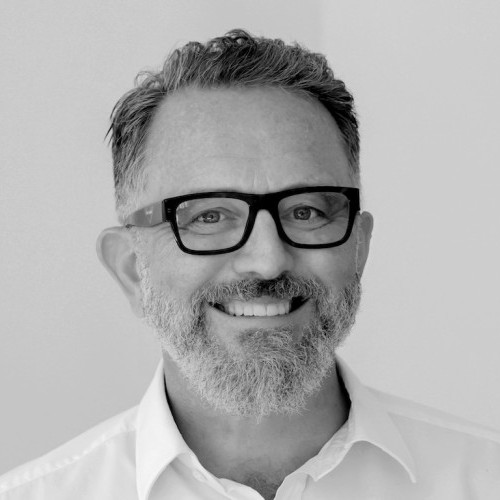
Mark Robinson
Head of regeneration, New River Group, UKMark has a 30-year career focused on town centre real estate, including roles as Chair of the Government High Street Task Force (2020-2024) and President of Revo (Formerly British Council of Shopping Centres, 2019). In 2024, Mark's business, Ellandi, was acquired by NewRiver REIT, where Mark is Head of Regeneration. NewRiver is the UK's largest investment manager of retail assets, with assets under management of £2.4m, including over 45 shopping centres. Mark is a strong advocate in the commercial real estate industry in advocating for the intersection of health and place and is experienced in delivering health-based interventions to promote regeneration. Mark is a fellow at Radix Big Tent, the Institute for Place Management, and on the advisory committee of Platform Places, which promotes partnership-powered place-making.14.00Locating health services in town centres: Applying urban design and data to maximise benefits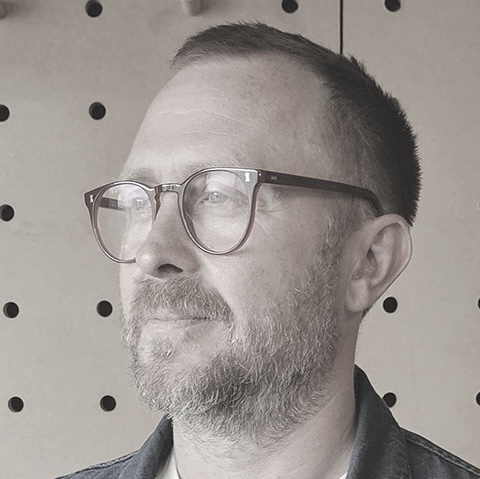
Jaime Bishop
Director, Fleet Architects; Chair, Architects for Health, UKJaime is a proven project designer, competition winner and studio leader. During his professional career he has been responsible for multiple projects with values ranging between £8 and £120 million and was one of three associate directors responsible for the management of a 65-person firm under a managing director. He is an experienced all-round designer with specialist skills in healthcare and has sat on the executive board of Architects for Health (AfH) since 2006. He has significant experience as the lead architect in major PFI schemes including the preparation of a reference project for a $2 billion teaching hospital in Adelaide, Australia. He has been a visiting tutor at various universities since 2002, including Nottingham, Cardiff and London Metropolitan. Since 2012, Jaime Bishop and Richard Henson have been teaching third-year degree level students at London South Bank University and established their studio, The Transpontine Laboratory, based at the university, in 2014. Jaime was educated at the Royal College of Art, Bath University and the TU Delft Highrise Scholarship. He has been ARB registered and a member of RIBA since 2006. He is a recognised figure in the healthcare sector with connections throughout the industry. Jaime has detailed knowledge of traditional and private finance initiative (PFI) contracts, fee negotiation and project cost control. Jaime has sat on the board of the City and Hackney NHS Clinical Commissioning Group and, social enterprise East London Integrated Care. He has also served as an elected governor at the Homerton University Hospital NHS Foundation Trust.
Fiona Scott
Co-Founder, Gort Scott Architects; London Mayors design advocate, Greater London Authority, UKI am a founding director of Gort Scott, a London-based architecture and urban design practice. Recent and current projects include leading a team to evolve a major piece of city in Old Oak Common for OPDC, a new sustainable office building in White City, retrofit for Woolwich old town hall and Woolwich Arsenal Gatehouse, and housing and urban projects across London. Gort Scott is a member of the the London Practice Forum following its Principles and Ethical Charter, and is on the GLA's Architecture + Urbanism Framework. My directorial role is in the integration of vision and processes. This includes the wider architectural, societal, cultural, environmental and policy influences in the focus and trajectory of the practice, as well as accountability. I also oversee R+D and special projects. In 2012 I was appointed to be a member of the Mayor's Design Advisory Group and since then have acted as one of the Mayor's Design Advocates, on the London Design Review Panel, and helping deliver the Mayor's strategies for Good Growth by Design.Locating health services in town centres: Applying urban design and data to maximise benefits
Abstract Copy
High streets are the inclusive and well-connected social and economic heart of our communities, often with space available for development. Healthcare services, such as outpatients and diagnostics, are often located in insular campuses situated far away from high streets and town centres and the people they serve, often poorly served by public transport. The positive multiplier effect on the benefits to the NHS, the place and the wellbeing of communities of locating healthcare on the high street is increasingly recognised – the question is why is this not happening more widely?
In June, Gort Scott and Fleet Architects convened a roundtable discussion of key stakeholders, including representatives from NHS trusts, private developers, local authorities, planners and urbanists to explore the various obstacles hindering the greater adoption of this approach. We will discuss the insights and practical solutions from this roundtable. These include the systemic and contractual barriers within the NHS that limit progress, essential enabler roles required to facilitate change, policy and planning opportunities that could be leveraged, and the relative lack of empirical research that presents a challenge to case-making and informed decision-making.
Additionally, Fiona Scott will reflect on how the NHS and healthcare can effectively integrate into high streets using Gort Scott’s extensive research into the high street ‘ecosystem’, and Jaime Bishop will reference the Fleet Architects 2021 essay, 'A Well Placed Hospital’, to make the case for locating healthcare on the high street.14.20Realising health on the high street
Michael Wood
Head of health economic partnerships, NHS Confederation, United KingdomMichael Wood is the Head of Health Economic Partnerships at the NHS Confederation. Prior to this he developed and held the role of NHS local growth adviser from 2015, for some of this time working as deputy local growth consultant for the Higher Education Funding Council for England (HEFCE). Before that, he was senior European policy manager at the NHS European Office for more than seven years. He has also worked for the Parliamentary and Health Service Ombudsman and for a Member of the European Parliament in Brussels. As Head of Health Economic Partnerships, Michael advises NHS leaders nationally and locally on policy, strategy, partnerships and funding relating to the local economy, including in areas such as skills and workforce, estates, innovation, population health and finance. Michael currently holds national advisory positions on the Civic University Network and the National Civic Impact Accelerator, as well as the Midlands Engine Health Board. He also advises NHS London on the development of its NHS Anchor Network.
Lucy Gardner
Chief Strategy and Partnerships Officer, Warrington and Halton Teaching Hospitals NHS FT, UKLucy joined the Trust in February 2016 from her role as a director at Ernst & Young’s healthcare advisory practice. She has held a number of operational management positions within the NHS and subsequently, in her role at Earnest & Young, led largescale change programmes to deliver significant financial, quality and performance benefits within healthcare. Since joining WHH, Lucy has led the development and delivery of the Trust’s strategy, as well as key strategic programmes including our new hospitals bid and securing funding to deliver a new health and wellbeing hub in Warrington town centre. Lucy started her career 17 years ago as an NHS general management trainee, gaining a master’s degree in health and social care leadership and management. She is committed to developing others and working in partnership with other organisations and individuals to not only deliver outstanding healthcare, but also to enable wider regeneration.
Stephen Bennett
Head of Strategy & Partnerships at Warrington & Halton Teaching Hospitals NHS FT, UKPlace/System transformation and change leader. Chartered Management Accountant by background with a passion for healthcare and process/system improvement in the NHS. I'm enthusiastic, energetic, innovative and never afraid to ask "why?" Currently leading multiple large scale change projects to improve outcomes and reduce health inequalities across Warrington and Halton. Exciting time to be working in health at place level and huge opportunities for us all to make a real difference TOGETHER.Realising health on the high street
Abstract Copy
The NHS Confederation's 'Health on the High Street' report, published in December 2020, envisioned integrating health and care services into local high street and town centre spaces to both enhance community engagement and generate economic, social, and health benefits. Since the publication, various health and care services have been relocated to high street premises across the UK, garnering positive responses from diverse stakeholders. However, a significant challenge remains: the typical business case processes for NHS estates planning are siloed, focusing on acute rationalisation and diverting capital funding to cover running costs, thereby lacking a national vision and coherence.
The NHS Confederation is now aiming to collaborate with a broad range of partners to understand, measure, and publish the return on investment (ROI) of 'Health on the High Street'. The specific objectives are to:
• Quantify the ROI for different health services located in various high street and town centre sites.
• Measure the broader social, economic, and health impacts in ways that resonate with NHS, local authorities, and commercial partners.
• Analyse how these impacts differ across various models and case studies.
• Examine the use of Section 106 funding and the Community Infrastructure Levy (CIL) in supporting these models.
• Investigate how 'Health on the High Street' can support the sustainability of primary and community services.
• Determine the most agile ownership models for collaborative working.
• Propose actions for national government and the NHS to embed this approach in routine business case appraisals and guidance.
To advance this proposal, the NHS Confederation plans to commission a comprehensive research study involving:
• Procuring economic expertise to quantify the analysis.
• Compiling data from a range of existing high street sites over a set period.
• Conducting interviews with leaders from health, economic, and property sectors to understand broader interests and potential, and to develop new outcome measures.
• Publishing a report and toolkit to support future 'Health on the High Street' developments.
This proposal builds on the solid foundation of the 2020 publication and the Value in Health series. By leveraging its extensive networks, membership, and the insights of partners, this initiative aims to demonstrate the significant economic, social, and health benefits of integrating health services into high street locations. This research will provide vital data and tools to support the sustainability and expansion of 'Health on the High Street', potentially transforming local strategic economic planning and enhancing community health outcomes.Learning Objectives
- Understand the mutual benefits from Health on the High Street
- Understand how to measure the impact of Health on the High Street
- Discuss how to mainstream Health on the High Street in regeneration and NHS estates planning
14.40Urban design, planning and high-street revitalisation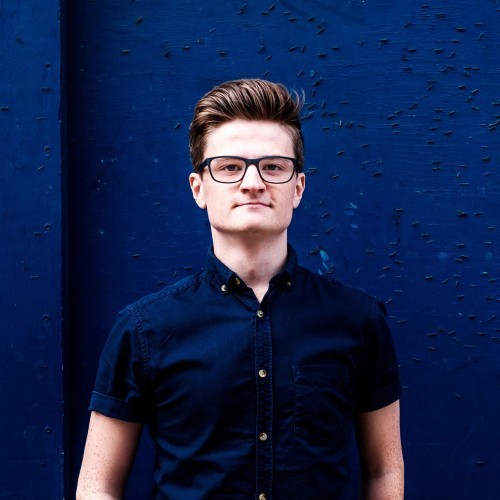
Will Clarke
Architectural designer/architect, P+HS, United KingdomWill recently completed a master's study into suburban high-street revitalisation and its policy implications. He now works in a Newcastle based practice across healthcare, residential and older living accommodation sectors.
Ayse Ozbil Torun
Associate professor, Northumbria University, United KingdomDr. Ayşe Özbil Torun received her B.Sc. (2000) and M.Arch (2002) degrees in Architecture from Yıldız Technical University and Middle East Technical University respectively. She obtained her Ph.D. (2010) degree in Architecture from Georgia Institute of Technology with dissertation titled “Walking to the Station: The Effects of Street Connectivity on Walkability and Access to Transit”. During her Ph.D. studies she taught architectural design studio for 4 consecutive years at Georgia Institute of Technology College of Architecture. She currently teaches at the Department of Architecture and Built Environment, including Architectural History & Theory, Design studio, and PhD and MSc supervision. Dr. Ozbil Torun`s research interests mainly lie in the fields of spatial modelling and urban form analysis using space syntax techniques. Her work is directed towards pedestrian-friendly neighbourhood and street design strategies enhancing active transportation in cities. Her recent studies have focused on walkability and obesity, transit-oriented planning, and design of sustainable cities. Dr. Özbil Torun has been a member of the editorial board of Urban Design International since 2012, and her work has been published nationally and internationally.Urban design, planning and high-street revitalisation
Abstract Copy
Cities are undergoing major transformations due to the pandemic, hybrid work models, and climate change. This has sparked renewed interest in reimagining high-streets, which face challenges in attracting and retaining visitors, partly because of the expansion of out-of-city retail malls (Pow, 2012; Schlesinger, 2019). This is in response to evidence demonstrating that well-designed high-streets can fulfil “human functions of territoriality, window shopping and socialisation” (Mehta and Bosson, 2009), while suburban neighbourhoods built around a central high-street have a greater sense of community (Pendola & Gen, 2008). Hence, (re)designing accessible and high-quality (e.g., pedestrian-friendly, safe, vibrant) suburban high-streets where residents can access essential destinations within 15/20 minutes (on foot or by bicycle) of their homes can support the improvement of residents physical and mental health (Weng et al., 2019). Despite the recognisable significance of the high-street as a key element for a vibrant, healthy, and sustainable neighbourhood, evidence on how to improve the accessibility and quality of the suburban high-street is lacking.
This study aims to address these gaps by identifying the specific macro and micro-level characteristics of suburban high-streets that can help revitalise these detreating streets. Accordingly, it examines three distinct high-streets in the suburbs of Newcastle upon Tyne, UK, selected for their inclusion in the Council’s Investment Plan. Objective data was collected through a combination of desk-based research (i.e., space syntax modelling, GIS-based analysis) and in-depth field surveys documenting the micro-scale street-level characteristics (i.e., ground-floor land-uses, presence of greenery/trees, the width of footpaths, etc.). The objective data was then complemented by an online questionnaire capturing users’ perceptions of each high-street in terms of perceived safety, comfort, and accessibility. The objective and subjective data were then synthesised to identify urban design enablers and barriers to suburban high-street usage and revitalisation. The findings indicate that improved accessibility of the high-street from its surrounding context (15-minute walking distance) as well as increased land-use diversity and greenery on the high-street are key design interventions required to elevate users’ perceptions and thus their use of these public spaces.
Aside from theoretical contributions, the findings of this study hold significant implications for urban design/planning practice and policy. Documenting the existing conditions of our suburban high-streets and identifying the design characteristics that encourage or hinder residents’ access and use of them could assist practitioners and policymakers in developing targeted interventions to promote inclusive, vibrant, and healthy local high-streets.Learning Objectives
- To provide evidence and guidance to policymakers regarding improving the walkability and human-friendly characteristics of suburban high streets.
- To understand a correlation between the emotional perceptions of the high street environment and the macro- and micro-scale factors.
- To uncover what is, and is not, desirable within the high street environment and what frequent users believe should be done to improve it.
15.00Panel discussion15.30 - 16.00Video+Poster Gallery, coffee and networking16.00 - 17.00Session 30- Transforming health services and infrastructure in the community
Jaime Bishop
Director, Fleet Architects; Chair, Architects for Health, UKJaime is a proven project designer, competition winner and studio leader. During his professional career he has been responsible for multiple projects with values ranging between £8 and £120 million and was one of three associate directors responsible for the management of a 65-person firm under a managing director. He is an experienced all-round designer with specialist skills in healthcare and has sat on the executive board of Architects for Health (AfH) since 2006. He has significant experience as the lead architect in major PFI schemes including the preparation of a reference project for a $2 billion teaching hospital in Adelaide, Australia. He has been a visiting tutor at various universities since 2002, including Nottingham, Cardiff and London Metropolitan. Since 2012, Jaime Bishop and Richard Henson have been teaching third-year degree level students at London South Bank University and established their studio, The Transpontine Laboratory, based at the university, in 2014. Jaime was educated at the Royal College of Art, Bath University and the TU Delft Highrise Scholarship. He has been ARB registered and a member of RIBA since 2006. He is a recognised figure in the healthcare sector with connections throughout the industry. Jaime has detailed knowledge of traditional and private finance initiative (PFI) contracts, fee negotiation and project cost control. Jaime has sat on the board of the City and Hackney NHS Clinical Commissioning Group and, social enterprise East London Integrated Care. He has also served as an elected governor at the Homerton University Hospital NHS Foundation Trust.16.00Healthcare practitioners’ approaches to social determinants of population health linked to home energy
Natalie Bamford
Research associate, University of Strathclyde, United KingdomNatalie Bamford is a research associate on the AHRC funded Design HOPES project at the University of Strathclyde. Her current research explores issues of communicating complicated information in relation to the home and health. Natalie's background is in the development and utilisation of creative or arts based methods, particularly working with concepts that traditionally defy representation.Healthcare practitioners’ approaches to social determinants of population health linked to home energy
Abstract Copy
Social determinants of population health (SDoH) linked to energy use in the home are poorly considered in diagnosing and managing a range of chronic conditions particularly those that impact the respiratory and cardiovascular system. Over half of the European population lives in fuel poverty, with many health conditions exacerbated by this. The purpose of this paper is to review published evidence on ways healthcare professionals consider SDoH linked to energy use in the home. The review discusses insights from review and consequences these have on ways home design, use of home, and healthcare design are impacting on population health outcomes.
This paper utilises a semi-systematic literature review to identify existing approaches to considering the home environment within the diagnostic process. This approach was employed to explore a wide range of areas related to the central narrative of the home in healthcare. As healthcare professional perception of patient home environment is an understudied area, this approach allowed for material outside the research area to be reviewed and overall insights synthesised.
The review found 36 papers that related directly to the home as a SDoH or considered clinician perception of the home in health, however, little material considered energy use. These papers highlighted awareness among healthcare professionals of the impact the home can have on health but also raised barriers to both collecting and acting on this kind of information. Themes were also observed during searches that indicated the home is primarily considered in terms of a location for diagnosis and treatment, rather than a factor that affects these processes. How the home is designed as an environment and how healthcare approaches are designed to respond to this is an important area of research.
Insights gained from the review suggest there will be value in initiating research into further understanding approaches to considering SDoH linked to energy behaviours in the home. Energy behaviours in the home have a relationship with patient health, yet they are poorly considered in diagnosing and managing chronic health conditions. Research needs to be conducted to understand how the home is perceived by healthcare professionals and to develop tools to facilitate consideration of the patient home. This review forms the groundwork for developing diagnostic and public health management guidance/tools that would facilitate the acquiring of experiences from patients regarding the design and use of their home and energy behaviours within them.Learning Objectives
- Home
- Health
- Perception
16.20A campaign to rewild the NHS estate
Alice Green
Associate principal, healthcare, Arcadis, United KingdomAlice Green is an Architect and Interior Designer and has specialised in health for over 15 years. Alice incorporates a holistic approach to design with a focus on service user wellbeing and finding innovative ways to create cohesive healthcare environments. Alice also sits on the board of Directors of Architects for Health, a non-profit organisation that advocates for best practice in healthcare design.
Vanessa Champion
Director, Journal of Biophilic Design, United KingdomOriginally an academic at UCL, Vanessa later edited a London newspaper and founded a media company and consultancy with clients like the BBC and NHS. Inspired by witnessing the biophilic healing effect of nature views in hospitals, she founded The Journal of Biophilic Design to explore biophilia's impact on wellbeing. A professional photographer and filmmaker, she creates “Virtual Nature Walls” for various settings and founded the philanthropic PhotoAid Global Foundation and co-founded The Space Doctors to promote science-based environmental improvements.A campaign to rewild the NHS estate
Abstract Copy
In addition to the climate crisis, the NHS is facing unprecedented pressures, including:
• The workforce crisis, a global shortage of human resources for staffing;
• The ageing population with increasingly complex health needs;
• Health inequality;
• The growing mental health crisis with NHS reporting anxiety and stress as the leading cause for staff absence; and
• The dilapidating NHS estate creating uninspiring working environments.
Within this context the NHS has also pledged to achieve net-zero carbon by 2050 and, as of February 2024, all future developments will need to achieve 10% biodiversity net gain.
On NHS estate land in England, there is 500 ha of surface level car parking, the equivalent of 715 Premier League football pitches. There is also 730ha of unused (yet maintained) grounds with an annual maintenance cost of £29.4m. Added together there is scope to ‘rewild’ some 4.75 square miles of NHS estate, four times the area of the City of London. This is before considering what can be done to building roofs and facades, also to be explored. By rewilding the NHS land alone, there are huge opportunities for biodiversity net gain, carbon offsetting, bridging gaps in the community, bringing generations together, fighting health inequality, improving staff wellbeing, and speeding up recovery for patients.
Our consortium will present three personas to tell the story of the effects rewilding will have on their journey within the NHS estate; to work, as a visitor and as a patient. We will be exploring the opportunities, considering: nursery playgrounds; allotments; gyms; park meadows; the senses; proxemics; neurodiversity; and more. Deep dives into evidence-based examples to support the campaign, such as the concept of '3, 30 and 300', an evidence-based rule proposed by Cecil Konijnendijk; the benefits of moss in air purification; biophilia; proxemics; and where other cultures around the globe are embracing nature into healthcare settings.
The session will cover potential revenue savings from the impact on investing smartly, ways to bring nature back into external and internal fabric of the NHS Estate, while also creating homes for wildlife. We will unpick the challenges in achieving this and provide alternative solutions while embedding the need for a cultural change in the way estates are managed and maintained. A summary will highlight how we can support clients in their net-zero carbon vision through building a business case to rewild their estate while improving revenue and creating a better society.
Learning Objectives
- To recognise the challenges both the NHS and society is facing with regards to Health and Wellbeing whilst simultaneously aiming for net zero carbon.
- 2. To recognise what opportunities there are for investing in greening up the NHS Estate and biophilic design in achieving net zero carbon, from an embodied carbon and operational carbon perspective.
- To recognise what benefits rewilding the NHS Estate can bring to humans and wildlife. from an social, economic and environmental perspective.
16.40Panel discussionEnd of Population health stream -
Workshops
Space 4 & 5
10.45 - 12.30Session 31- Nothing about us without us: How can we best engage communities in designing healthier urban places?10.45Nothing about us without us: How can we best engage communities in designing healthier urban places?Rosie McEachan
Born in Bradford director, Bradford Institute of Health Research, United KingdomRosie McEachan is the Director of Born in Bradford and a proud (Scottish) Bradfordian. She is an experienced applied health researcher with particular interests in cohort studies, development and evaluation of complex interventions, environmental determinants of health, green space, air quality, and co-production. Rosie holds a visiting professor position at University College London and an honorary chair position at the University of Bradford.
Chris Cartwright
Research programme director: Healthy Urban Places, Bradford Teaching Hospitals NHS Foundation Trust, United KingdomChris has a background in public health and is a Research Programme Director for UKRI population health improvement Healthy Urban Places consortium, and the Healthy Families theme of the NIHR Applied Research Collaboration Yorkshire and Humber. Chris is interested in closing the gap between research and practice with specific research interests including social and environmental influences on health, and the participation of the public and professionals in research. Prior to becoming involved public health and research Chris was an emergency planner for local authorities and the NHS.
Shahid Islam
Principal research fellow: Co-production and engagement, Bradford Teaching Hospitals NHS Foundation Trust, UKShahid is Senior Research Fellow in the ActEarly Collaboratory, Born in Bradford and lead for the Co-Production and Peer Research network (CoPPeR) with a special interest in citizen science and co-production. Previously he has held several posts in both the voluntary and statutory sector to drive forward the engagement and involvement agenda. In 2015 Shahid was the winner of Bradford’s Community Star Award for outstanding services to the voluntary sector and in 2021 he won the Chief Scientific Officer's Excellence in Healthcare Science Research and Innovation Award. He has led on the ‘co-production’ of the ‘co-production strategy’ which has been implemented across the health sector and he describes his role as community activism through applied research.
Nazish Mahmood
Research fellow: Co-Production and Peer Research Network, Bradford Teaching Hospitals NHS Foundation Trust, United KingdomNazish is a research fellow based within the Co-Production and Peer Research network (CoPPeR) at Born in Bradford. Her role involves supporting community organisations as equal partners in the research process, including the training of local peer researchers. Prior to this role she worked with various projects focused on improving the health and well-being of people living with mental health and long-term illnesses. She holds a BA (Hons) in Politics and Sociology from the University of Leeds.
Amanda Seims
Senior research fellow, Bradford Teaching Hospitals NHS Foundation Trust, United KingdomAmanda is a Senior Research Fellow at Born in Bradford, working within the Join Us: Move, Play (JU:MP) Sport England funded local delivery pilot focused on increasing children’s physical activity in Bradford through a whole-systems approach. Her JU:MP role includes qualitative research to understand influences on adolescent girls’ usage of parks in Bradford and the feasibility and acceptability of using a co-designed approach to developing green spaces. She is also delivering the Play in Urban Spaces for Health (PUSH) project to understand barriers and facilitators to designing play into urban spaces in Bradford and to implementing a school-led intervention to support children’s outdoor play. She has a background in quantitative and qualitative research, ranging across sports physiology, men’s health and health service evaluation, and has research interests in physical activity, active travel and greenspace.
Cathy Knamiller
Senior research fellow: Participatory Research, Healthy Urban Places, Bradford Teaching Hospitals NHS Foundation Trust, United KingdomCathy is a senior Research Fellow at Born in Bradford leading on participatory research in the Healthy Urban Places consortium. She has a very diverse work background which includes working as a community worker in Bradford for many years, being a volunteer coordinator and an English language teacher in various parts of the world. Her educational background includes a MSc in Sustainable Development and a PhD with the theoretical focus on environmental behaviour change.Nothing about us without us: How can we best engage communities in designing healthier urban places?
Abstract Copy
Communities should be at the heart of decision-making to create healthier urban environments – but how best can we include their voices? Traditional consultation methods can result in those ‘voices which shout the loudest’ disproportionately influencing decisions about local neighbourhoods. This workshop, co-hosted by the UKRI funded Healthy Urban Places and ActEarly consortia, will present methods for, and practical examples of, engaging with communities to co-produce evidence-based place-based interventions. We will then facilitate a discussion with delegates about barriers and enablers to effective community engagement and key priorities for future research and practice.
The session will involve a series of linked discussions and case studies from our work in Bradford, UK:
Discussion 1: Spatial injustice, health inequalities and ignored voices
Here, we will set the scene around health and spatial inequalities in Bradford. Using data collected from the longitudinal Born in Bradford birth cohorts (>13,500 families), we will explore how multiple environmental burdens are experienced unequally in the city, and their health impacts. We will highlight how some community voices are seldom heard in decision-making.
Discussion 2: Nothing about us, without us: Opportunities and challenges co-producing change with communities
Co-production with communities is increasingly seen as best practice that can improve the quality and relevance of infrastructure changes. We will discuss the development of a co-production strategy to guide the work of the multidisciplinary groups aiming to implement evidence-based improvements, and explore the challenges and opportunities that have arisen from implementing it.
Case study one: Community-led peer research and citizen science
We have established a Co-Production and Peer Research network (CoPPeR), which supports local communities to drive research agendas and collect evidence to inform decision making in their local areas. Working with four seldom heard community groups, we will showcase methods and emerging findings about what features of the environment communities prioritise for health.
Case study two: Making space for girls – co-producing green space improvements
Greenspaces may not meet the needs of adolescent girls, evidenced through their low presence and use of greenspaces for physical activity compared with their male peers. In this case study, we will share lessons learned and outcomes from working with adolescent girls, urban planners and professionals to co-design and implement green space improvements in deprived urban areas.
Discussion: To explore barriers and enablers to engaging communities in the design of healthy urban spaces, and identify areas for further support.
Learning Objectives
- To understand how poor environments can lead to spatial and health inequalities for vulnerable groups
- To learn different methods of co-designing healthy and sustainable cities with diverse communities
- To understand benefits, barriers and enablers to co-designing changes with communities.
12.30 - 14.00Video+Poster Gallery, workshops, lunch and networking14.00 - 15.30Session 32- Understanding and strengthening Black and minoritised community-led climate and health action in Lambeth14.00Understanding and strengthening Black and minoritised community-led climate and health action in Lambeth
Olamide Raheem
Portfolio manager, Guy's and St Thomas' Foundation, United KingdomOlamide is a Portfolio Manager working in our Health effects of air pollution programme and Innovation function. She currently co-leads our work on Community wealth building, social investment for early stage diver-led suppliers and capacity-building for global majority-led businesses. She is also co-chair of the Foundation’s Climate Working Group.
Nureen Glaves
Founder and CEO, Feed Me Good, UKFounder and CEO of Feed Me Good. Nureen is a chef and Public Health Nutritionist, she founded the charity specialising in developing and delivering bespoke health and wellbeing Continuing Professional Development (CPD) accredited programmes for communities. The programmes promotes sustainability in the form of discouraging food waste, encouraging food budgeting and incorporating learning from nutrition studies to encourage a healthy diet. As a grant recipient, Feed Me Good expanded the reach of people engaging with these sessions through the development of a train-the-trainer model. Through building resources and content for social media, followers will be able to learn from people within their own communities that they identify with
Obie Pearl
Black Farmers’ Market, UKWith more than 15 years of freelancing experience in social enterprise - systemic innovation, community grassroots activism, environmentalism, and graphic/service design, I have had the opportunity to be an entrepreneur and co-found a successful for-profit fitness business with a community mission. I love connecting with my roots and culture, savouring nourishing food and gardening, enjoying music, alternative fitness - training, performing, and teaching (hula hooping, roller skating), and exploring my creativity. My entire career and lifestyle revolve around building community and empowering others. I am a passionate advocate for individuals with chronic illnesses, including #achalasia disease and other autoimmune conditions. I am proud to be an #movegb Ambassador, spreading the message of #moveforlife and promoting a positive mindset. I find joy in practicing mindfulness and learning from the wisdom of the Universe and our ancestors.
Douglas Salcedo Anez
Co-founder, Nature Vibezzz, UKDouglas Salcedo Anez is co-founder of Nature Vibezzz, a charity that organises forest school sessions as well as environmental and practical nature conservation sessions across London for young people and their families. Nature Vibezzz used to increase internal capacity. Activities run through the forest school are popular and there is a need to be able to scale the level of delivery into other areas such as Burgess Park, Galleywall Nature Reserve, Streatham Common, and Knights Hill Wood. They scaled their internal capacity Activities run through the forest school are popular and there is a need to be able to scale the level of delivery into other areas such as Burgess Park, Galleywall Nature Reserve, Streatham Common, and Knights Hill Wood.
Natalie Lartey
Founder and principle consultant, Wood & Water, UKWood & Water is a not-profit narrative change consultancy, based in Southwark that focuses on environmental and international issues that are driven by colonial, extractive, and oppressive systems supported by narratives. The group prides itself on delivering pioneering engagement work to different community groups, charities, corporate groups and youth centres using the transformative power of narrative change to build unity and increase equity. As grant recipient, they worked at further developing a pilot programme that was delivered to a group of 15 young people at the Salmon Youth Centre in Southwark. The programme is designed to deliver educational, and narrative change workshops to 50 Black and Brown young people from ages 15 to 25.Understanding and strengthening Black and minoritised community-led climate and health action in Lambeth
Abstract Copy
Climate change and urban health are inextricably linked, and in the UK and around the world, Black and other minoritised communities are bearing some of the worst impacts already. Yet these communities are underrepresented in climate dialogue and action. This is a lost opportunity for communities to protect their health, and for contributing community energy and expertise to efforts to tackle climate change.
We propose a workshop to discuss ways of celebrating and nurturing community-led action by Black and other minoritised communities on climate and health in the UK, as well as other places globally. The workshop will build on the work of 17 Black and brown-led organisations connected to climate and health in Lambeth and Southwark brought together by the Climate, Health and Communities Fund.
Led by Do It Now Now in collaboration with Impact on Urban Health, CHC Fund was a project that sought to better understand how Black and brown communities in London are experiencing and acting in response to climate change. Impact on Urban Health will share these lessons with Lambeth and Southwark local governments and other funders to influence how they engage with marginalised groups on climate.
Findings: Although the mainstream climate movement in the UK lacks resonance with Black and other racially minoritised communities, these communities are already acting on climate change, but in different ways than what others might be used to seeing. Elements of strong community-led action include: bringing communities together to build resilience, connecting the systemic drivers of climate change with daily impacts, and highlighting the impact of climate change on frontline countries where Black and brown communities may have ancestral connections.
Our workshop may include:
• Short presentations by 2-3 organisations such as Black Farmer’s Market, which supports Black farmers and allotment holders and Black-run community growing projects; Nature Vibezzz, which organises forest school and conservation sessions for young people and their families; Feed Me Good, a disabled-led charity that delivers food-related professional development training to communities; or Wood & Water, which engages groups using anti-racist and post-colonial storytelling.
• A facilitated discussion on applying lessons learned to engaging other communities on health and climate, and how to better support community-based organisations to do this work; and/or
• Small group discussions where participants work together to articulate the health and climate co-benefits of different examples of community-led action from their own contexts.Learning Objectives
- Participants will be able to describe tangible ways in which communities, including Black and other minoritised communities, are already acting on climate change
- Participants will be able to describe some of the barriers faced by Black and other minoritised communities to engage on climate change and strategies and tactics to overcome them
- Participants will start applying some of the lessons learned to examples from their own contexts, e.g., articulating the health and climate co-benefits of local community-led actions
15.30 - 16.00Video+Poster Gallery, coffee and networkingEnd of Workshops stream
Healthy City Design International Awards
Space 1 & 2
17.00 - 17.45Session 21- Awards ceremony
Prof Jeremy Myerson
Co-founder, Healthy City Design; director, WORKTECH Academy; professor emeritus, Royal College of Art, UKJeremy Myerson has been academic, author and activist in design for more than 40 years. He co-founded the Helen Hamlyn Centre for Design in 1999, and was its director until 2015. Last year, he received emeritus professor status at the RCA, and he continues to direct his own venture, the WORKTECH Academy, which provides a forum for academics and practitioners to share new ideas on the future of work and workplace. He is the author of more than 20 books on a wide range of subjects in art, design and architecture, and he has curated many national design exhibitions. He has been at the helm of the Healthy City Design Programme Committee since the Congress’ inception in 2017.17.00Healthy City Design International Awards 202417.30Healthy City Design 2025 Congress destination announcement and presentation17.40-17.45Closing remarks

